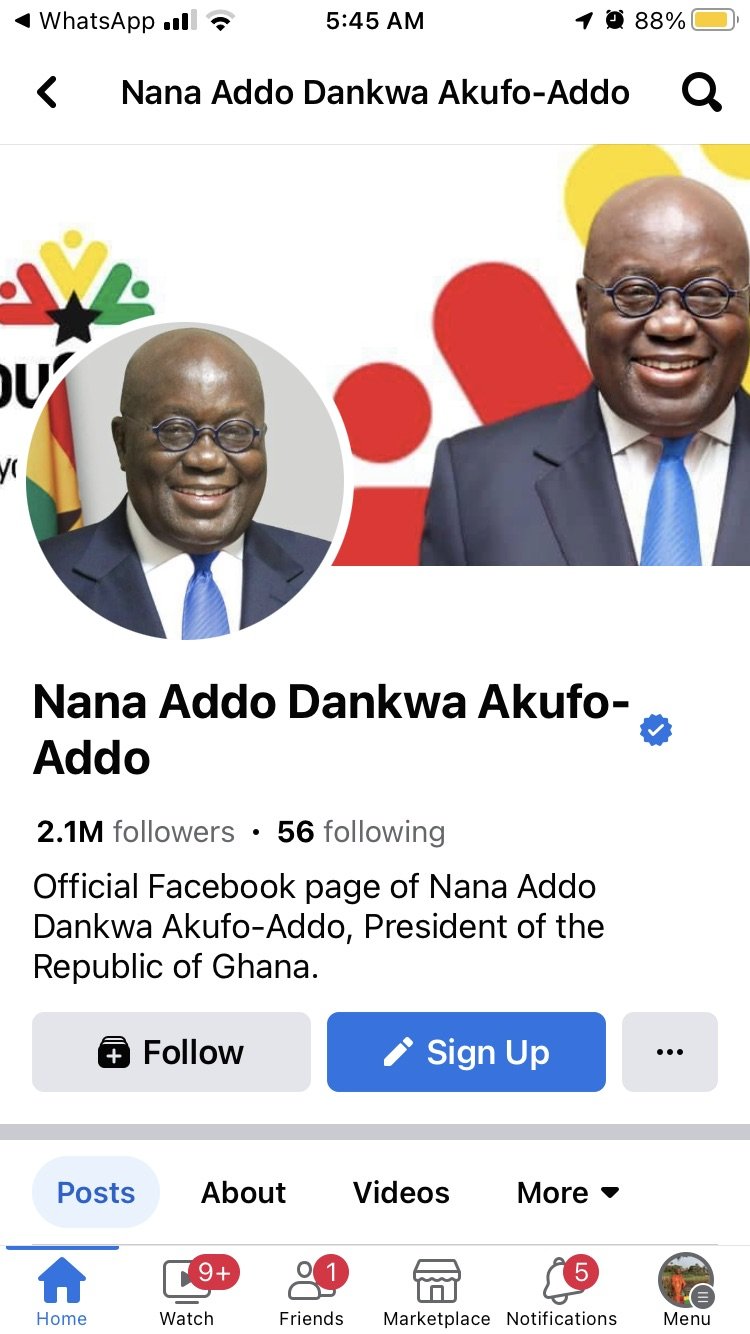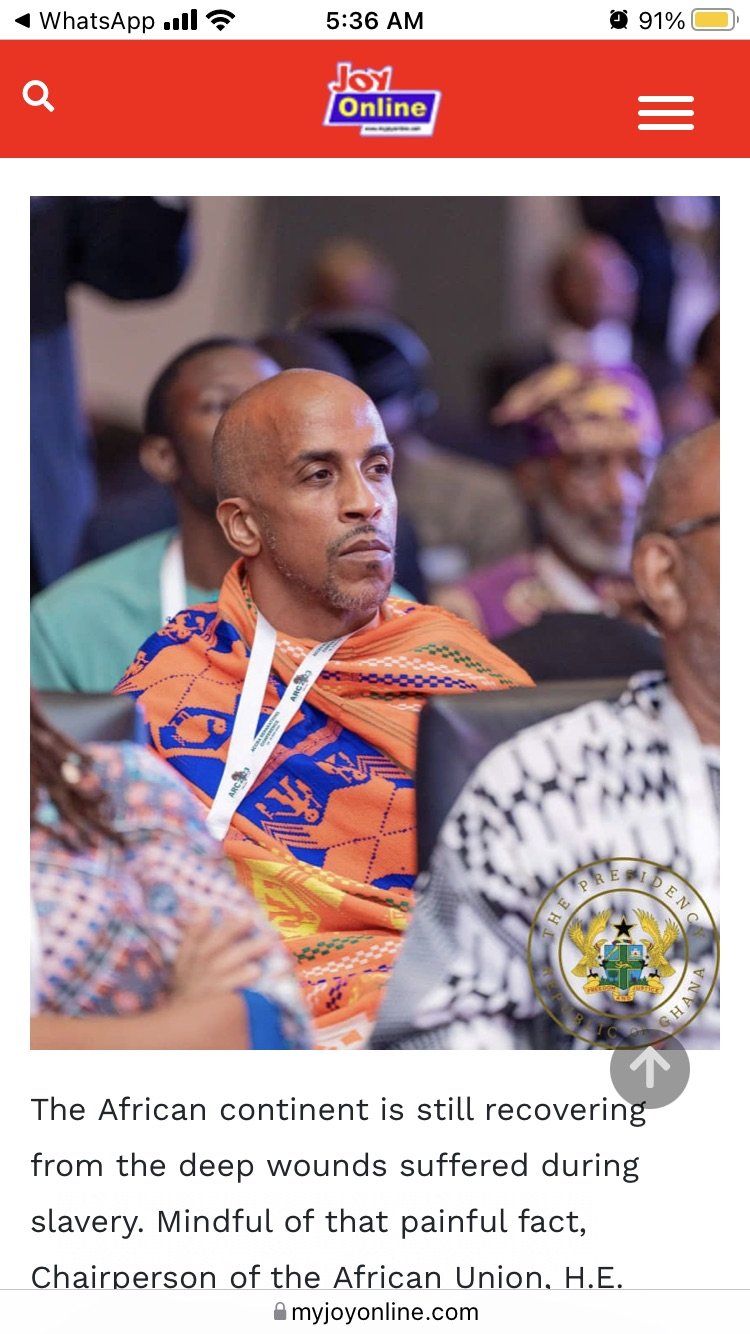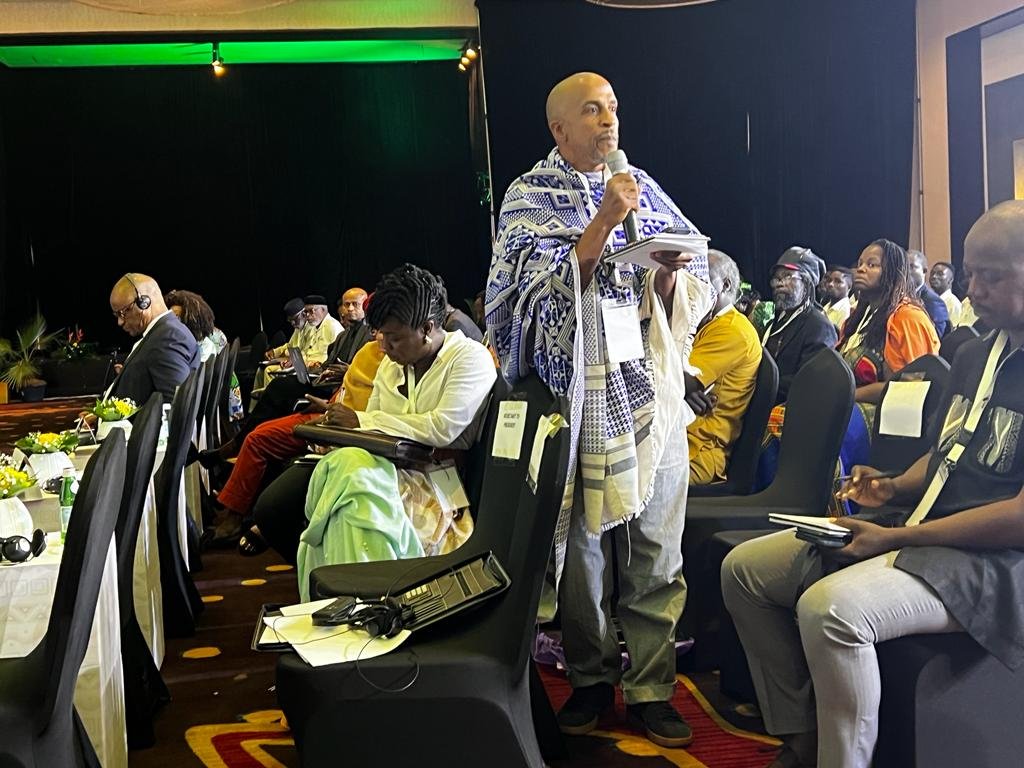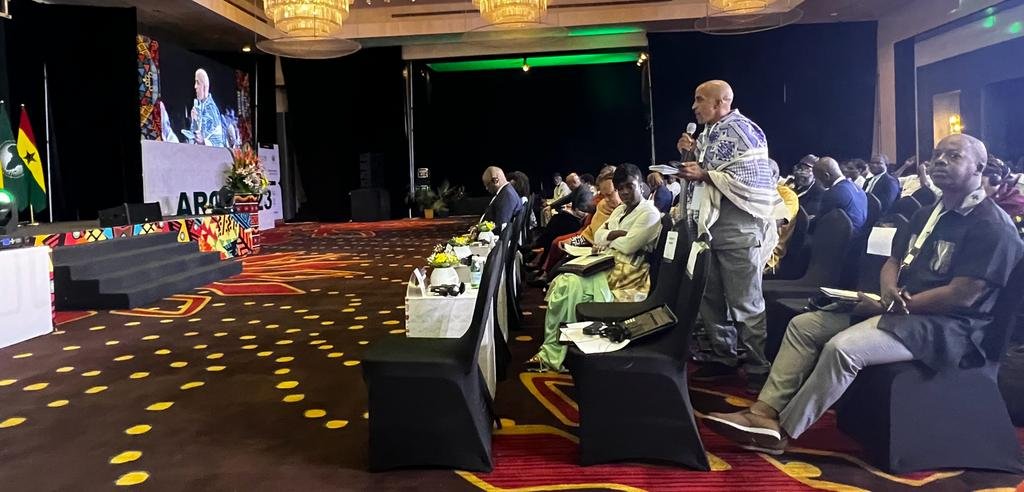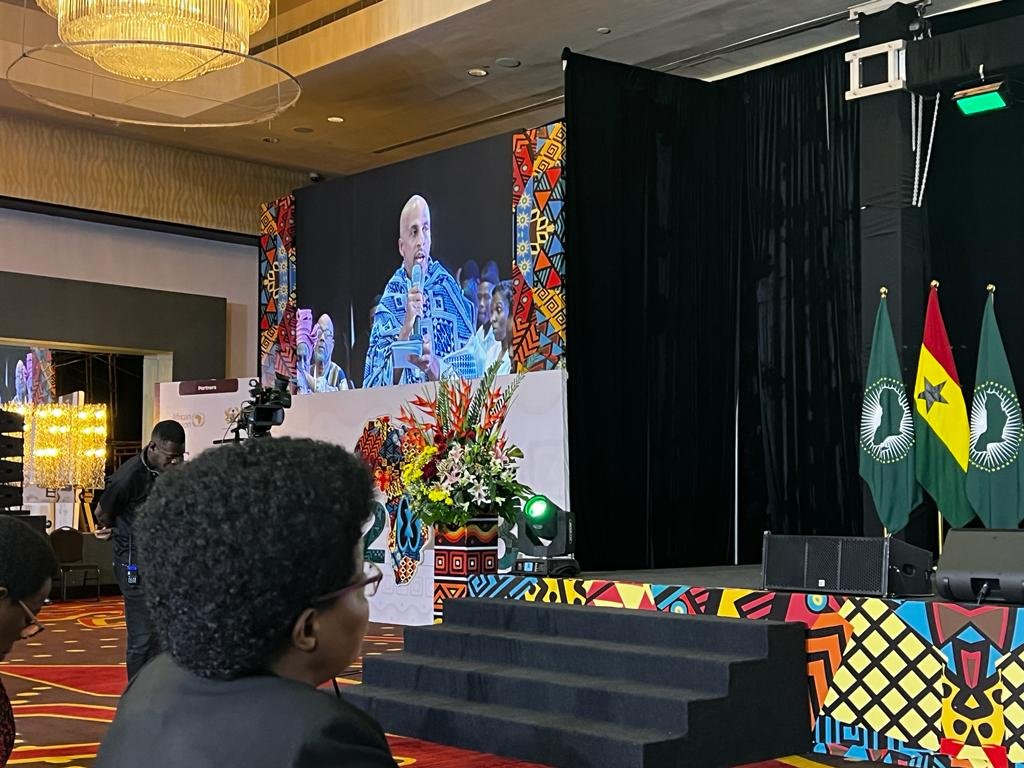Balanta B’urassa History and Genealogy Society in America President Siphiwe Baleka addressing the Accra Reparations Conference.
As a service to my people and for the sake of full disclosure, let me start this story from the beginning. I am taking the long journey so that everyone can understand the various nuances that took place during the Accra Reparations Conference. My participation involves a substantial backstory. . . .
Dr. Beryl Biekman invited me to commemorate the 20 Year Anniversary of the Article 3q Amendment that officially “invite(s) and encourage(s) the full participation of Africans in the Diaspora in the building of the African Union in its capacity as an important part of our Continent.” I was the only “African American” present when the article was passed at the African Union in February 2003 and finalized on July 11, 2003 in Maputo. Dr. Biekman wanted to make July 11 “Africa Diaspora Day” at the African Union. I was fortunate enough to be on the panel with Dr. Eric Phillips, Chairman, Guyana Reparations Committee and one of the CARICOM Reparations Commission (CRC) three Vice-Chairs, entitled, VISION STATEMENTS ON THE GLOBAL CASE FOR REPARATORY JUSTICE: LEGAL STRUCTURES, MECHANISMS, INSTRUMENTS & MODALITIES. Unfortunately, Mr. Dorbrene O’Marde, Chairman for the Antigua and Barbuda Reparation Support Commission and another Vice-Chair of the CRC led by Sir Hilary Beckles, was unable to join the panel. After the panel, I made the following recommendations:




It was during this time that I learned about the upcommoning CONTINTENTAL STUDY TOUR ON REPARATIONS AND HEALING TO THE CARIBBEAN to be hosted by the REPUBLIC OF BARBADOS, 24th – 29th JULY 2023. According to the event’s Concept Note,
“The high-level study tour will bring together Ambassadors and representatives from selected Member States of the African Union, Pan-African academics, advocates, practitioners and campaigners in Africa, who have worked on or are working on issues related to reparations, healing and Pan-Africanism. The aim of the study tour is to bring together voices and perspectives of the African political and civil society leadership to draw lessons and learnings from their Caribbean counterparts on how to develop a unified front on reparations for historical crimes. . . . This study tour will offer an opportunity for political leaders and actors in the African continent to share and learn about the “hows” of advancing a collective agenda in the political and civil society spaces. . . .A group of distinguished experts in the field of reparations and healing from Africa and the Caribbean will come together to facilitate a series of actionable dialogues on key themes related to the reparations movement.”










Seeing a great opportunity for Pan African collaboration in the spirit of Ubuntu, and knowing my expertise on the issues of Afro Descendants’ Right to Return, Citizenship, and the business of internal reparations and healing the transgenerational epigenetic effects of chattel enslavement and ethnocide, I felt it my duty to attend the Study Tour. Towards that end, I sent the following letter to Dr. Justice Alfred Mavedzenge, PhD Constitutional law (UCT) | LLM Constitutional & Admin law (UCT) |LLB (UNISA) |BA (MSU) Senior Legal Advisor/Programs Director for Africa Judges and Jurists Forum (AJJF):





Justice Alfred Mavedzenge replied,
“We have to follow protocol my brother. This is an AU Study tour and i cannot make those decisions without the organisers. Unfortunately the organisers from the AU are on flights at the moment and i cannot reach them. . . . Its going to be difficult to do the logistics to bring you to Barbados because all of the organisers are now travelling and they are no longer available to process those logistics. Lets keep in touch and make sure you participate in the next activities brother.”
On August 9, I messaged Justice Alfred Mavedzenge and we had the following exchange: ,
Me: Nsumna. Greetings Justice Alfred. As per your instruction, “Lets keep in touch and make sure you participate in the next activities" can you forward to me the information on how I can participate in the next event in Accra in October? Thank you in advance. 🙏🏾 Additionally, I'm still trying to get information on any of the discussion in Barbados concerning an Advisory Opinion from the ICJ. I'm about to publish another article on this.
Justice Alfred Mavedzenge: Greetings Nsumna. Sorry i missed your call. Its almost midnight here. We are not involved in the Accra event my brother. About the study tour, we do not have the report yet. It is being drafted and it should be ready by first week of September. I do not have any information about the Advisory opinion. I am also not sure if there is any Opinion. What i heard people discussing in Barbados is the possibility of applying for one.
Me: Nsumna. Greetings again. Ok, Thank you. No, there is no Advisory Opinion, but a Request is being made through the Permanent Forum on People of African Descent (PFPAD). Epsy Campbell Bar has responded to me, author of the Request and the exact questions to be answered, directly. You can see her letter of response by clicking the link. My concern is that if the Barbados group initiates a separate request for an Adivsory Opinion, it may have negative consequences, especially if the right questions are not asked. The ICJ may not appreciate multiple requests on essentially the same subject with different questions. Anyway, this is why I am trying to connect with people from the Barbados event. Please forward to me the contact for the next Study Tour event, which I was told was to be held in Accra, in October. From who can I get information?
Justice Alfred Mavedzenge: Indeed, the problem is exactly what you mentioned of multiple resquests and lack of channels to share information across the board. I am not sure who exactly is organising the Accra event but i know that its being organised by the Ghana govt. If you have a contact in Ghana they will let you know. Otherwise if i find the contact i will also share with you.
Me: This is the event in Ghana? But it’s not connected to the Study Tour? I’m a little confused…. https://www.graphic.com.gh/news/general-news/slave-trade-reparations-au-approves-ghana-conference.html
Justice Alfred Mavedzenge: the Study tour and the Accra event are two different things organised by two different groups Chief. Thats why i have no knowledge of the Accra event bro. The Accra event is being done by the Govt of Ghana while th Barbados study tour was organised by civil society but for AU Ambassadors
Me: My apologies for the nuisance. 😂Yes. This is my source of confusion. So what is the next Study Tour event? This is what I am trying to find out. 🙏🏾
Justice Alfred Mavedzenge: No worries brother. The reparations movement is fragmented and that is the problem
Meanwhile, on August 11, I had the following exchange with Hilary Brown, Programme Manager Culture & Community Development · CARICOM Secretariat:
Me: Greetings Dr. Hilary Brown. I am Siphiwe Baleka and Dr. Baryl Biekman suggested I contact you to talk about a very serious Global Afrikan Reparatory Justice strategy - requesting an Advisory Opinion from the ICJ. I came up with the strategy to use the mandate for the Permanent Forum on People of African Descent to pursue this. Here is the orignal mandate, signed by 248 African and African Diasporans, that was sent to Ms. Epsy Campbell Barr. I was not invited to the Study Tour in Barbados, but I attempted to come anyway, following the recommendations to the PAN AFRICAN ROOTS-SYNERGY MAPUTO ROUNDTABLE (PARSMR) panel 𝑽𝑰𝑺𝑰𝑶𝑵 𝑺𝑻𝑨𝑻𝑬𝑴𝑬𝑵𝑻𝑺 𝑶𝑵 𝑻𝑯𝑬 𝑮𝑳𝑶𝑩𝑨𝑳 𝑪𝑨𝑺𝑬 𝑭𝑶𝑹 𝑹𝑬𝑷𝑨𝑹𝑨𝑻𝑶𝑹𝒀 𝑱𝑼𝑺𝑻𝑰𝑪𝑬: 𝑳𝑬𝑮𝑨𝑳 𝑺𝑻𝑹𝑼𝑪𝑻𝑼𝑹𝑬𝑺, 𝑴𝑬𝑪𝑯𝑨𝑵𝑰𝑺𝑴𝑺, 𝑰𝑵𝑺𝑻𝑹𝑼𝑴𝑬𝑵𝑻𝑺 & 𝑴𝑶𝑫𝑨𝑳𝑰𝑻𝑰𝑬𝑺. I did submit these recommendations to present to the Study Tour to Justice Alfred Mavedzenge, Eric Phillips and David Commissiong. Dr. Biekman indicated that you would be willing to listen to a discussion of the PFPAD Request for an ICJ Advisory Opinion. My concern is that if the Barbados group initiates a separate request for an Adivsory Opinion, it may have negative consequences, especially if the right questions are not asked. The ICJ may not appreciate multiple requests on essentially the same subject with different questions. 𝐏𝐥𝐞𝐚𝐬𝐞 𝐜𝐚𝐥𝐥 𝐦𝐞 𝐚𝐭 𝐲𝐨𝐮𝐫 𝐞𝐚𝐫𝐥𝐢𝐞𝐬𝐭 𝐜𝐨𝐧𝐯𝐞𝐧𝐢𝐞𝐧𝐜𝐞. 𝐈'𝐝 𝐥𝐢𝐤𝐞 𝐭𝐨 𝐜𝐨𝐥𝐥𝐚𝐛𝐨𝐫𝐚𝐭𝐞 𝐰𝐢𝐭𝐡 𝐂𝐀𝐑𝐈𝐂𝐎𝐌 𝐨𝐧 𝐭𝐡𝐢𝐬.
Hilary Brown: Greetings Siphiwe. Thank you for making contact and sending all this material. After I’ve finished reviewing, I will send my feedback. Thanks for your patience.
Unfortunately, I did not hear back from Ms. Brown. However, by September 17, Dr. Biekman, Dr. Eric Phillips and I began working on the draft for the Dutch Apology in Legislation. Here is the draft that I submitted which became the base for the final draft:


















It was during this period that Dr. Eric Phillips became familiar with my work on the Dum Diversas declaration of total war and the prisoner-of-war suffering chattel enslavement and ethnocide legal strategy that I was advancing at the Inter American Commssion on Human Rights (IACHR). the Permanent Forum on People of African Descent, and, most recently, at the fifth periodic review of the United States under the International Covenenat on Civil and Political Rights (ICCPR).










At first, Dr. Phillips felt my work was brilliant and supported it. When I shared my concerns after reading the article explaining that 𝐂𝐚𝐫𝐢𝐛𝐛𝐞𝐚𝐧 𝐜𝐨𝐮𝐧𝐭𝐫𝐢𝐞𝐬 𝐚𝐫𝐞 𝐜𝐨𝐧𝐬𝐢𝐝𝐞𝐫𝐢𝐧𝐠 𝐚𝐩𝐩𝐫𝐨𝐚𝐜𝐡𝐢𝐧𝐠 𝐭𝐡𝐞 𝐔𝐍’𝐬 𝐢𝐧𝐭𝐞𝐫𝐧𝐚𝐭𝐢𝐨𝐧𝐚𝐥 𝐜𝐨𝐮𝐫𝐭 𝐨𝐟 𝐣𝐮𝐬𝐭𝐢𝐜𝐞 (𝐈𝐂𝐉) 𝐟𝐨𝐫 𝐚 𝐥𝐞𝐠𝐚𝐥 𝐨𝐩𝐢𝐧𝐢𝐨𝐧 𝐨𝐧 𝐝𝐞𝐦𝐚𝐧𝐝𝐢𝐧𝐠 𝐜𝐨𝐦𝐩𝐞𝐧𝐬𝐚𝐭𝐢𝐨𝐧 𝐟𝐫𝐨𝐦 𝟏𝟎 𝐄𝐮𝐫𝐨𝐩𝐞𝐚𝐧 𝐜𝐨𝐮𝐧𝐭𝐫𝐢𝐞𝐬 𝐨𝐯𝐞𝐫 𝐬𝐥𝐚𝐯𝐞𝐫𝐲, Dr. Phillips replied:
So, thinking that Dr. Phillips was my ally in CARICOM, I was surprised when out of nowhere he became the most vocal critic and our debates in various WhatsApp group spilled over into an email thread with over 250 stakeholders. It wasn’t until my first conversation with Mr. Dorbrene O’Marde that I understood that he was behind Dr. Phillips’ about face! Here is an excerpt of the email thread exchange/debate on the eve of the Accra Reparations Conference answereing some of Dr. Phillips points:
Me: “My good comrade Eric,
At least now we are discussing some of the important strategies. So let me address some of your statements.
1. "you seem to believe that because you are not invited to a meeting between CARICOM and the Africa Union, that they have colonized minds etc ......." The Conference was not advertised as a meeting between CARICOM and the AFRICAN UNION. According to the public announcement,
"The Accra Reparations Conference, being co-organized by the Republic of Ghana and the African Union Commission, seeks to promote dialogue, knowledge sharing and actionable strategies among diverse and relevant stakeholders. . . .The Accra Reparations Conference, building on previous and present efforts in favour of reparation intends to build an all-African peoples unified front for the advancement of the cause of reparatory justice. That front endorsed by the African Union, with the strategic support of CARICOM and various stakeholders in the United States of America and in Europe will constitute the first ever African Committee of Experts on reparations. The Committee, drawn from relevant fields including law, will be established for the purpose of developing a Common African Position on Reparations and incorporate therein, an African Reparatory Programme of Action. . . . The conference will convene political leaders from the African continent and the Caribbean region, policymakers at the global, continental, regional and national levels, academics and scholars, civil society actors and relevant stakeholders from around the continent 𝒂𝒏𝒅 𝒕𝒉𝒆 𝒈𝒍𝒐𝒃𝒂𝒍 𝑨𝒇𝒓𝒊𝒄𝒂𝒏 𝑫𝒊𝒂𝒔𝒑𝒐𝒓𝒂 for substantive deliberations, the sharing of best practices, and the development of actionable strategies to promote and advance a continental initiative for reparatory justice."
So you must correct yourself and stop making it seem like this is a private CARICOM/AU meeting. Secondly, I am invited. Attached is my invitation letter. Thirdly, the Resolution on Africa’s Reparations Agenda and The Human Rights of Africans In the Diaspora and People of African Descent Worldwide - ACHPR/Res.543 (LXXIII) 2022 - Dec 12, 2022
"Calls upon member states to: . . . take measures to eliminate barriers to acquisition of citizenship and identity documentation by Africans in the diaspora; to establish a committee to consult, seek the truth, and conceptualize reparations from Africa’s perspective, describe the harm occasioned by the tragedies of the past, establish a case for reparations (or Africa’s claim), and pursue justice for the trade and trafficking in enslaved Africans, colonialism and colonial crimes, and racial segregation and contribute to non-recurrence and reconciliation of the past;, . . . 4. Encourages civil society and academia in Africa, to embrace and pursue the task of conceptualizing Africa’s reparations agenda with urgency and determination.”
If it was necessary to call for the conceptualizing of an African reparations agenda, it meant that the current one was insufficiently African.... It is because some are still using the colonial narratives and frameworks while pushing back against "Africa's claim" and the new narrative(s) that conceptualize Africa's reparations from Africa's perspective - one long rooted in African indigenous law related to the treatment of prisoners of war - is why I am suggesting that some still have colonized minds.
2. "Your view of approaching the ICJ with a "prisoner-of-war" strategy that has no historical or literature heritage (Durban, DDPA, even the PFPAD which is a derivative of Durban") is questionable from a practical point of view. " - First, it is not "my" view. It is a view shared by many, including the 248 activists, professors and lawyers who are signatory to the Request for the ICJ Opinion. Second, it is based on history and literature as well as documented slave voyage data. Did you think I made up the narrative out of thin air? Perhaps you might think otherwise if you read Prof Hilary Beckles' speech “The Age of Terror: Europe and the Trade in Africans in West Africa,” given 3-2-2023. Professor Beckles repeatedly states,
"We also know that this military engagement in Africa began as a search for gold. And shifting from gold trade to the kidnapping of enchained labor. That was the enormity of this military complex that was unleashed upon the indigenous people of Africa . . . In Europe the royal families were the principle investors in these military operations. . . . The British Royal African Country had the full might of the British army and navy behind them. No West African government had the military capacity to withstand the military onslaught of these companies. These companies built forts along the coast of West Africa from Senne Gambia to Congo. . . . These corporations, and I have to emphasize this for people who have not been effectively exposed, there is a belief which you will find from observing movies and Hollywood type images, that slave traders were just a group of random individuals who took a small ships went out and randomly grabbed people and took them down the river and put them on a boat. You are looking at the most highly organized commercial military complex at this time. These corporations had dozens and dozens of ships, and thousands of soldiers in West africa on the coast to protect the storage and the shipment. They were Highly militarized with the latest military technology with the guns and the cannons and they were able to penetrate deeply into Africa with this military capacity. The Wealth that they accumulated, which was in the first instance the monopoly wealth of the royal families, eventually tricked down to the private sector, when they were given free access and down to the banks. The Bank of England was established in 1694 to help to finance the slave trade. All of the wealth coming back into England, going to the royal family and aristocracies that money had to be converted into investment capital . And so the Bank Of England was created . . . ."
So, I think you should defer both to me and Professor Beckles - the prisoner-of-war narrative is well documented in history and well understood by those of us who have taken up the mandateof conceptualizing Africa’s reparations agenda with urgency and determination.Professor Beckles correctly identified the military nature of the enterprise, but he fell short of providing the complete narrative of naming the war - the declared Dum Diversas War - to properly frame the military action. Once we do that - and teach the world that we are victims of warfare, not trade, then we will have a true and firm basis for our agenda. Imagine trying to talk about World War I and World War II as the "Era of European Resource Adjustment" or some other innocuous name......
From a practical point of view, it was already stated at the 2nd Seesion of the Permanent Forum on People of African Descent that the Rome Statute of the International Criminal Court (ICC) as well as the ICJ are inadequete for adjudicating reparatory justice claims concerning the enslavement of African people and subsequent violations of their human rights, including crimes of genocide and ethnocide. Thus, practicaly, it doesn't make sense to enter a claim in those arenas. However, preliminary to such claims, however, would be requesting an advisory opinion in which the court would answer the fundamental questions which would determine the case. This is the reason why requesting the advisory opinion from the ICJ on the set of questions pertaining to status as prisoners of war is the correct move at this time. That's the nature of precedent - there must be a "first time".....
3. "it was African tribes who fought other African tribes...to obtain "prisoners-of-war" ......albeit, they were incentivised by colonisers...." And this is the strength of the Dum Diversas-prsioner-of-war-ethnocide narrative. Reparations are for the victims of that warfare. As victims, we determine what responsibilities each party has. There is no escape for Europeans for their role simply because some Africans entered the war in complicity with the Europeans. That is not a contradiction nor a conceptual problem. We are not children here saying, “well, he did it, too!" as if people can't look at what happened and see who did what. When you are caught with your hand in the cookie jar, there is no legal defence recognized as, “But he did it, too so why am I being punished?” We identify who captured and sold us - period. The Africans involved are guilty for what they did and the Europeans involved are guilty for what they did. The Africans owe us recognition of our right to return and the Europeans owe us the wealth derived from our ancestors labor as well as damages for the crime of Ethnocide. Africans did not commit Ethnocide against us. Africans did not subject us to chattel enslavement. But Africans were involved in capturing us as prisoners of war. Shouldn’t they also atone and pay reparations in the form of granting citizenship and assisting in our reintegration? Is that what Article 3q of the AU Constitution is all about?
More importantly, however, is that there is substantial body of African law pertaining to prisoners-of-war prior to the European invasion. From this body of African law comes our position that, according to African law, chattel enslavement and ethnocide were illegal at the time. This is important because current international law demands that where there is a conflict of laws/legal system, it is the legal system of the jurisdiction where the crime was committed that must govern adjudication. Thus, IT WAS ILLEGAL. Professor Beckles paper addresses this:
"The chattel slave was not an African product. One of the characteristics of European History has been this notion that slavery existed everywhere and therefore there was nothing new in what they were engaged in and this was one of the first mythology and lies and deception imbedded in European History. The word Slavery was used historically in the most loose and elastic fashion to include all relationships in which individuals experience some reduction in your freedom. Institution of marriage, the female experience some reduction of freedom through resources, control of them, naming and control of children. This is imbedded in most systems of the world historically. This was seen as the shallow end. Then there was a question of What do you do with prisoners of wars, you go to war you have prisoners you have a choice, You can execute them as losers or bring them home and integrate them into your community but now they are now working on behalf of the state, chief or family. But these people had rights. They had rights to live in the community, rights to resources, rights to their own family, to get married, they could become high officers in the families in the royalty. . . . None of that was significant in the context of what the Europeans wanted. The Europeans invented a new category of slavery that had never been seen on planet earth before. No culture of civilization had ever created this thing called chattel slavery. Have never been found before. It was something specifically created to enslave the African and bring him across the Atlantic to slavery in the Americas. That moment in history. How do I establish the authenticity of that statement? What chattel slavery was? This is something that seems to have erupted from the depth of hell. Never seen before. First, A Chattel slave under law is not a human being. In no system of labor,in no system of domestic usage, in no system of family usage, in no system in which the word slavery was used before were those people denied their human identity –all of these people who were classified as slaves loosely were seen as heroic people were people who had status in their families. They performed domestic work, they performed agricultural work, they were married they had their children, many became ambassadors of the kings to go and do things on behalf of the king, they were just servants. In chattel slavery The African was not a human being, the African was property. The so called domestic slave in Africa was not Property, they were human beings whose identity was respected."
Here, Professor Beckles establishes the connection between the prisoners of war, identity and Chattel slavery resulting in ethnocide in European law. And herein lies the superiority of the strategy I am presenting: it allows African nations to tell the FULL TRUTH OF WHAT HAPPENED. It allows African nations to understand that some Africans were complicit in capturing prisoner of war and transferring them into European jurisdictions. Thus, the responsibility of AFRICANS is recognizing our "Right to Return" to African jurisdictions/territories - i.e. our ancestral homelands. This principle is already established in law and most famously in the 1841 Amistad case. Thus, what we the victims are asking is for citizenship and reintegration programs from African states. Now, when African states grant us citizenship and integration programs, which is the full spirit of the Article 3q Amendment to the AU Constitution, then African can take the moral and legal high ground by saying, "we have fulfilled our responsibility towards reparations for our role in the 'slave trade', now it is time for Europe to do the same and take responsibility for its role." THAT IS THE ONLY PATH TOWARDS TRUE AND FULL REPARATIONS and Africa must lead the way first!
4. "Individuals have no legal standing in international courts" - duh! But prisoners of war have standing under the Geneva Convention and peoples have standing under the ICCPR. It is only for the states protecting them to invoke them. Why hasn't CARICOM or the AU invoked the rights of all those peoples/ethnic groups that suffered ethnocide in Guyana and Surinam? You know, all those PEOPLES we named in the Dutch Apology Draft Legislation? If you think my strategy is trying to get individuals to the ICJ, then you have fundamentally misunderstood what we are doing.
5. "The point I am making is that your personal quest seems to be overshadowing the broader practical approach to reparations." - please let this be the last time you express such a foolish opinion. The number of letters of recommendation, support, and signatories to the Request for the ICJ, let alone the private financial backing supporters have donated is ample proof that I am a true representative of the people speaking truth to power and not someone on a personal quest or seeking glory. You create disharmony and disunity among my many supporters in the reparations movement by attempting to suggest that this effort is personal rather than the historical imperative of the moment and the duty owed to our ancestors. There has always been disunity in our movement, long before me, and I am speaking up for the people who seem to be left out of a lot of important meetings that are doing things in the name of reparations that aren't really reparations.
Really, given the public announcement of the goals and outcomes for the meeting, whether you agree with the prisoner of war strategy or not, don't you think its leading proponent should be given a platform to present it? If I truly am the "superior intellect" in the room as you once put it, why wouldn't the AU and CARICOM want me there to contribute? Fortunately, I have been invited. Unfortunately, the conference is requiring that I self -fund my participation while those with salaries and employment from neocolonial institutions are having their travel and accommodations provided.
Siphiwe
Dr. Phillips: ‘My good comrade
Sir Hilary is one of the architects of Caricom's 10 point plan, which you are trashing.....although you have quoted him of the Age of Terrorism speech which I attended.....and which he would have incorporated in his thinking about the 10 point plan....the possible legal versus diplomatic versus political solutions
You need to understand the practical realities of the world we live in.... this implies understanding the forces we are dealing with in the ICJ and Europe and agree on what is possible what is achievable.....this is often very different from the academic purity we use in understanding the various possibilities of redress....including your prisoner of war approach from Dum Diversas which is an ecclesical pronouncement.....so unless the Cathloic Church was the government of all European states..we have another complexity.
Look forward to seeing you on Accra....and I hope we take lessons from the Gaza War and Covid 19 into our understanding of appropriate strategies
Eric”
Me: “Greetings Eric,
Of course I know Professor Beckles is an architect of CARICOM's 10 point plan. Apparently, from his recent speech, his understanding has advanced and we are uplifting that part of it while providing constructive criticism where needed. So do not say we are trashing CARICOM's 10 Point Plan. I and many others just aren't satisfied with it. I agree - there are possible legal versus diplomatic versus political solutions .... We are advocating a particular legal and diplomatic solution. Are we not welcome in the arena? Do not be so condescending to suggest that I don't understand the practical issues of the world we live in. Perhaps you need to understand the value of uncompromised voices who speak truth to power. Such voices are necessary. But mind you, I have a diplomatic track record with some successes, so I am not as naive as you may suggest. Since the conference requires that I self-fund my participation while it pays the expenses of those who already have salaries and resources from colonial and neo-colonial institutions and governments, it is still a question whether or not I will make it as a people's representative to Accra. Again, part of the realities of the neocolonial world and system we live in is that those with salaries and government positions are sponsored and those without, those who sacrificed such things in order to stand with the people without contradiction .... Well, we must find our own way..... Ancestors willing, I will see you there my friend. Here's to a worthy debate!
Siphiwe”
Kamm Howard “Good discussion.
I see this in a different although companion view of what is being largely expressed here. What we are witnessing in the current global reparations movement is a form of elite capture. Officially elite capture in a form of "curruption" where elites siphon off public resources for the benefit of the few.
I this regard, we see governments and elite orgs co-opting the challenges and cause of reparations that has historically been a grassroots movement. When the Durban World Conference was held, it was a call by civil society, in particular in 1996 the New York based Atty. Roger Wareham of the December 12 Movement (New York, USA) shares his vision of a world conference against racism with Jabril Adelbagi of Sudan, a high-ranking diplomat at the United Nations, Geneva Switzerland. 1997 UN General Assembly announces there would be a 2001 World Conference Against Racism (WCAR), one year after Roger’s and Jabril’s conversation.
This officially brought states into the reparations discussion in one swoop. Not all were on board and many had to be pursuaded in Durban. The outcome was the Durban Declaration and Program of Action. The Caribean States were the first to move as a block with the DDPA. Although Brazil and Zimbawe were the two states that did the most immediately coming out of Durban. (This led to the illegal conviction of DiSiva and the sanctions by the West on Zimbawe. Although DeSilva has returned to power- less-radical however, the sanctions still remain on Zimbawe). Civil society elsewhere, were still the driving forces on the reparations question.
Fast foward to the creation of the Permanent Forum and the Accra Summit of 2022. Two initiatives were put forth by civil society that have been captured by the PFPAD -
1) Reparations Presentment to the Vatican to engage in discussions on reparations for inaugurating the TrransAtlanctic Chattelization Wars (as described by Prof. Chinwiezu - who also gave us the concept of internal reparations) After being informed, the Pres of PFPAD sent a letter to the Pope indicating the work of Global Circle for Reparations and Healing thar delivered the Reparations Presentment to the Pope, requesting private conversations. The PFPAD as a body was unaware of this letter nor was the GCRH or any civil society org brought into the discussions or shared with any outcomes.
2) The ICJ opinion on the status of Afro-descendants being prisoners of war. This was raised at PFPAD 1 and as we all know a pettition for adooption was presented a PFPAD 2. What occurred was the capture of this idea by those who have state power to be utilized only for state reparations CARICOM nations.
The Accra Summit. The 2023 Accra Summit is the result of the 2022 Accra Summit that was held by Civil Society - in particular the group of orgs that were funded by MacArthur that later became the Global Circle for Reparations and Healing. (The group that with the help of Siphiwe, authored and delivered the Reparations Presentment to Vatican) Accra 2023 is governments and the AU. They list CARICOM as participants, not the CARICOM Reparations Commission CRC, as they would have to invited the National African American Reparations Commission. However, NAARC, unlike CAR, is civil society. The GCRH were not involved in the planning of Accra 2023 and were just recently invited - as they wanted financial contributions for our participation, which we do not have. Yet they are basing the conference on the work and outcome documents of 2022 Accra Summit, while calling the 2023 Accra Summit an inaugural conference.
German "Aide" to Namibia A more glaring example of elite capture in its full sense is what is taking place in Namibia. It has been the Ovaherro people (the orgs fighting on their behalf) who have been fighting for reparations for decades from the genocide and land theft of their people from the German government. Because of this fight, the German government pledge $1.1B for development projects over 30 years to "begin the healing".. This was not to the Ovaherro people, was not a return of land, was not financial reparations. But aide to the government, who is not directing it specifically to the repair of the the genocide of the Ovaherro people or the return of their land. It is for development projects for Namibia were the Ovaherro people are a minority ethnic group in Namibia. This is criminal.
As civil society orgs who have led this fight for centuries, we must demand that African states and formal bodies include of in every step and take direction from us. This is one more the internal struggle that we are facing. . . . .
Bro Eric, with all due respect, I have tremendous respect for member states of the CARICOM Reparations Commission and those who sit on that body coming from their respective governments. I simply stated that CRC is supra-governmental body. No judgement what-so-ever. As a Commissioner of the National African American Reparations Commission, we have taken great instruction from the work of CRC. (I have no idea how you came up with an assessment that I was intimating that CRC were "political hacks!")
I am offering constructive critique in hope of changing course before more damage is done. It is factual that very significant actions, introduced by civil society are being moved forward by state players without collaboration with the civil society entities that introduced the actions
This is not good for the movement. I gave 4 global examples without attacking anyone. (Yes, I named a person but no attack) And the Barbados conference was first shared in Atlanta at the Decolonizing Wealth Conference. Prior to this Barbados conference, at PFPAD 1, it was announced that a joint lawyer/civil society body would be created to address some of the legal issues in the movement - the ICJ opinion request sparked that announcement. However, in Barbados, civil society was left out. I raised this in Atlanta as the planning for Barbados was being initiated and got no response.
We can and must do better in our collaboration. No one knows this better than our brothers and sisters in Namibia. The Accra conference should at a minimum leave with a governmental consensus to the Nambian government to give the Ovaherero people their reparations.”
As one participant to the discussion commented, “Finally! Someone is addressing the CARICOM elephant in the room. They have moved on with little to no concern for African Americans who are waging the same fight for reparations that they are. Has anyone else noticed that? We, the African Americans who are devoting our lives for the Caribbeans right to be included to receive reparations because they live in the US. Anyone else have thoughts about that? “
This sentiment was expressed in the video African Americans UK "Blacks" NOT invited 2 African Union Reparation Conference Accra Ghana ARC2023? by Yenko Africa
Meanwhile, David Comissiong and I had a rather negative email exchange, too. Thus, there was this subtext that African Americans were being excluded from the Conference and that I, personally, was being excluded for reasons unknown. Given my extensive experience and involvment in the the legal arena, I couldn’t understand why I was not asked to contribute. Feeling a sense of duty, then, I reached out to the Conference Secretariat and several people wrote letter of recommendations, including Deadria Farmer-Paellmann, J.D., M.A. Executive Director Restitution Study Group, Christopher Jones IDPAD Coalition U.K., Dr. Lazare Ki-Zerbo Vice – Président, Centre international Joseph Ki-Zerbo pour l’Afrique et Sa Diaspora, and Cecile Johnson, CEO/Founder African Development Plan Inc./ Human Rights Defender for Afro-Descendants - asking that I be included in the conference:








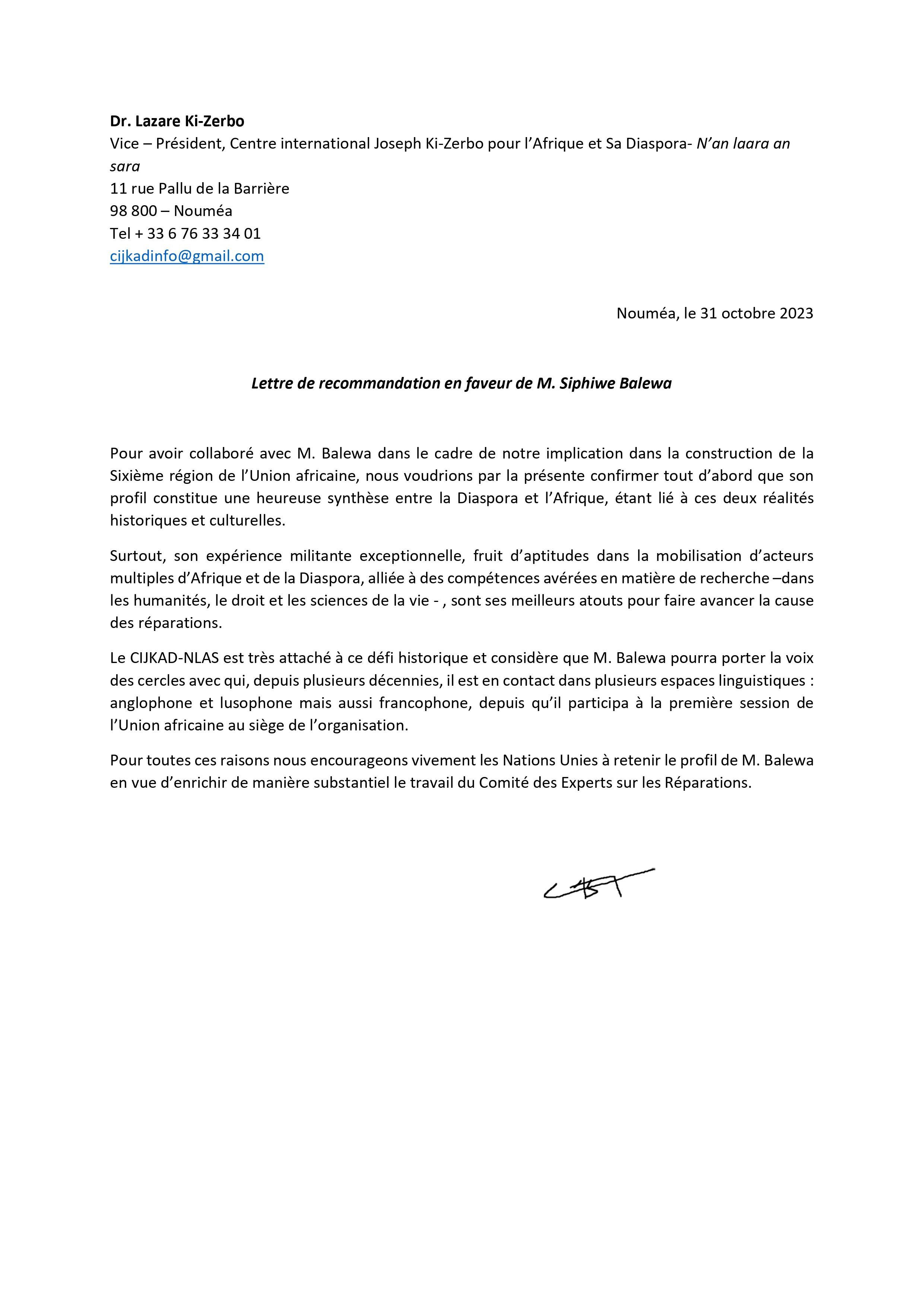
---------- Forwarded message ---------
From: Deadria Farmer-Paellmann
Date: Mon, Oct 30, 2023 at 12:24 PM
Subject: Letter of Recommendation for Siphiwe Baleka to be named to the African Committee of Experts on Reparations at the Accra Reparations Conference
To: <repaconf23@africa-union.org>, <secretariat@accrareparationsconference.com>
To the Accra Reparations Conference,
I am reaching out to you as an advocate for slavery reparations active in the movement for the last 25 years. During that time, I have been exposed to many of the leaders of this struggle and their various strategies for success. Very few have displayed as broad a vision toward justice as Siphiwe Baleka. It is my understanding that the upcoming conference will constitute the first ever African Committee of Experts on Reparations. For the benefit of our people, I recommend that you consider Mr. Baleka for service on this esteemed Committee.
Mr. Baleka is well researched on the transatlantic slave trade and slavery. He has a comprehensive knowledge of our specific African origins, as well as the places we were deposited in the Americas, the conditions of the people, and the various international agreements and instruments utilized in this crime against humanity. He also has a great knowledge of African nations today through residency and travel.
Mr. Baleka is well versed in DNA technology and how it can be utilized in an effort to secure reparatory justice. This is something my own organization embraces in our work.
Lastly, Mr. Baleka has been engaged in the international community writing policy, listening to and mobilizing peoples, and representing the interests of all Africans. I find him to be a brilliant resource and tireless contributor in work that requires creativity, precision and stamina.
I believe that Mr. Baleka will be an excellent resource and reliable, unifying team player as a member of your esteemed African Committee of Experts on Reparations. I recommend him without reservation.
Respectfully submitted,
Deadria Farmer-Paellmann, J.D., M.A.
Executive Director
Restitution Study Group
www.rsgincorp.org
Apparently, the letter writing campaign was successful, since I received an invitation to attend the conference as a delegate:


With this letter of invitation, I was thus preoccupied with raising the funds to pay for my transportation and accommodation at the Accra Reparations Conference. Thanks to some great supporters, I was able to raise $1,815 of the $3,000 fundraising goal to purchase a plane ticket. I now had a Peoples’ mandate as their representative and a mission to:
1) Introduce and explain the Dum Diversas-prisoner of war-ethnocide narrative and legal strategy;
2) Win over the CARICOM representatives and members of the African Union;
3) Influence the decision on the composition of the proposed African Committee of Experts on Reparations and make sure it includes those who have advanced the most in internal reparations;
Before departure, however, there was something extremely important that had to happen. I had to get the blessing of my Balanta ancestors by visiting the sahe ndang (“sacred tree”) in the village of Rucuto. After that visit, the elders prepared a sacred amulet which they gave to me the day before I departed for “All this blessing on your behalf and wishing success in Reparations conference and beyond. May all that comes out of your mouth be like honey!”
The power of the amulet would turn out to be immediately significant. Upon landing in Accra, while go through passport control, I was asked to show my yellow fever card. Unfortunately, I had left it in my desk at home. Anywone who goes through passport control in an airport in Africa knows how difficult they can be. When I explained to the lady in the booth that I had a yellow fever card but didn’t have it with me, she suggested I get a picture of it. Unfortunately, I couldn’t connect to the airport wifi so she connected me through the hotspot on her phone. Still, no one could find my yellow fever card in my desk! After 20 minutes, however, the lady in the booth looked at me and said, “I want you to go to the conference.” She handed me my passport, nodded her head and signalled me to pass. And with that, the door was open. This was my confirmation of the ancestors help because I have had numerous very negative experiences at passport control… Towards the end of the conference, I would get a second, crystal-clear confirmation of the power of traditional African spirituality and my Balanta amulet.
Following the photo gallery is my report from the Conference.
(hover over the picture for a description)
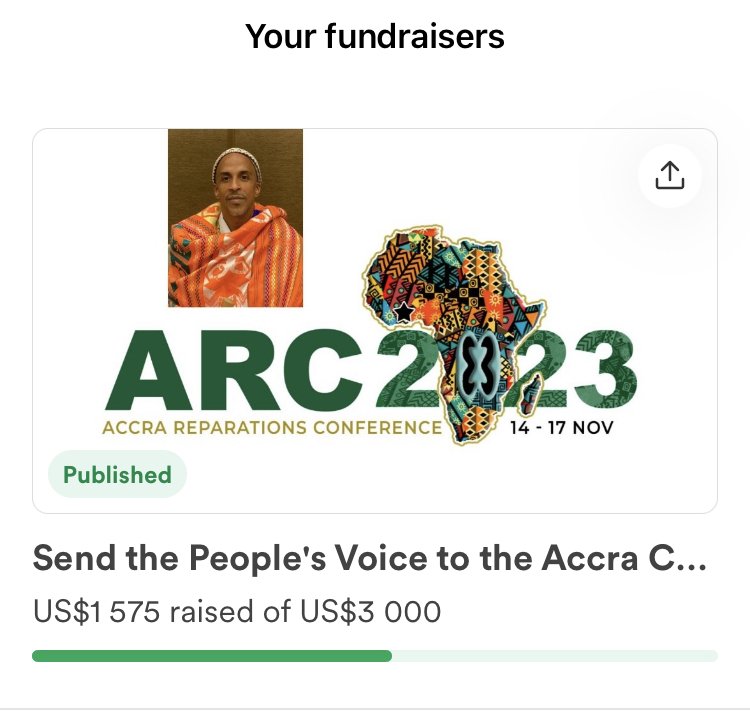
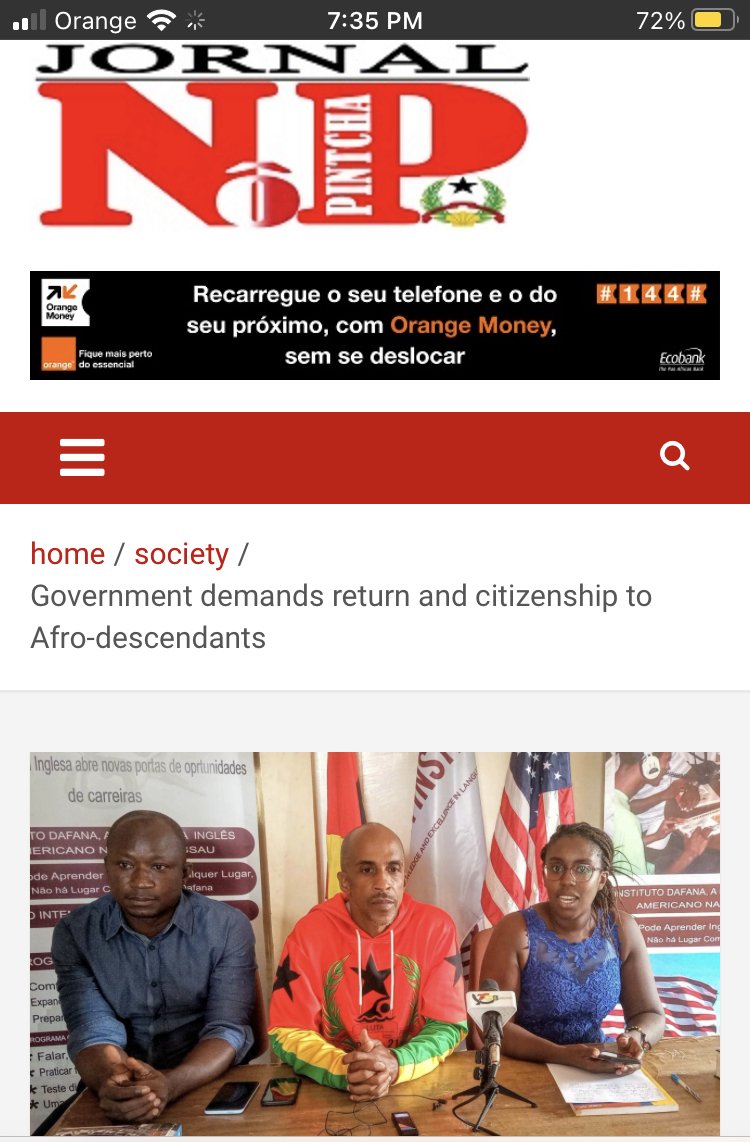
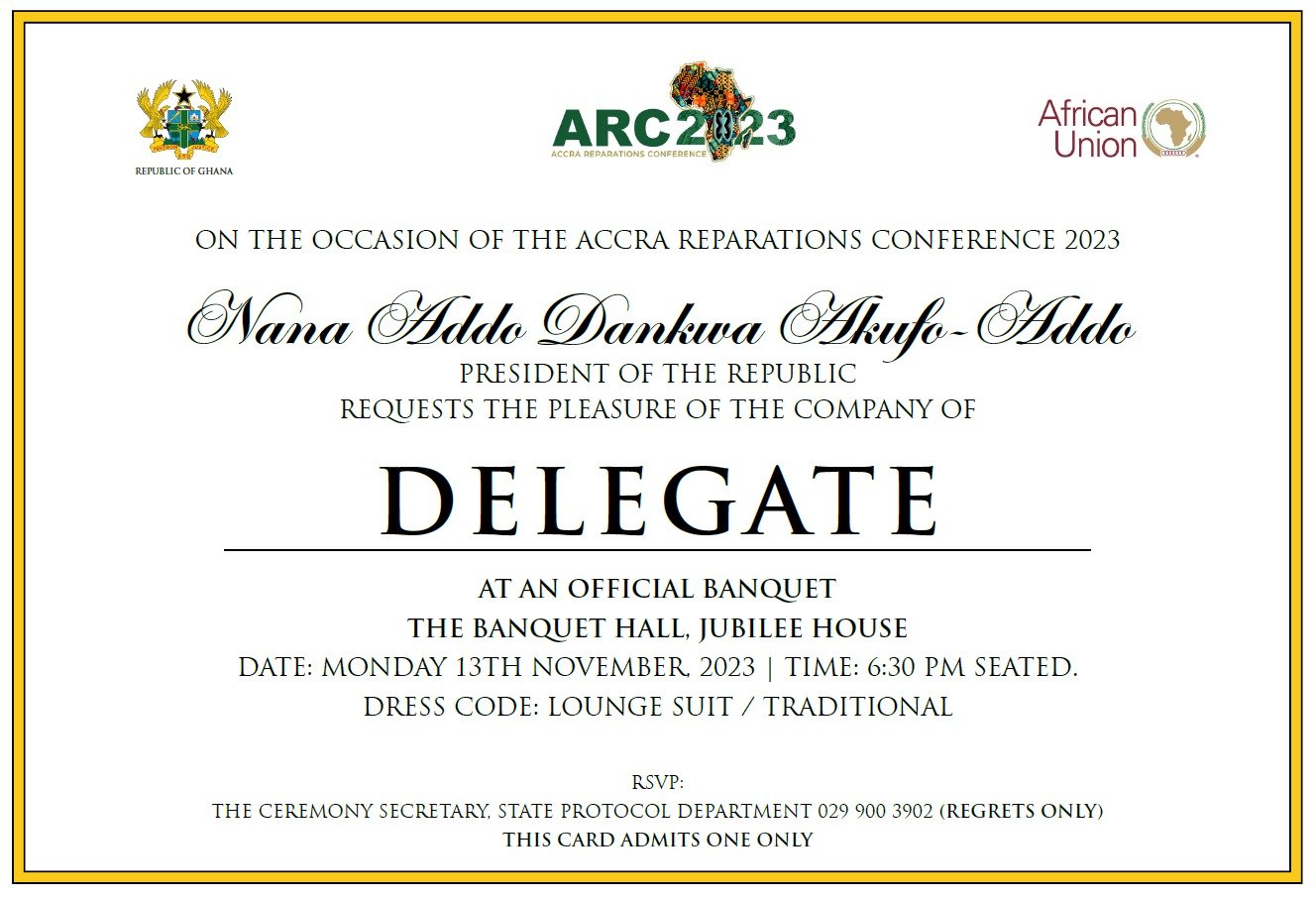
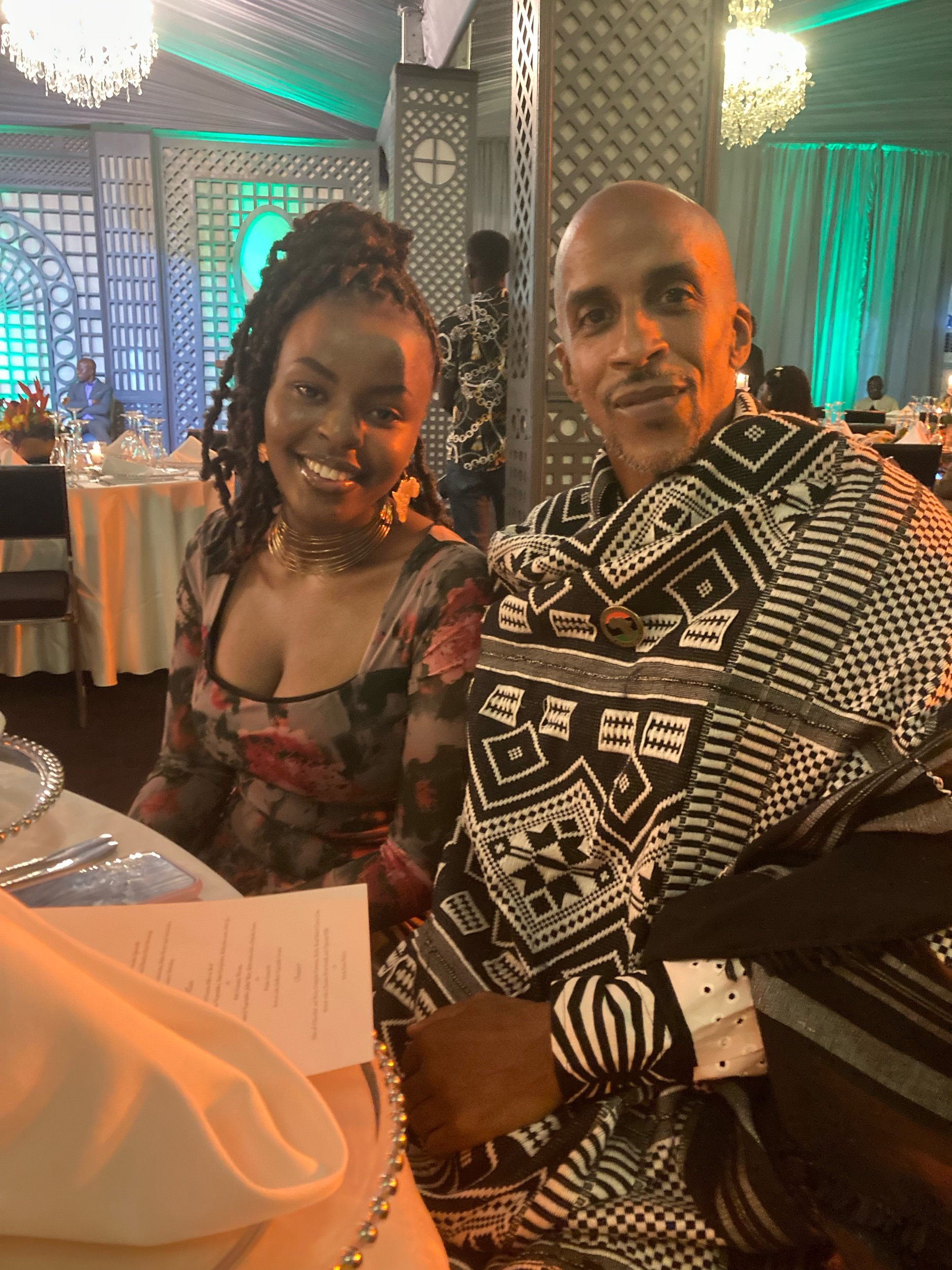
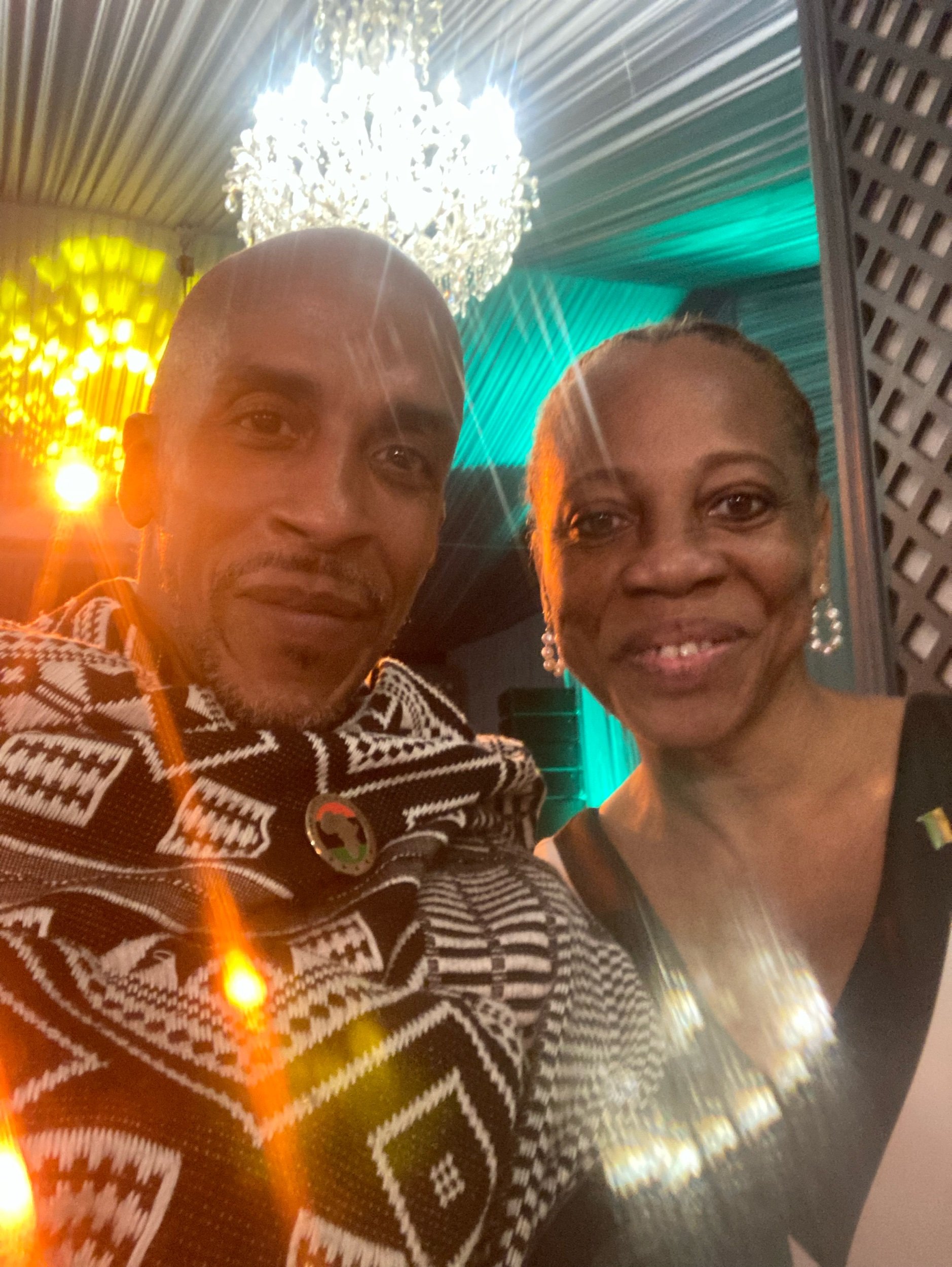
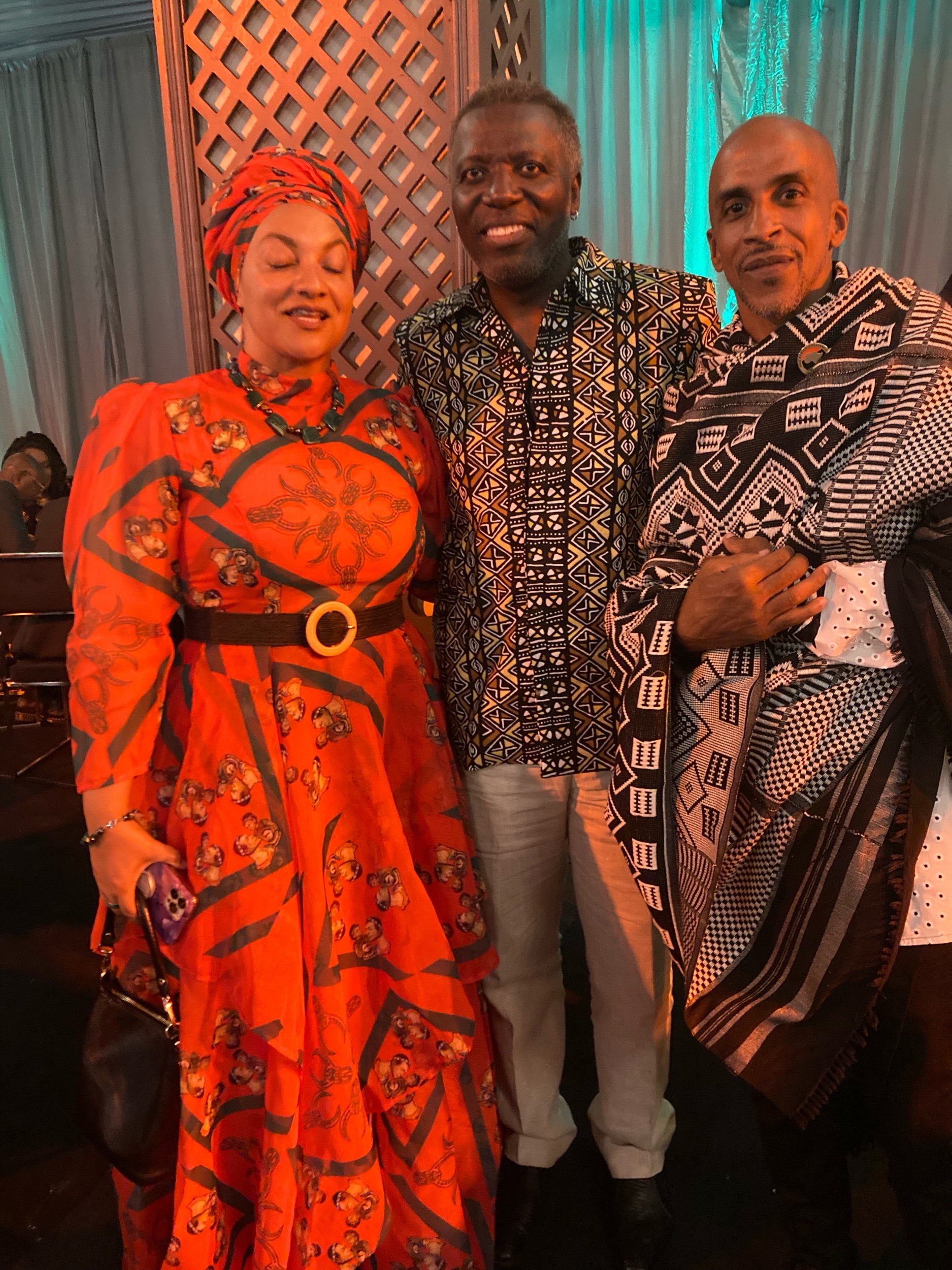
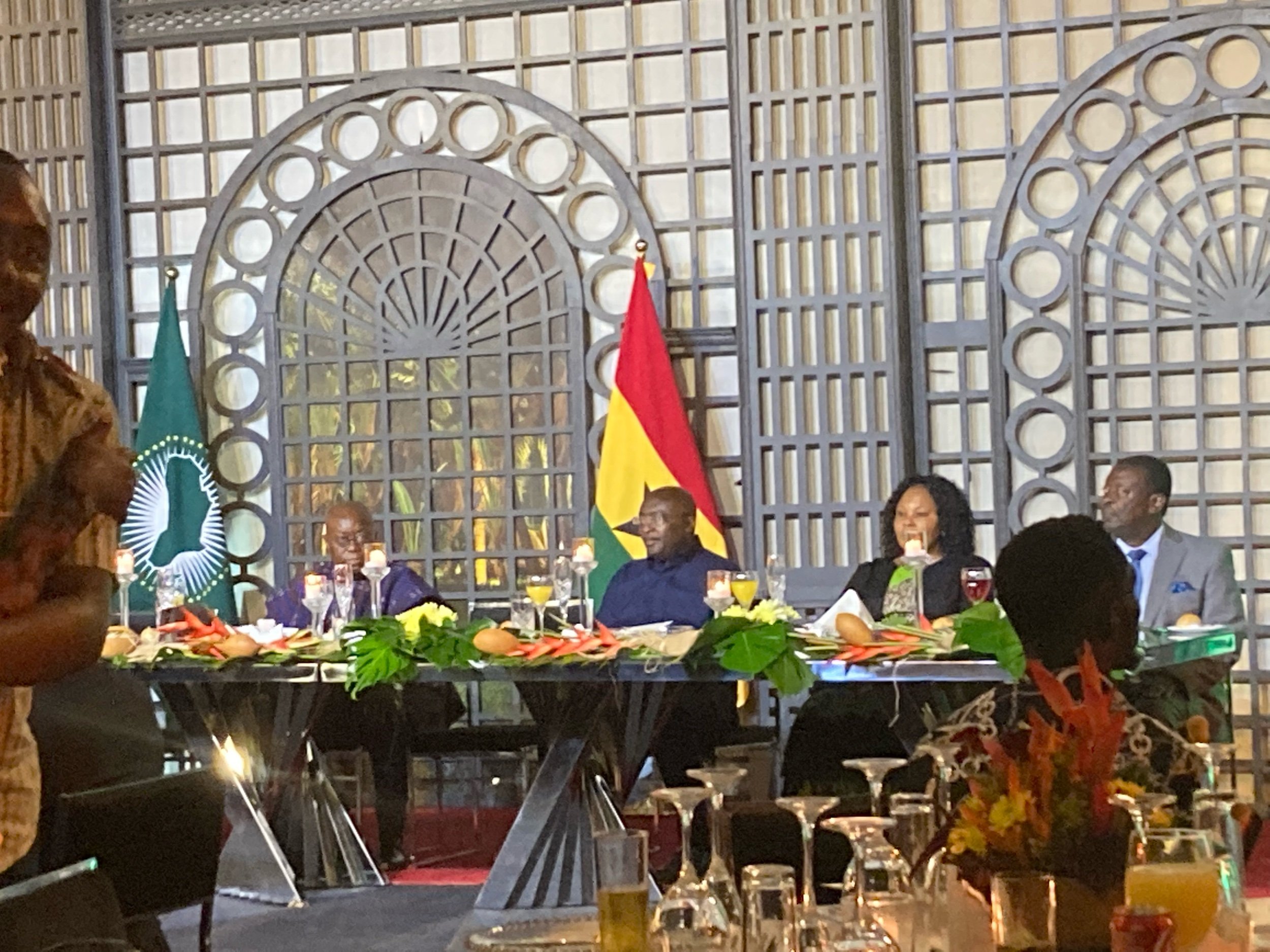
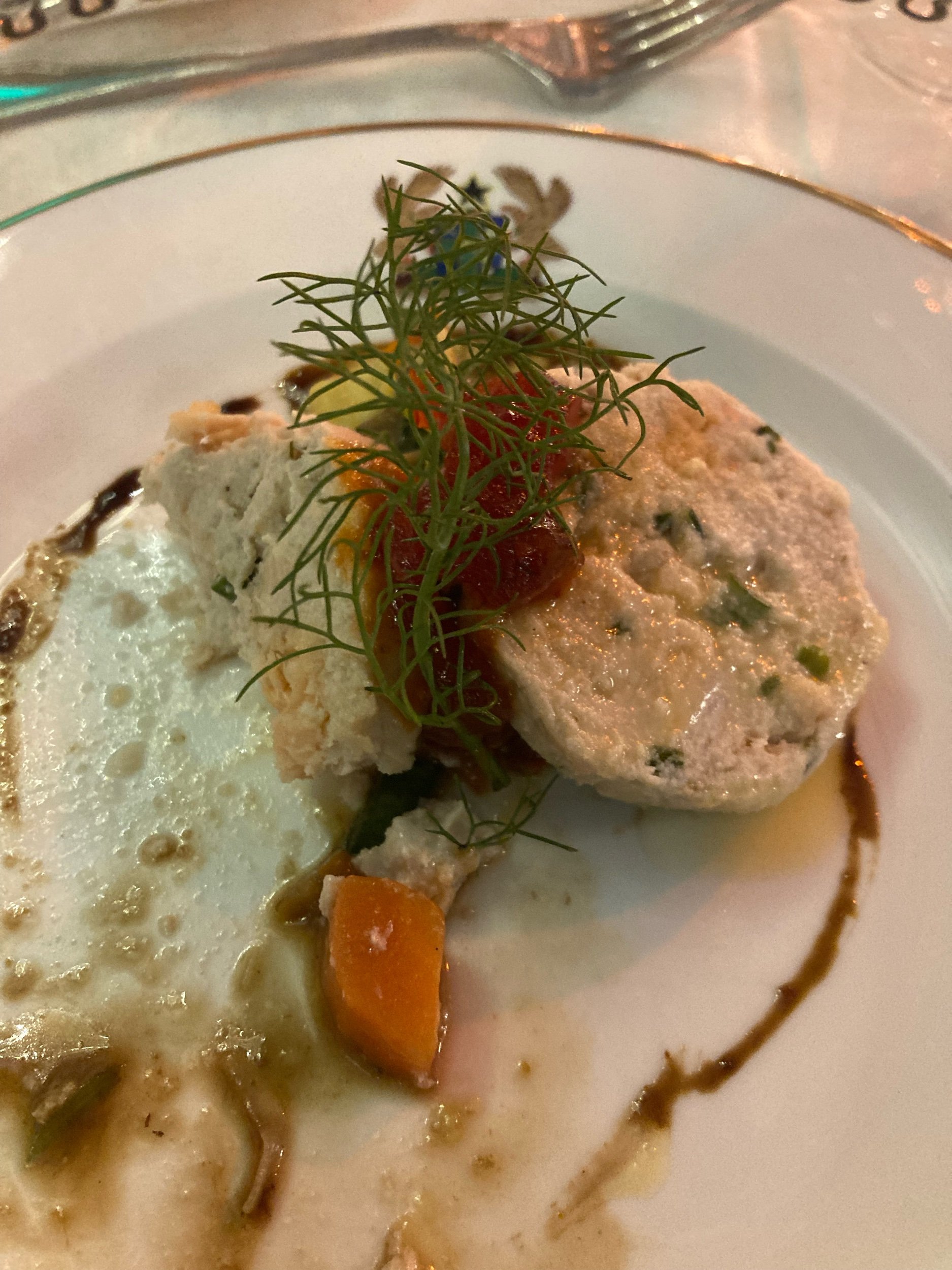
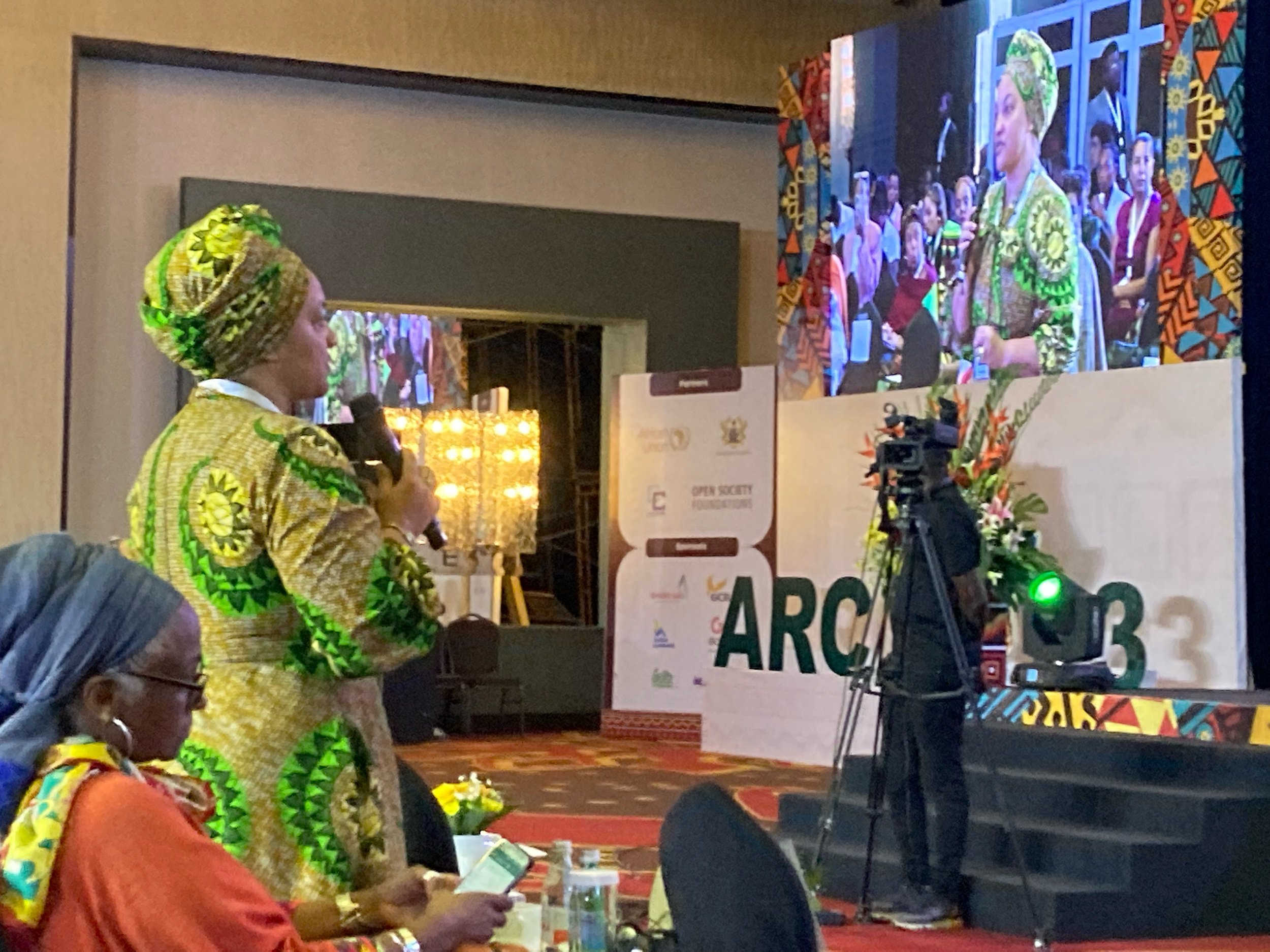
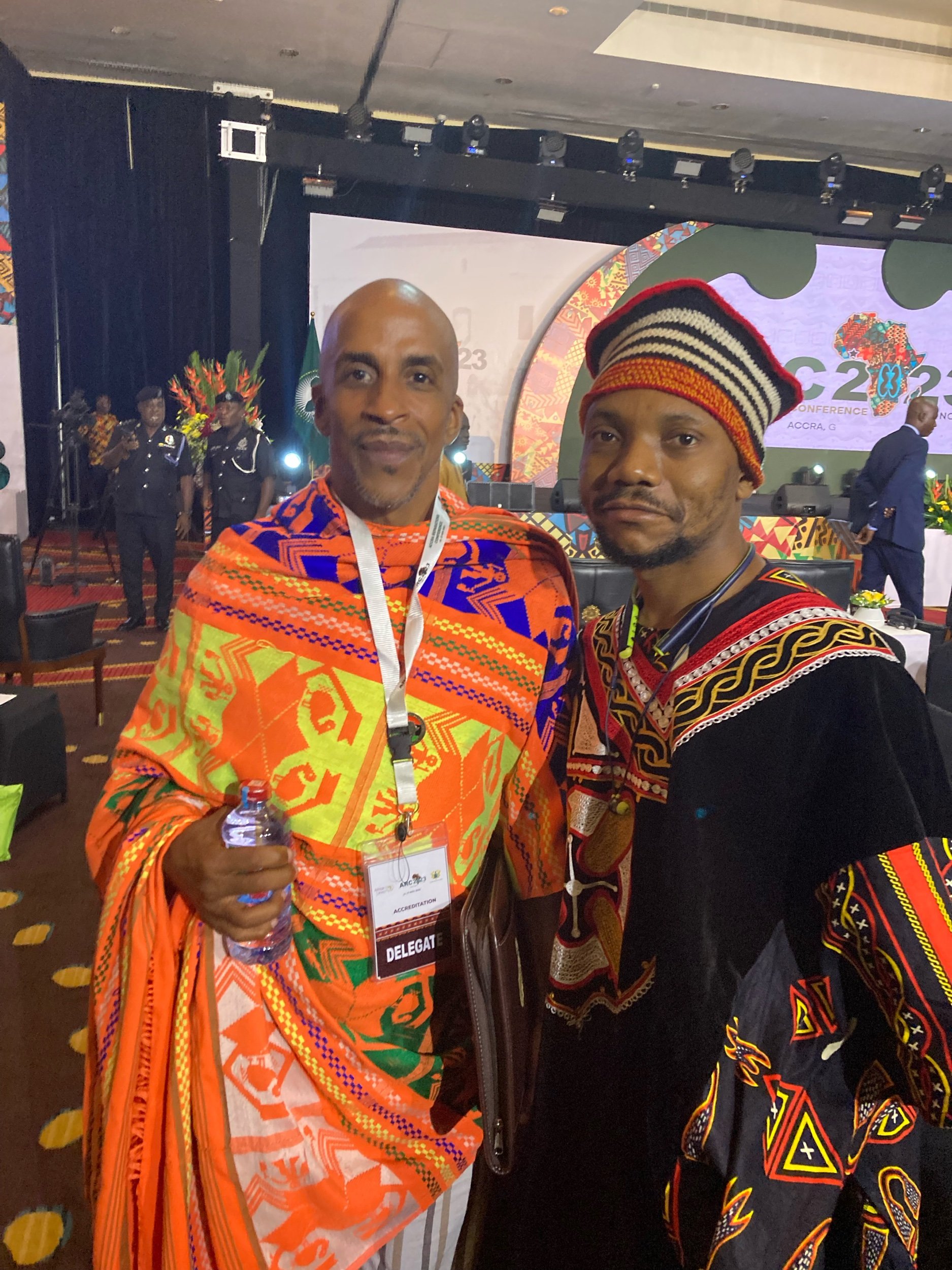
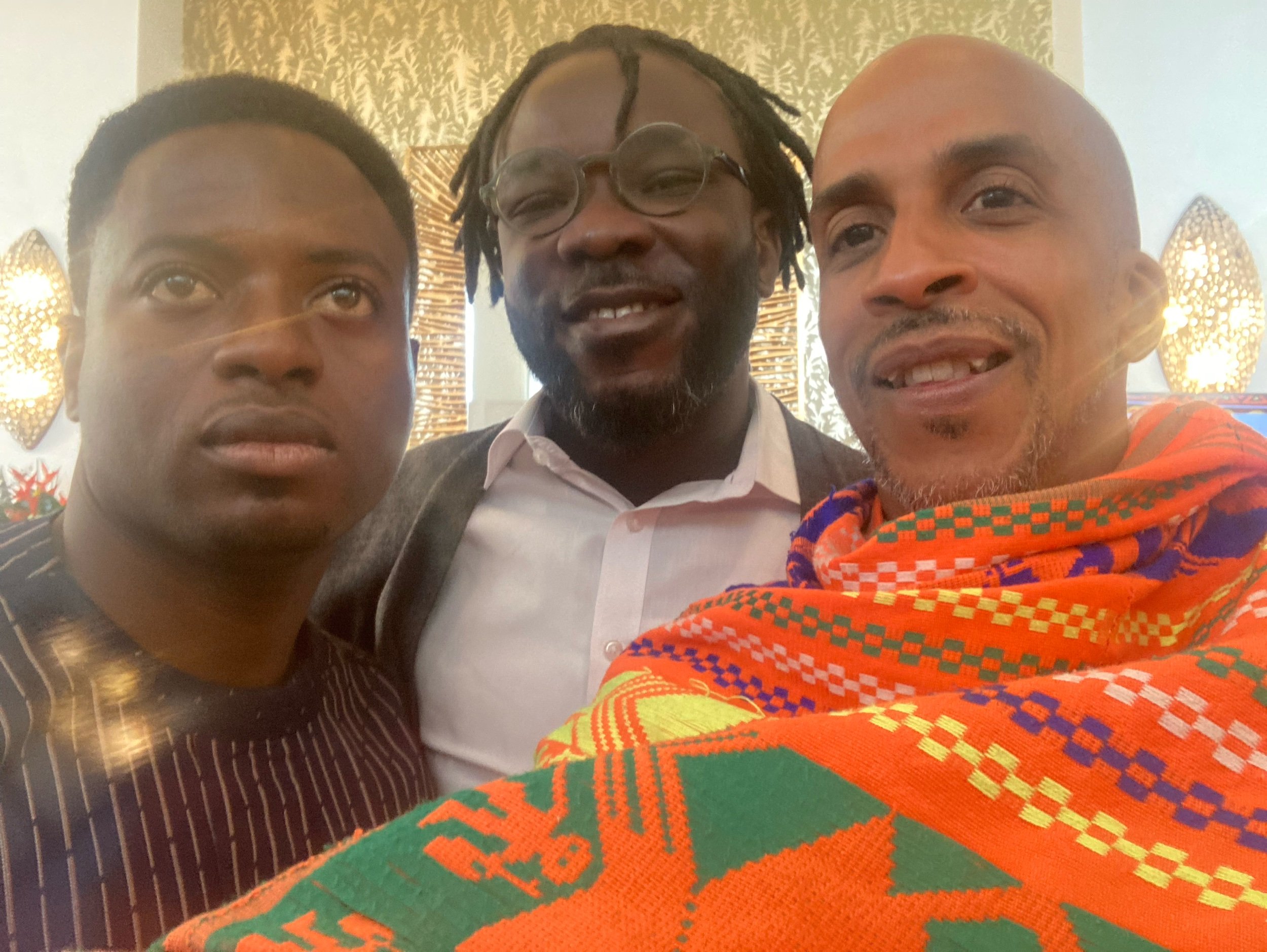
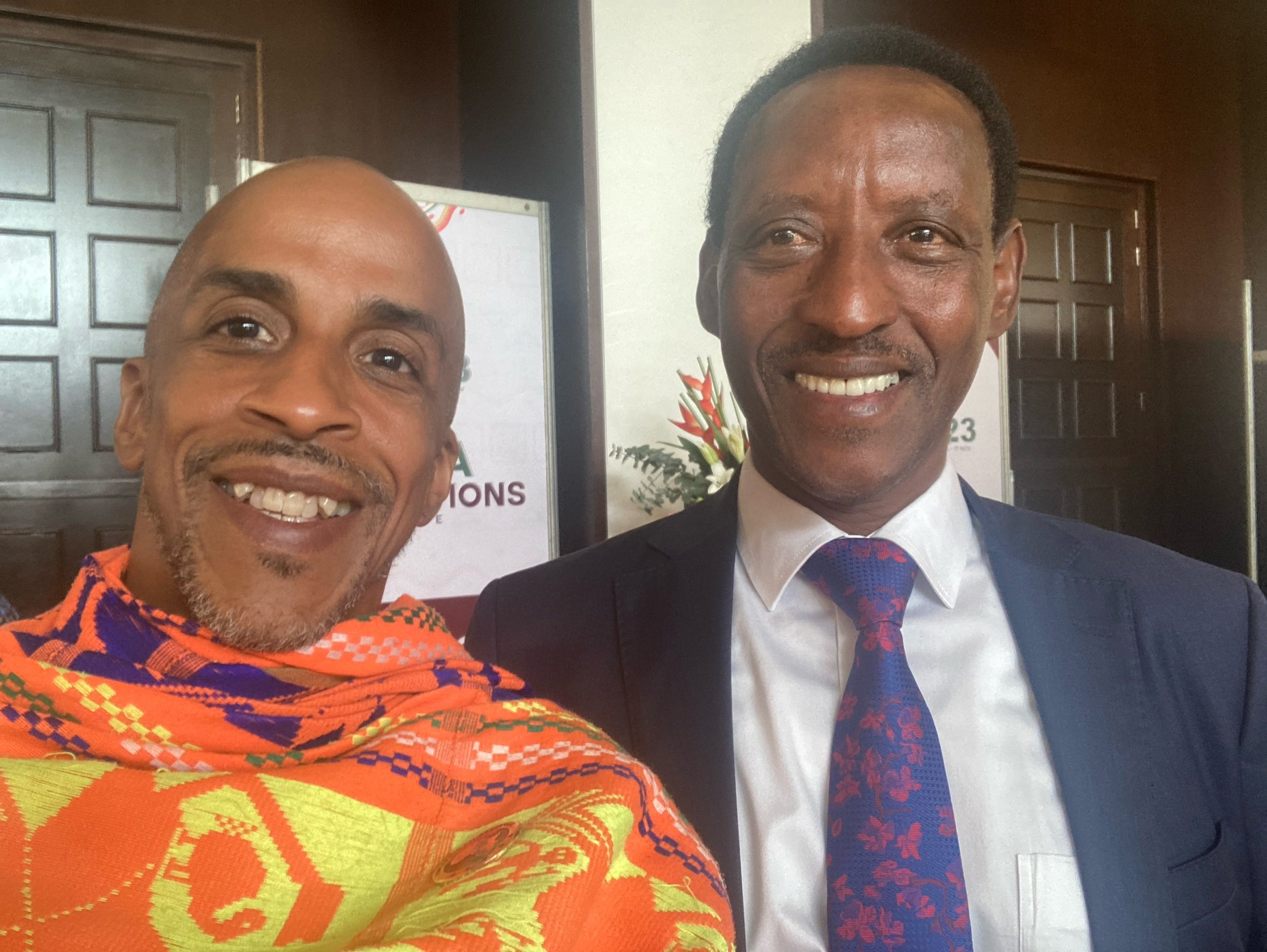
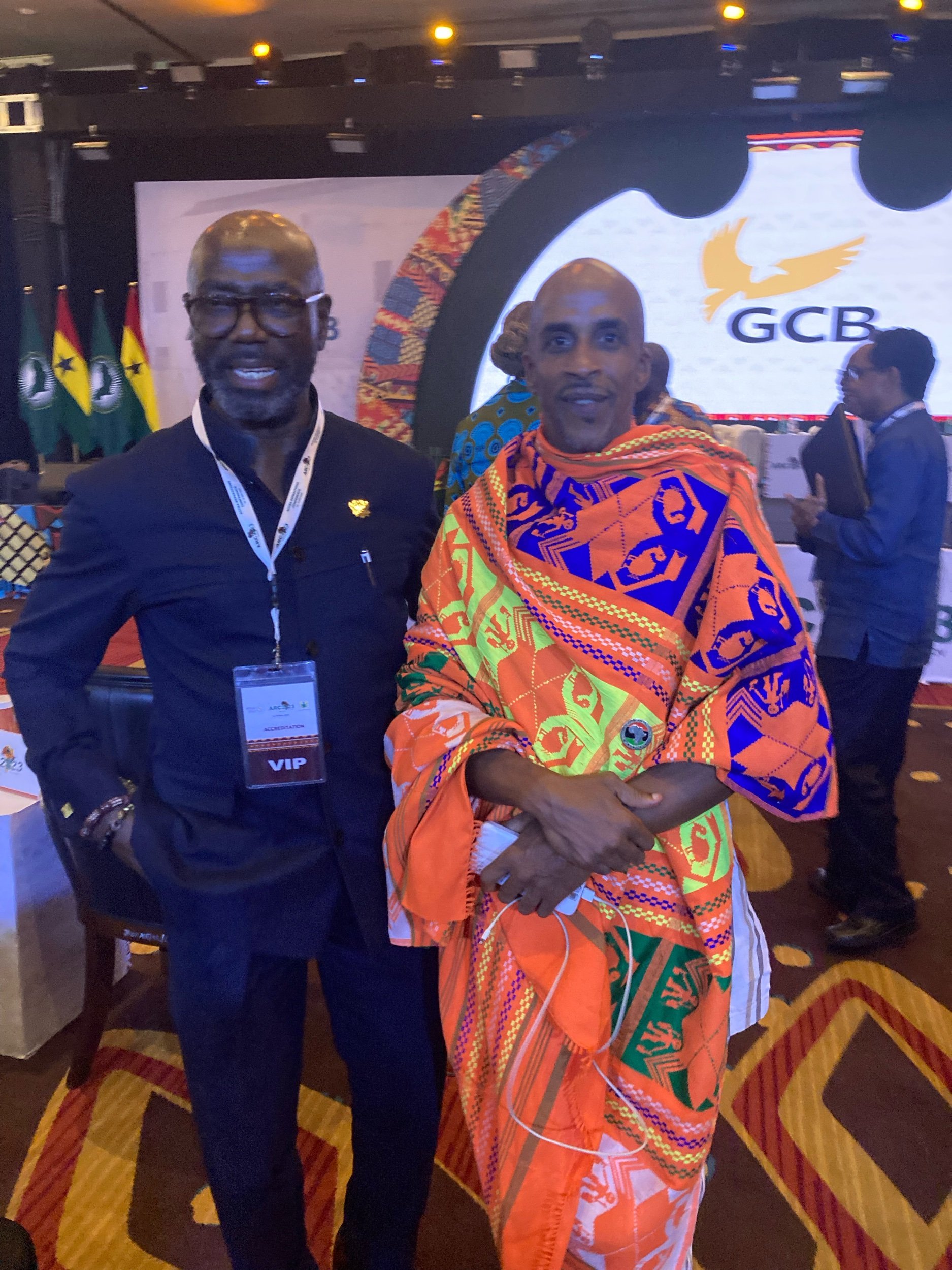
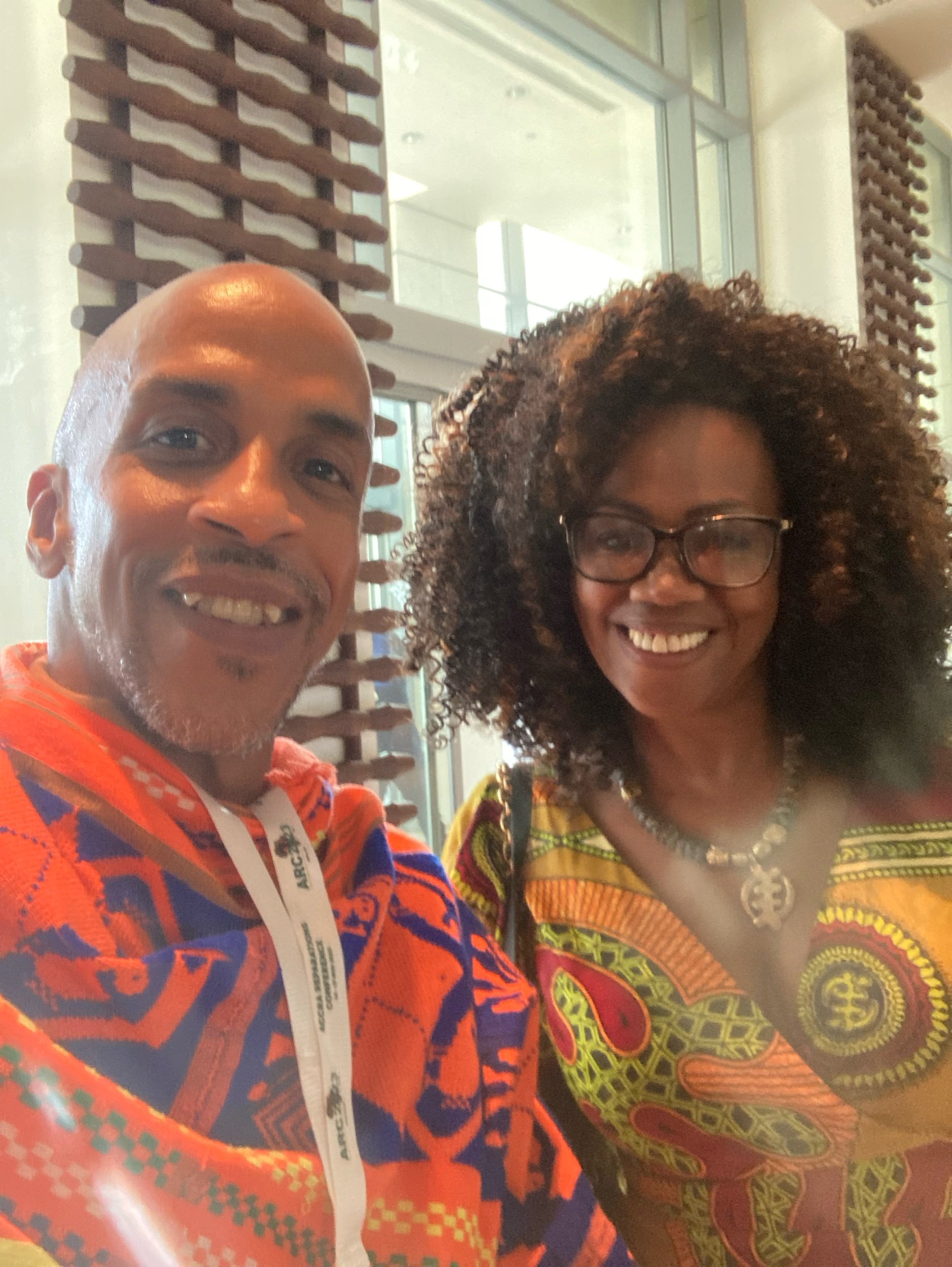
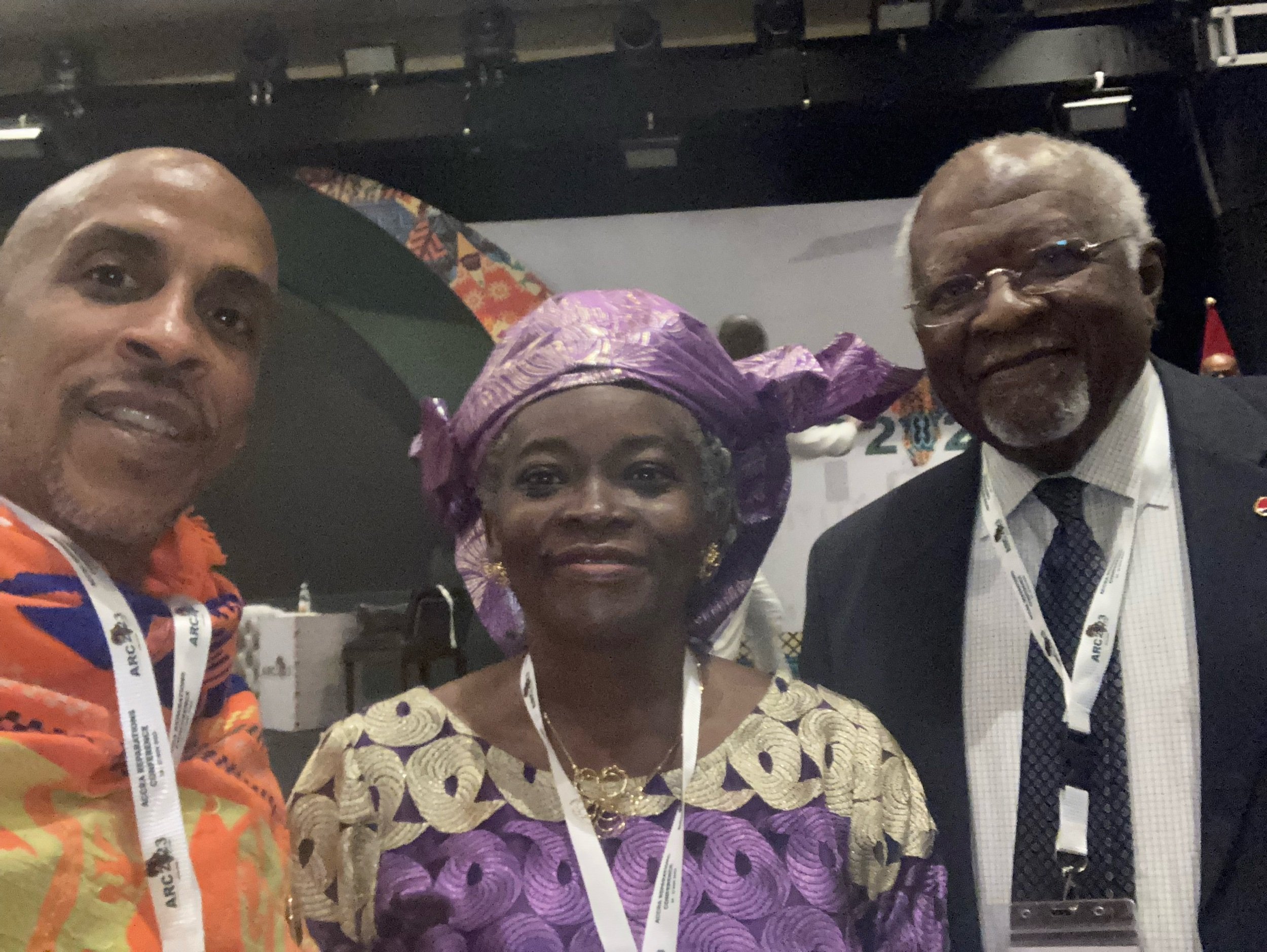
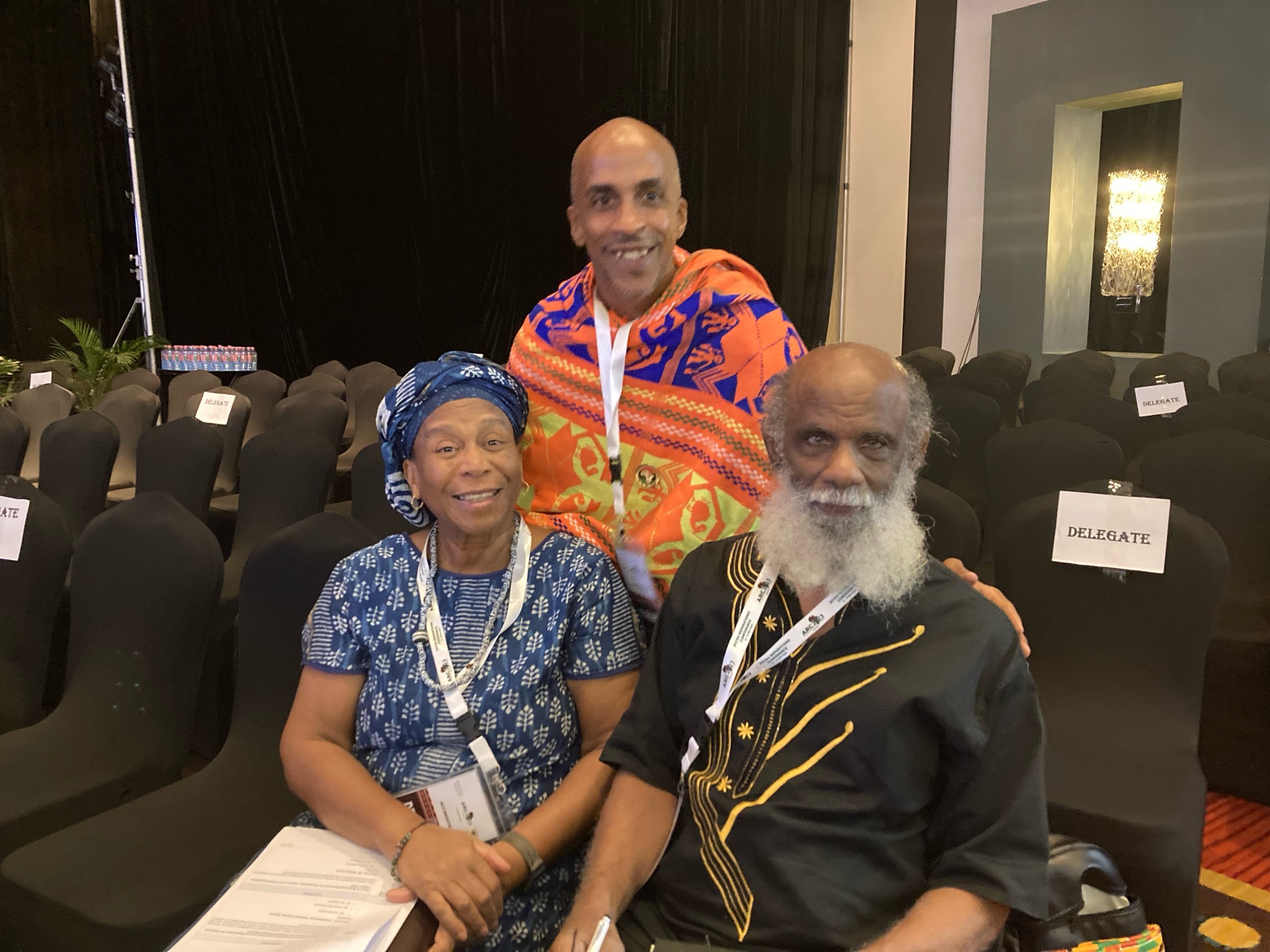
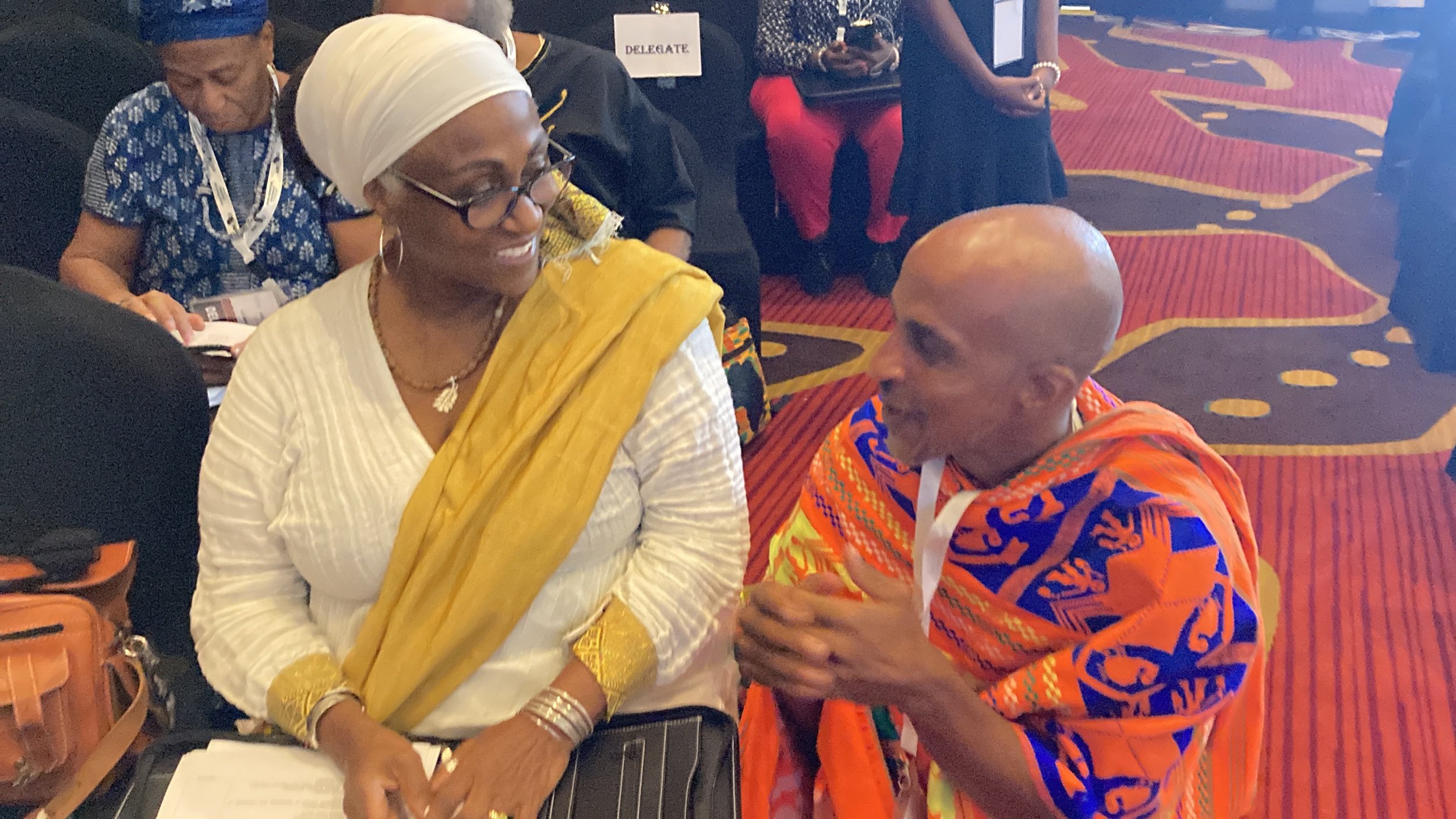
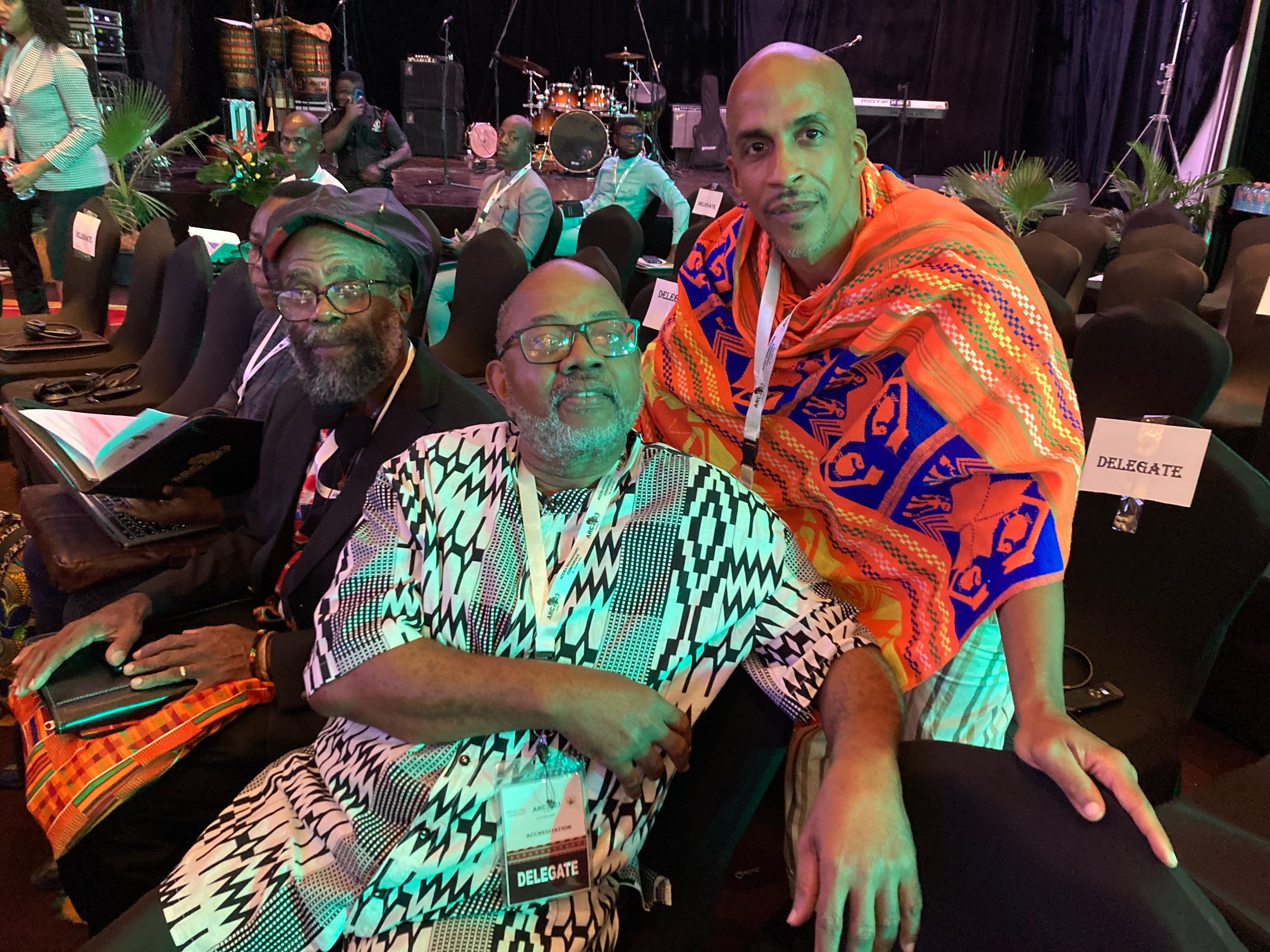
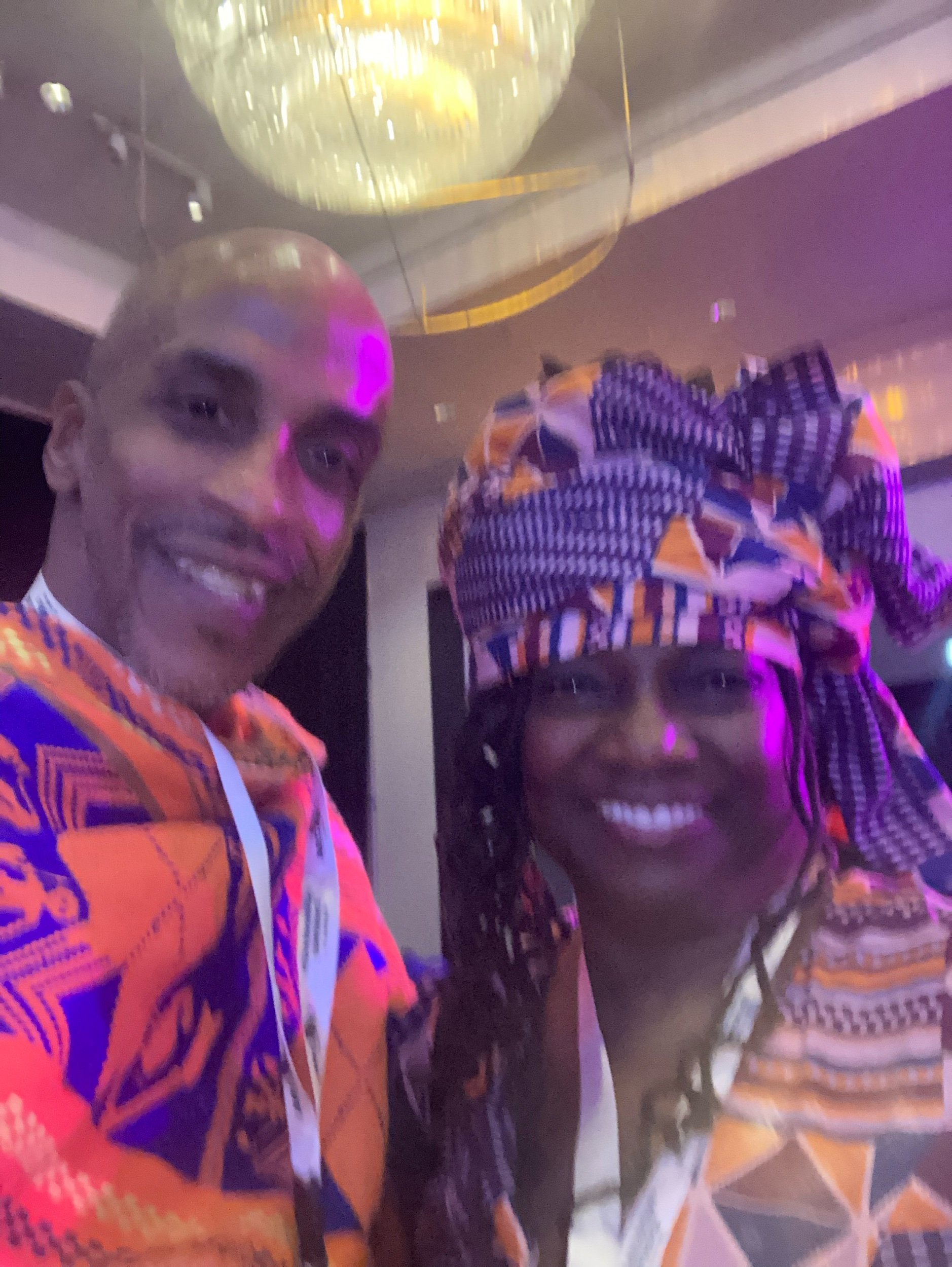
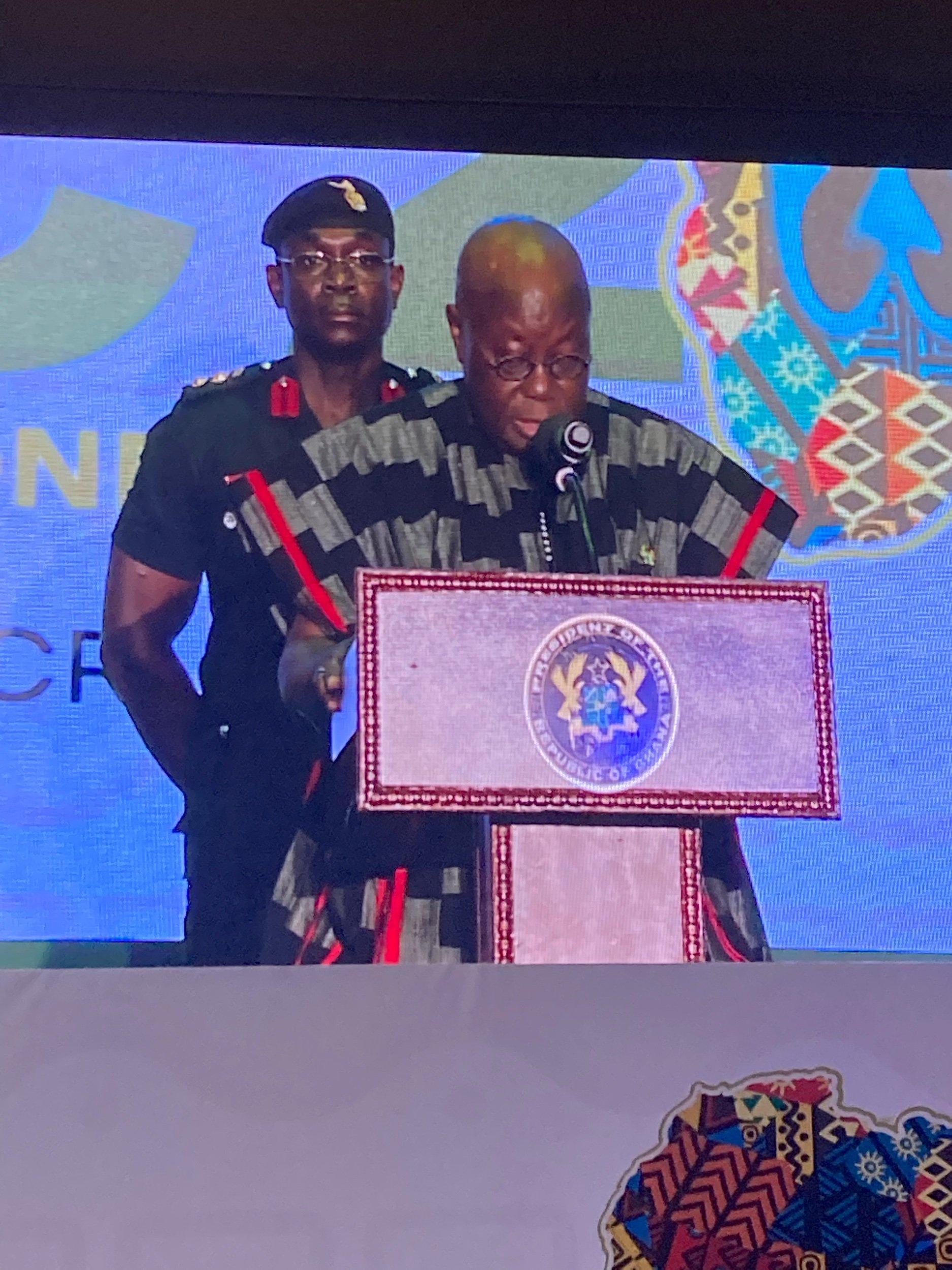
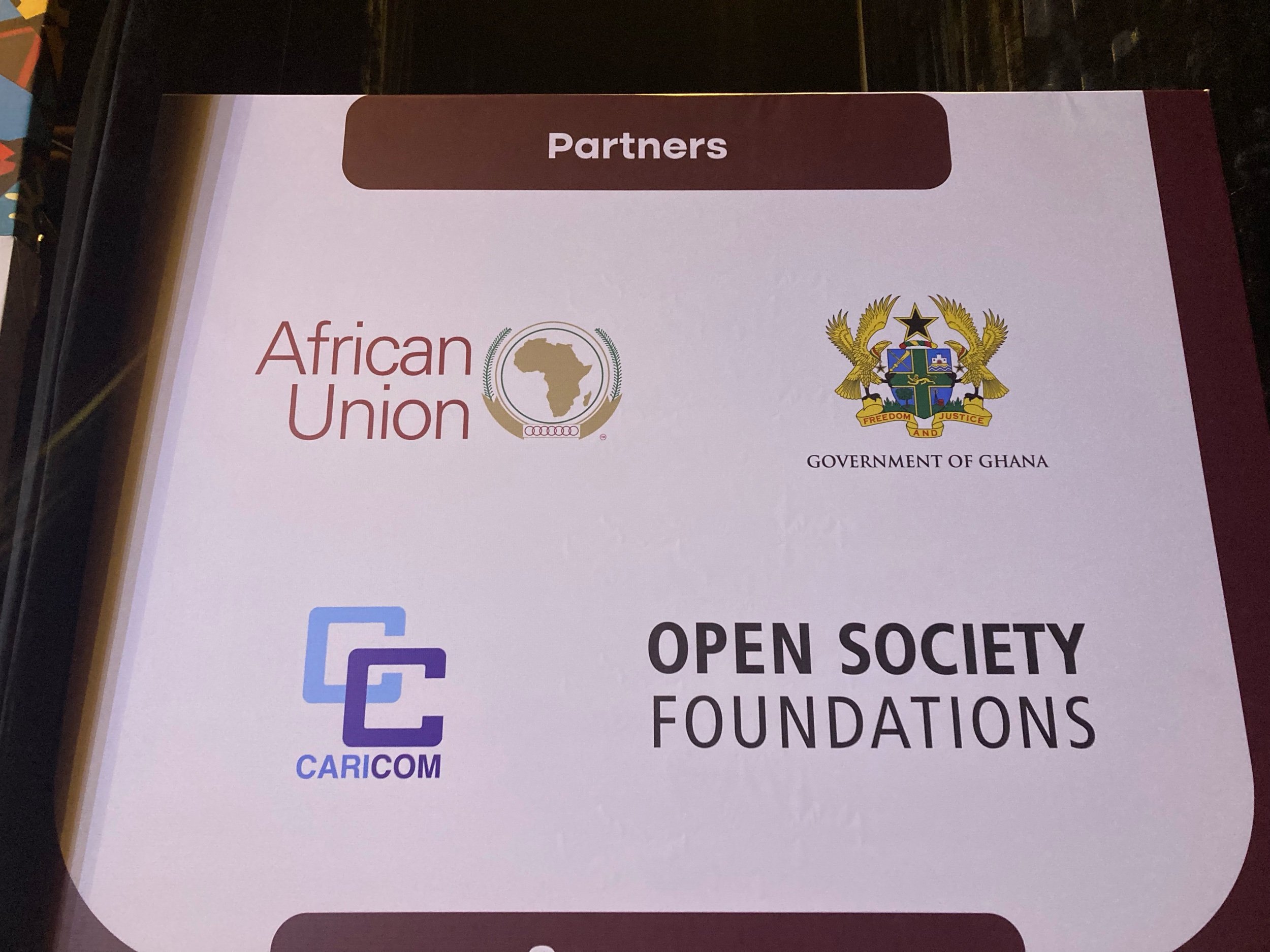
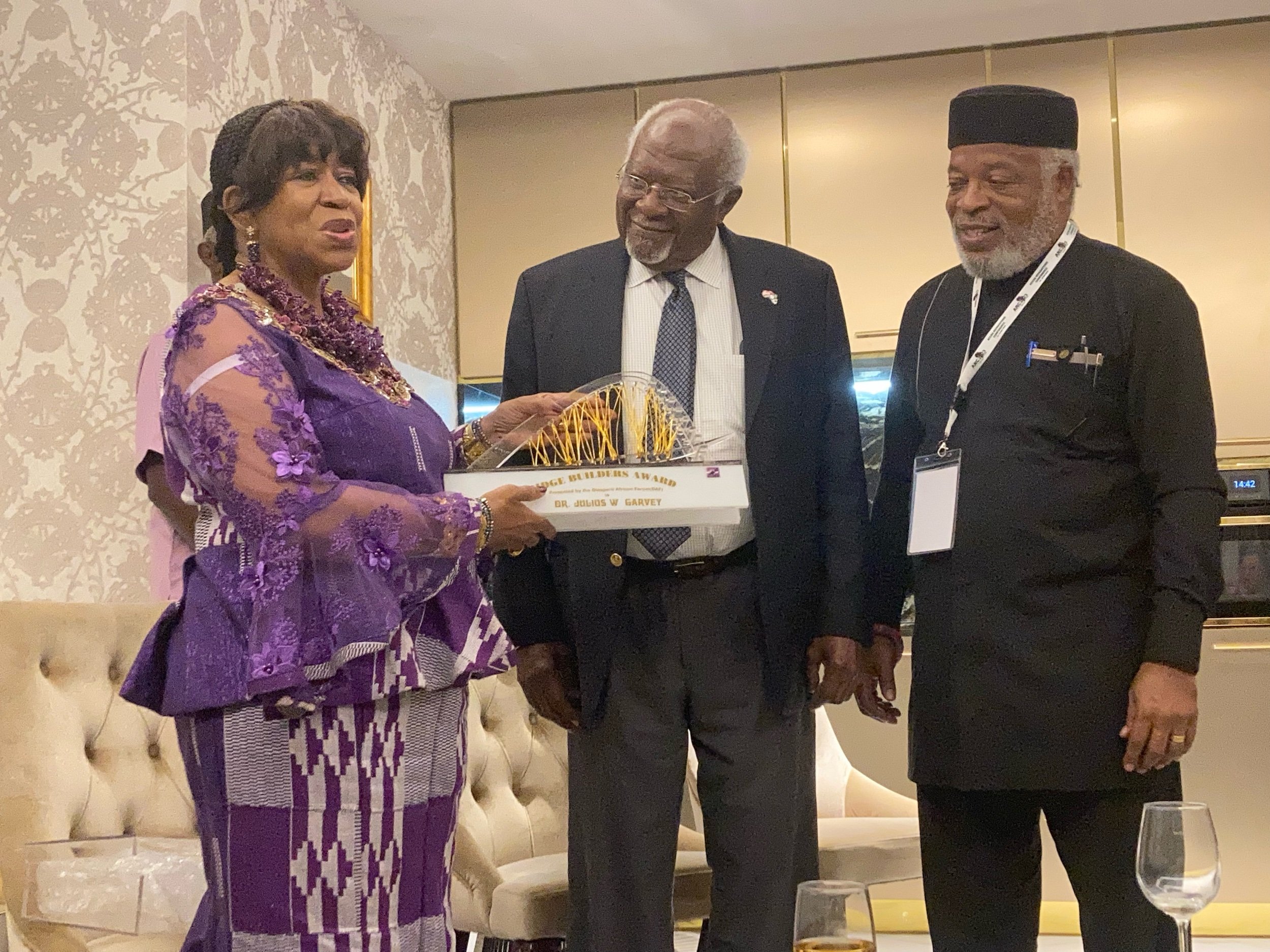
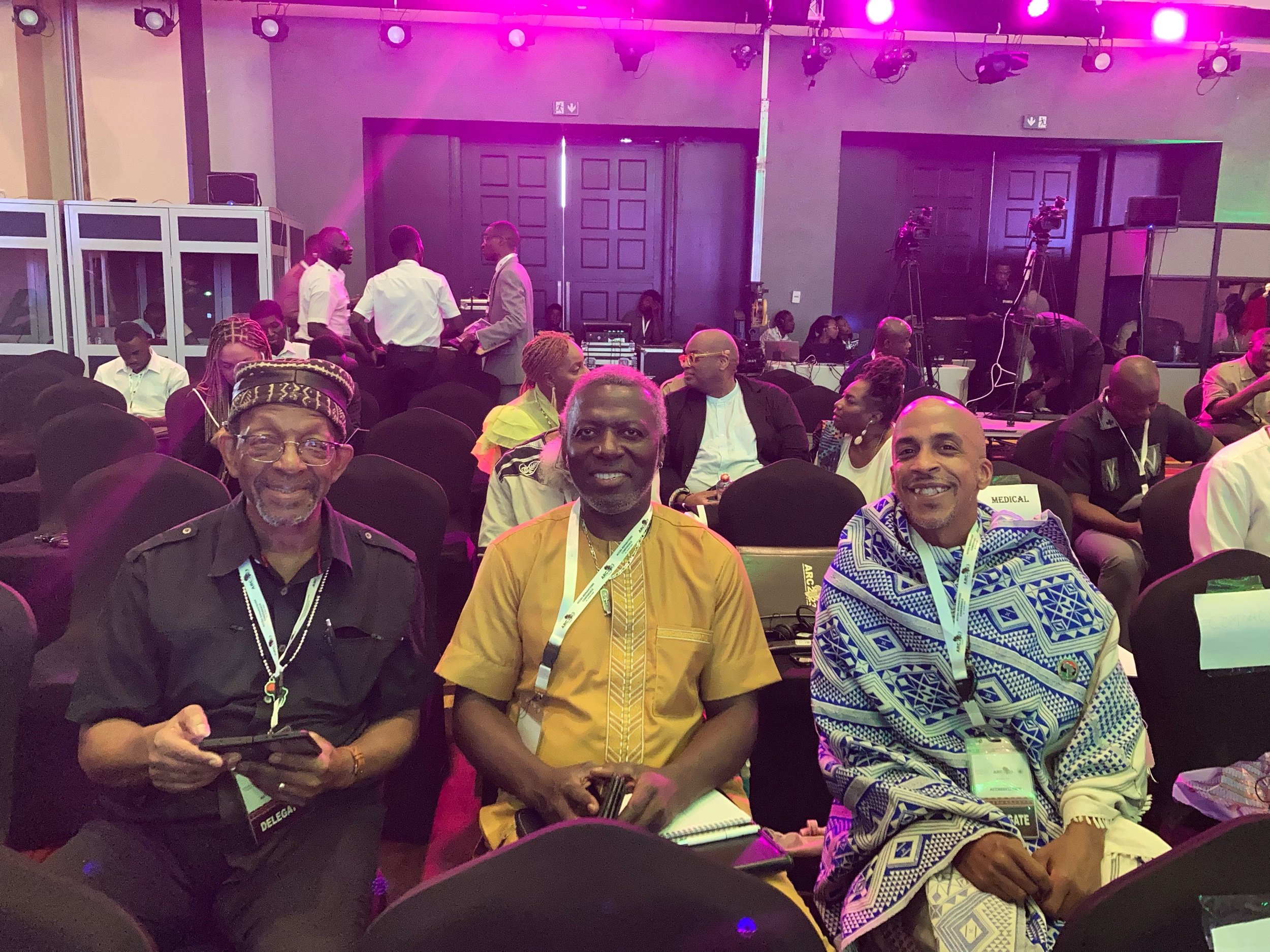

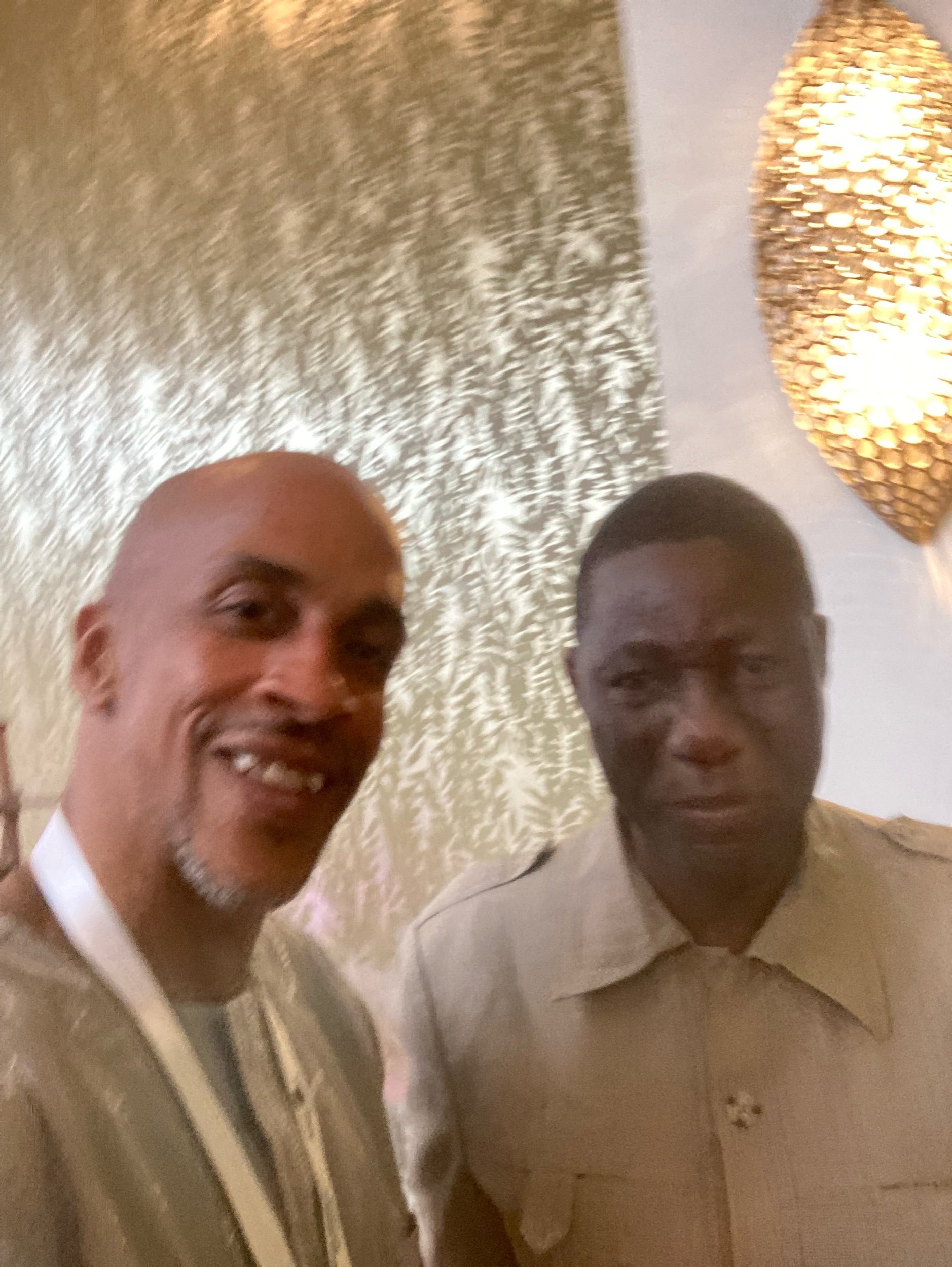
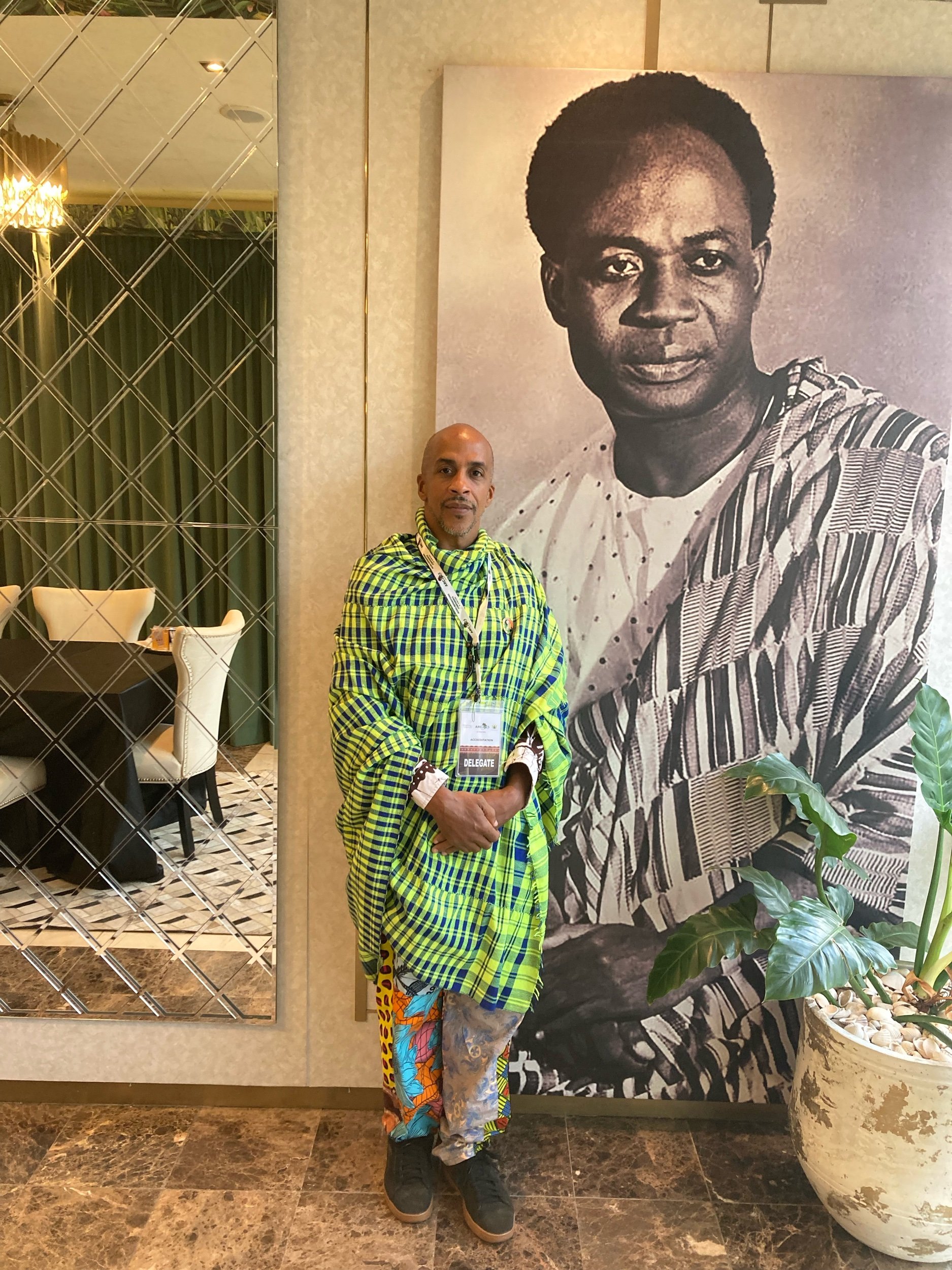
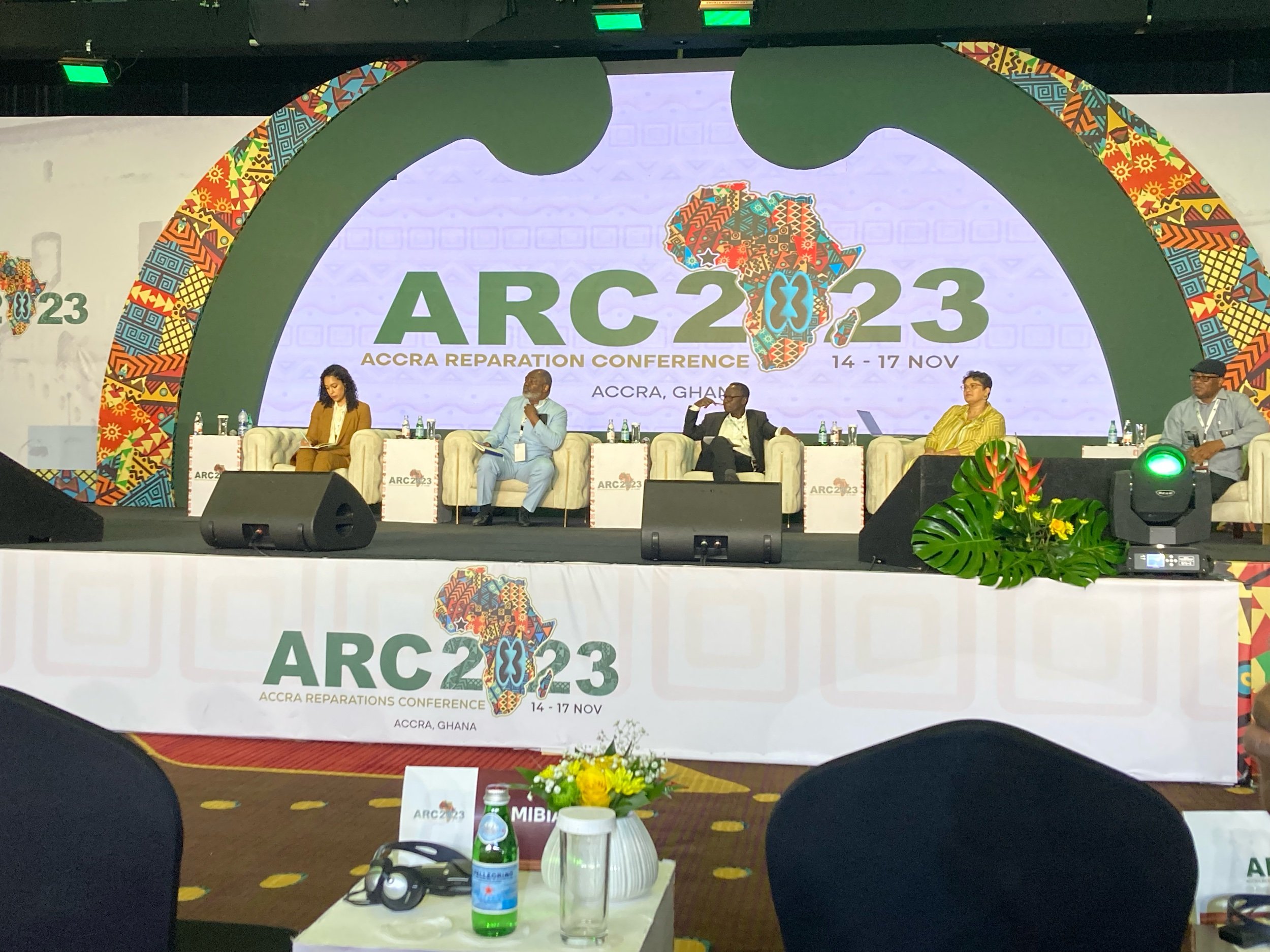
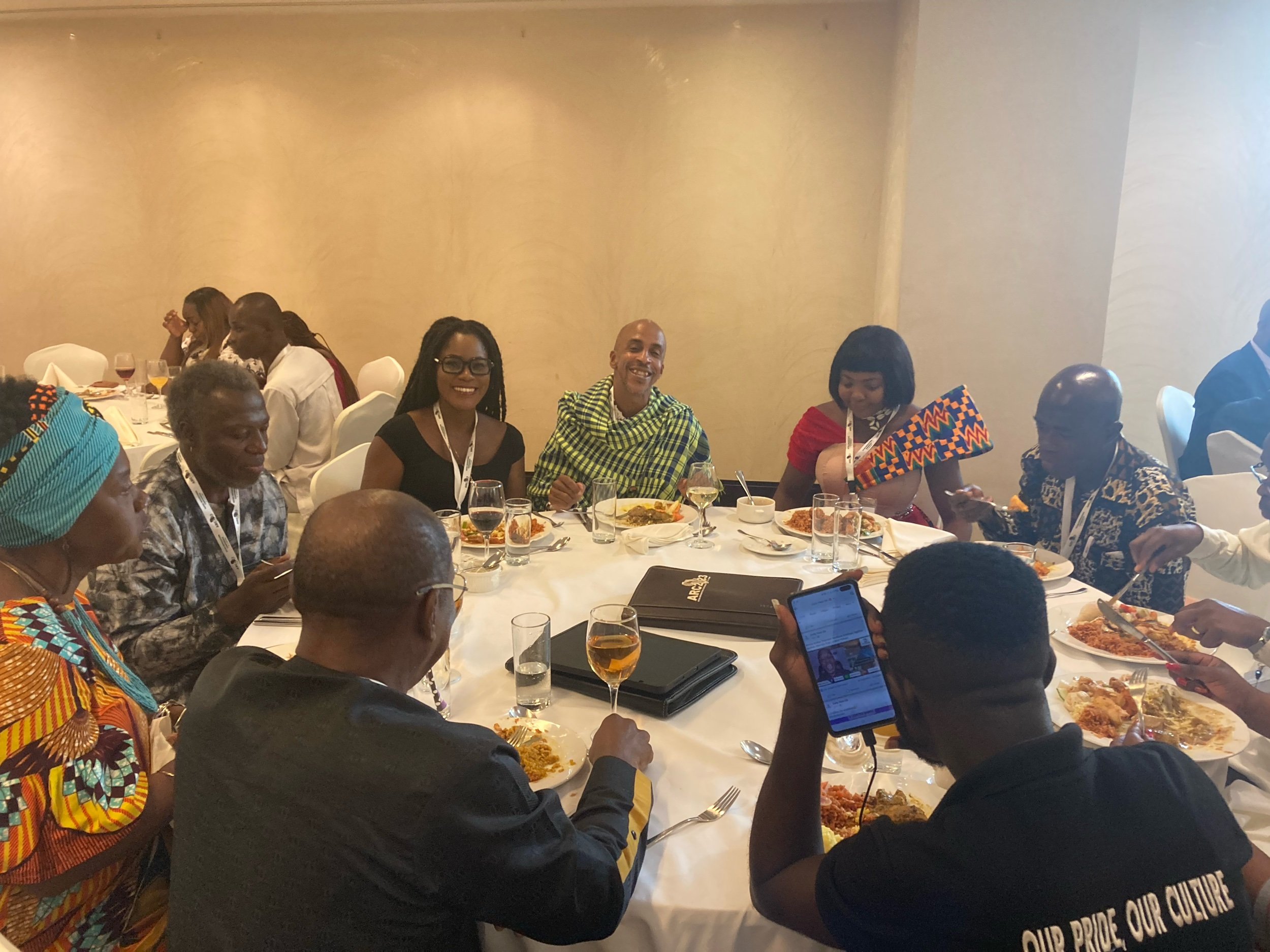
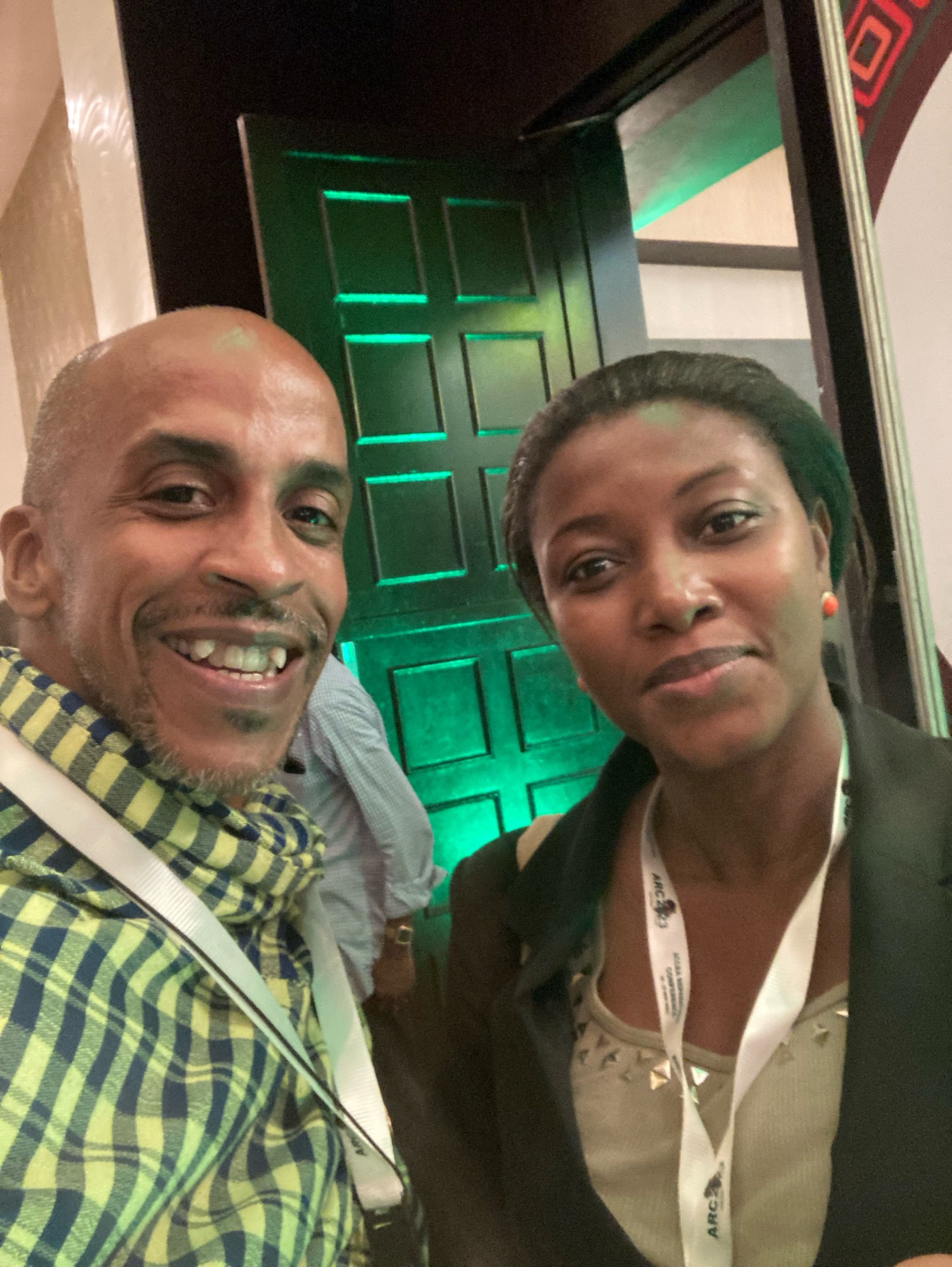
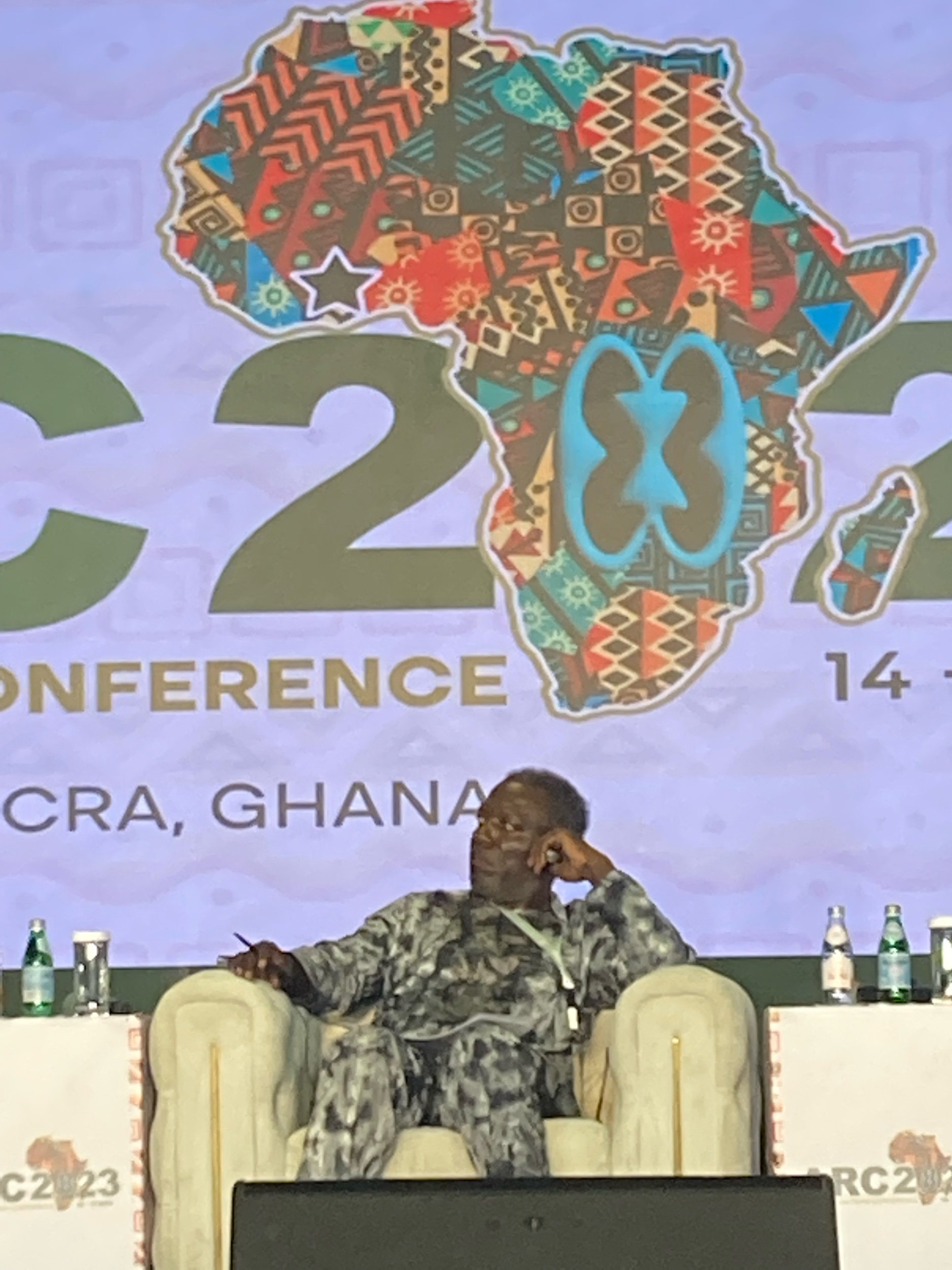
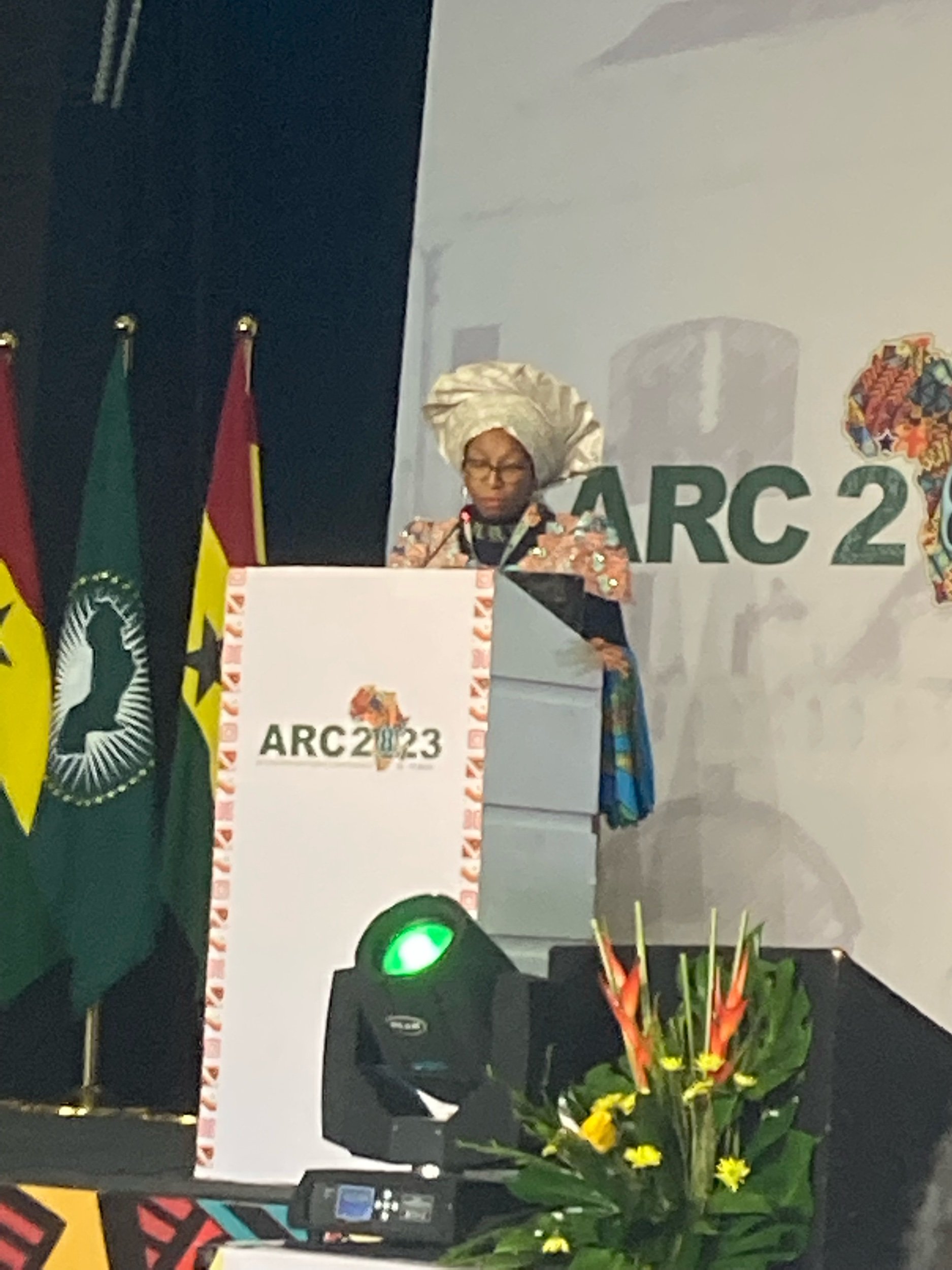
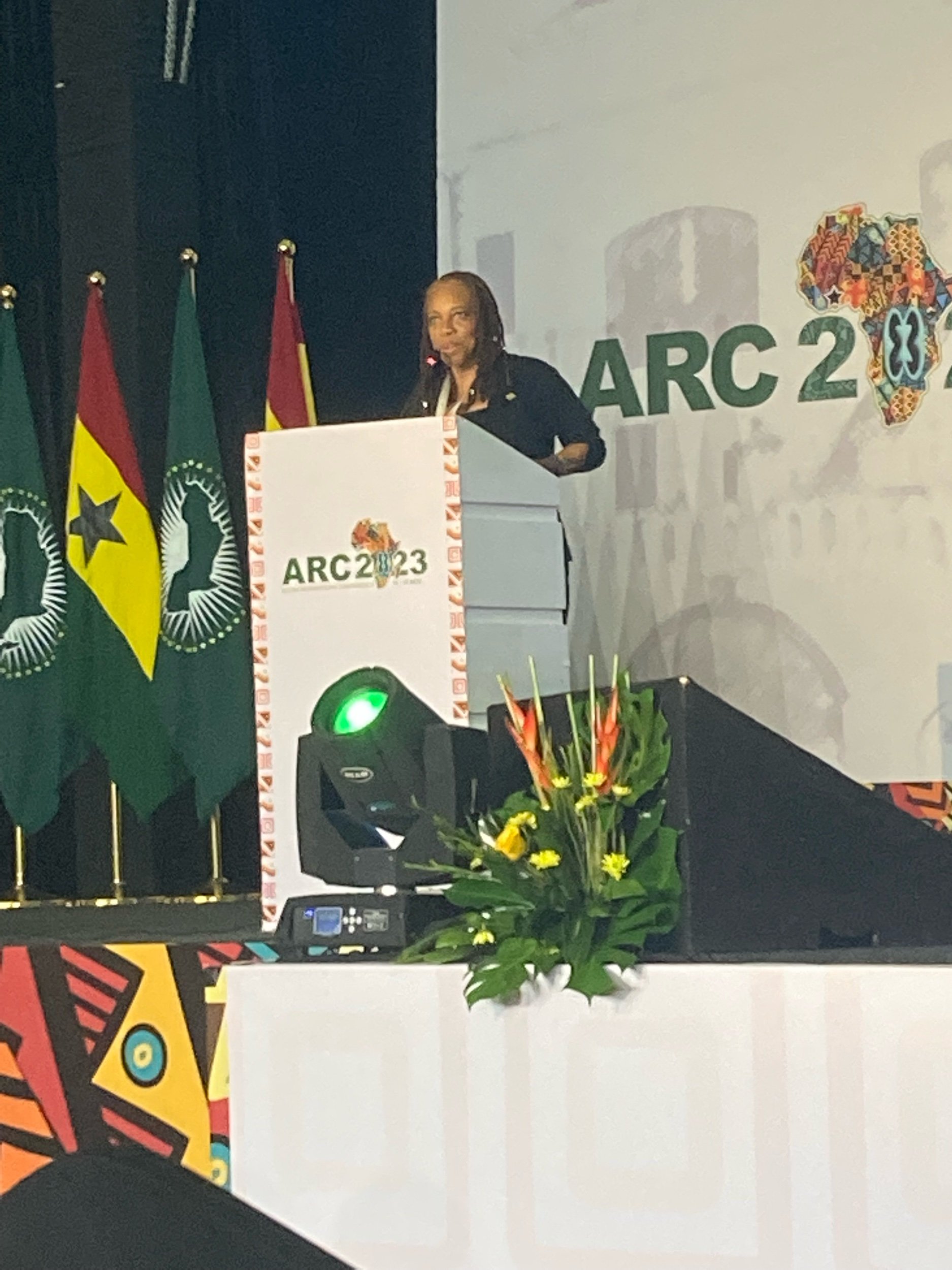
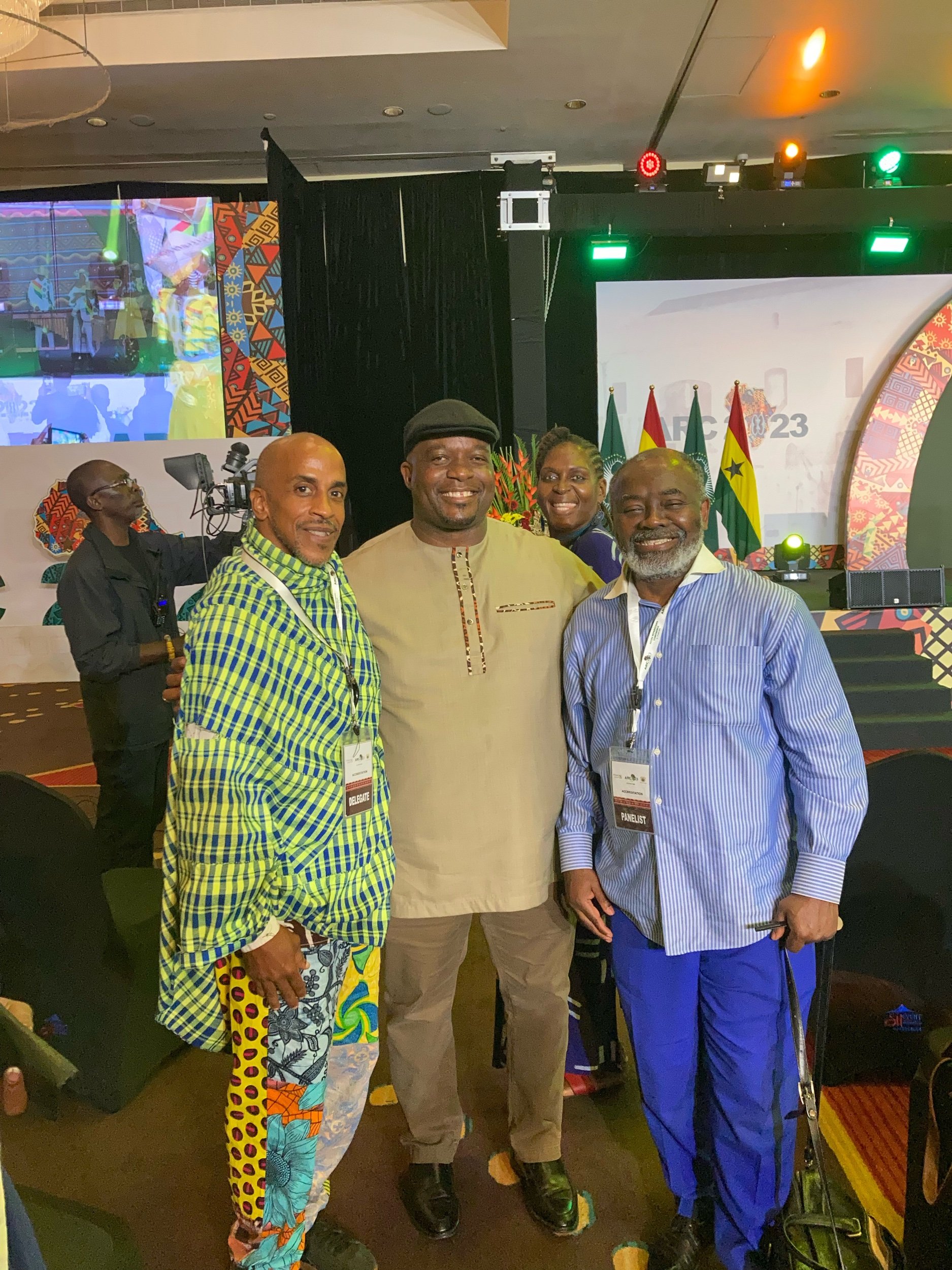
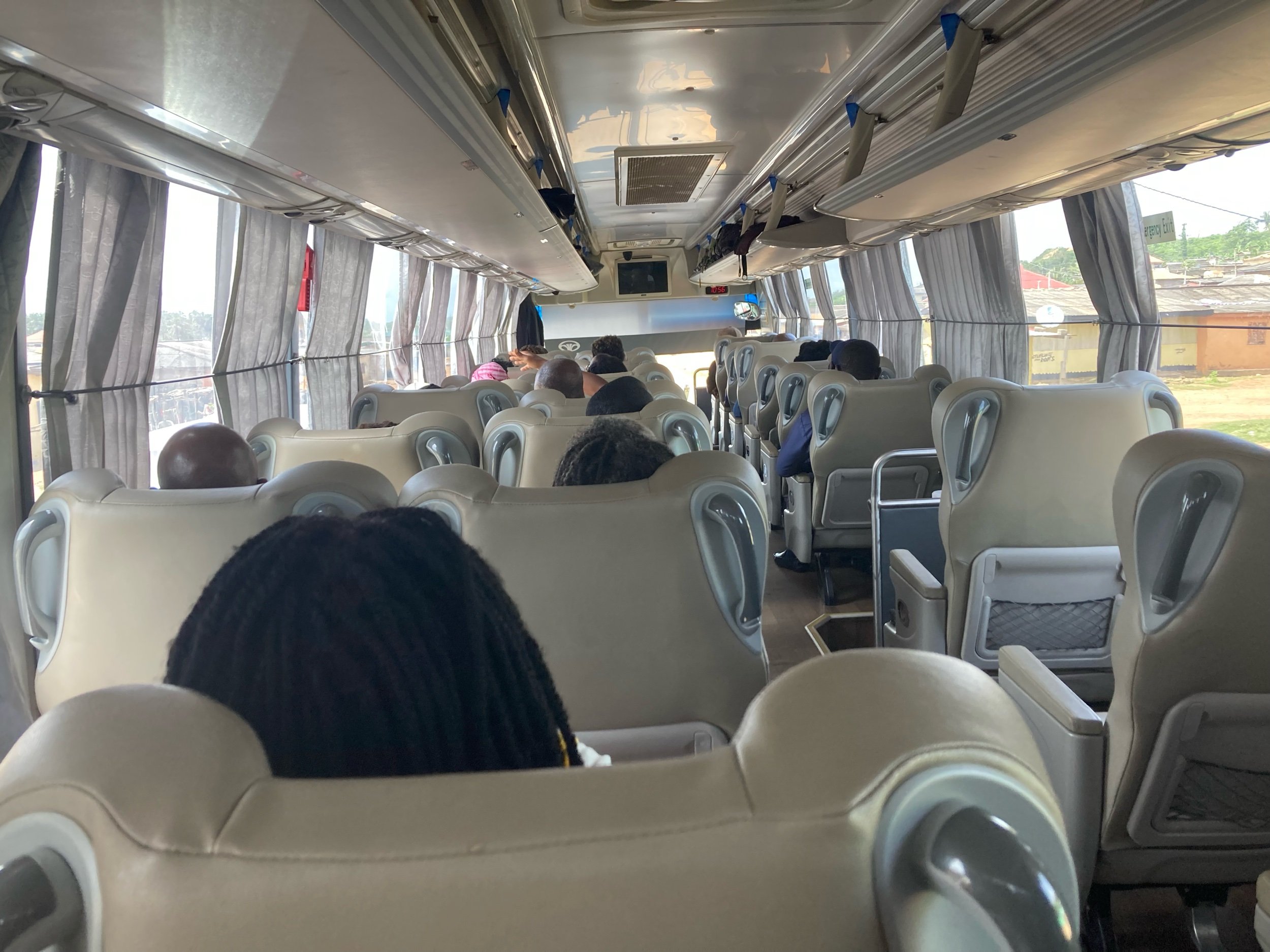
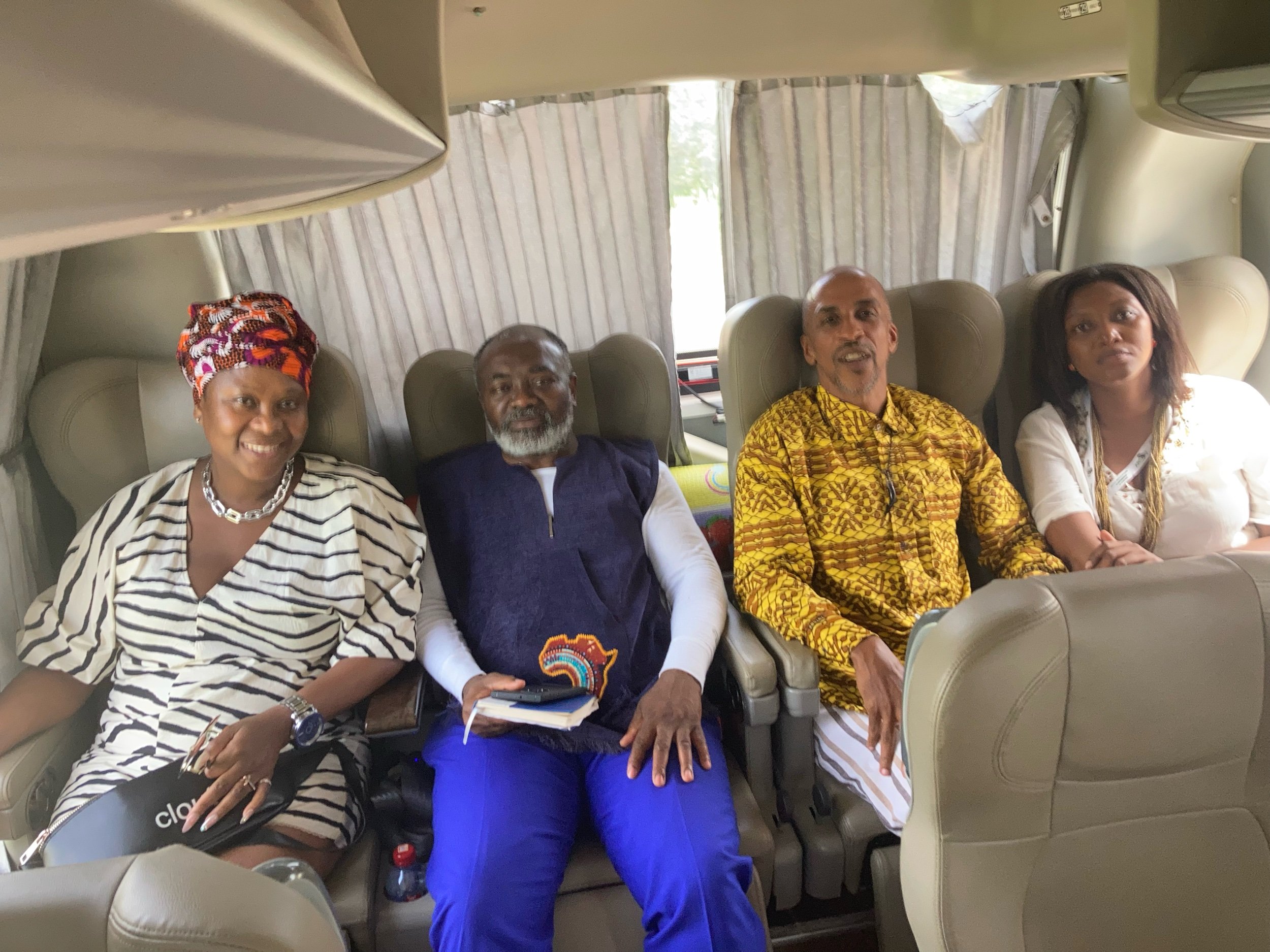
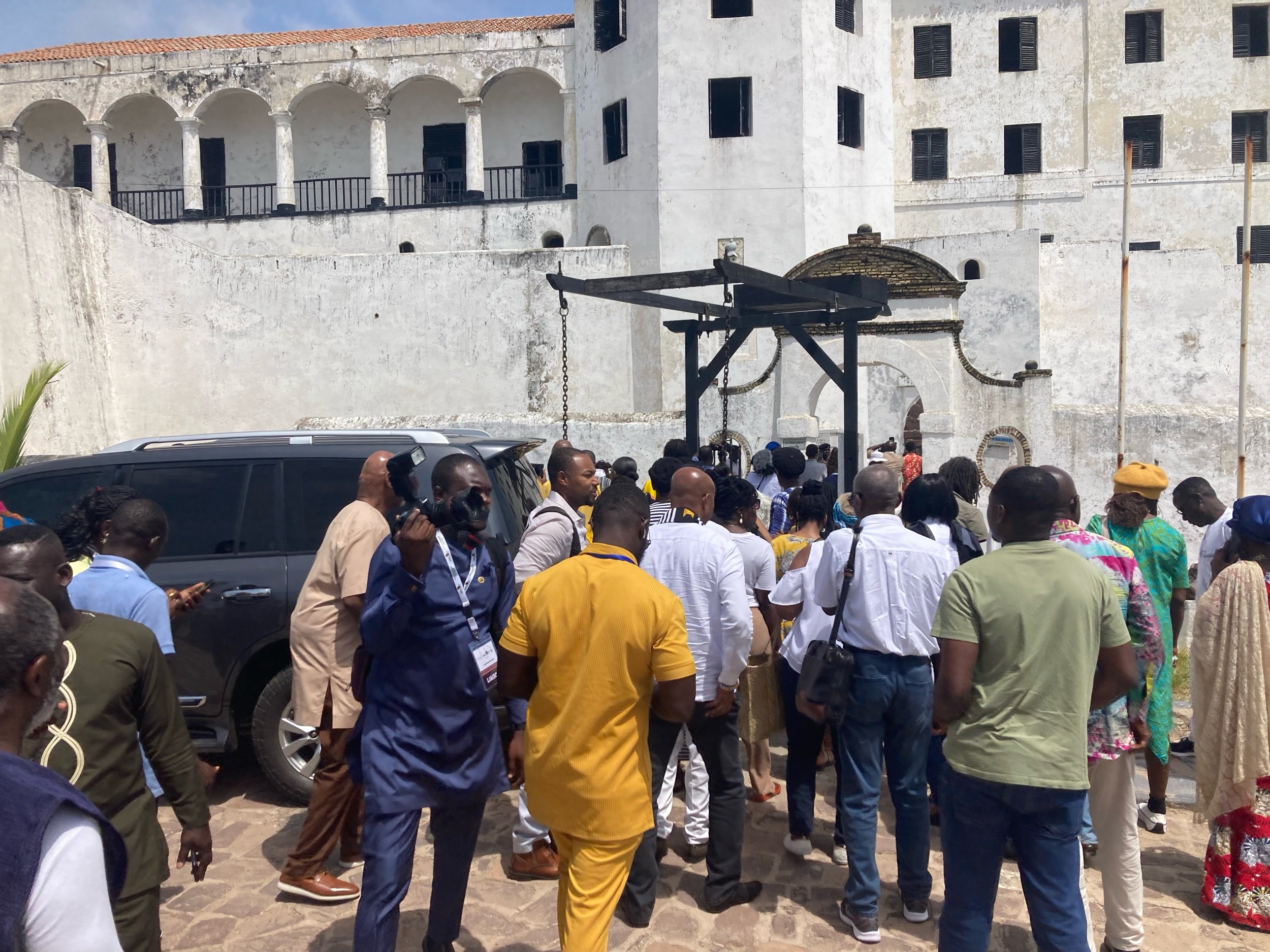
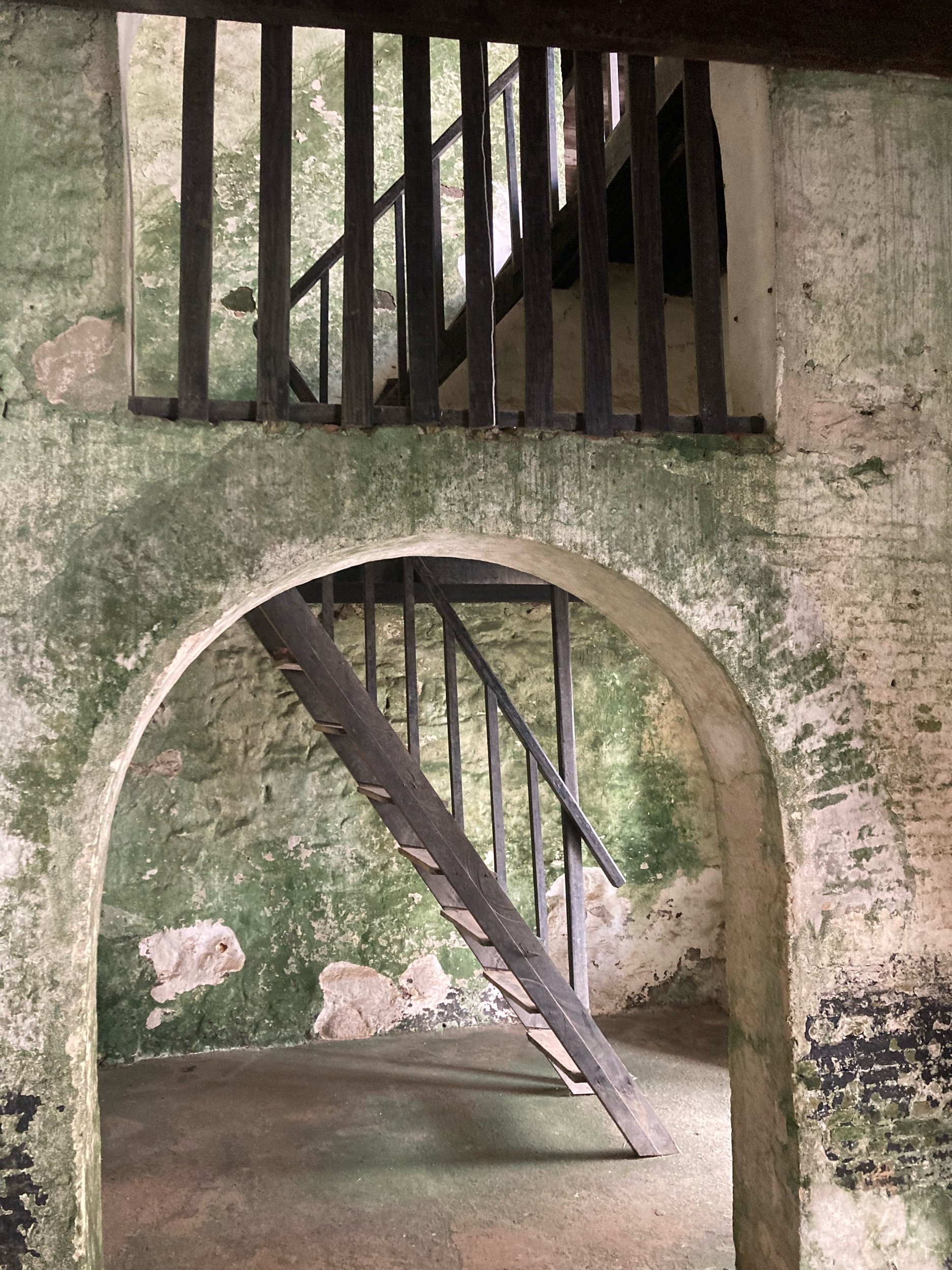
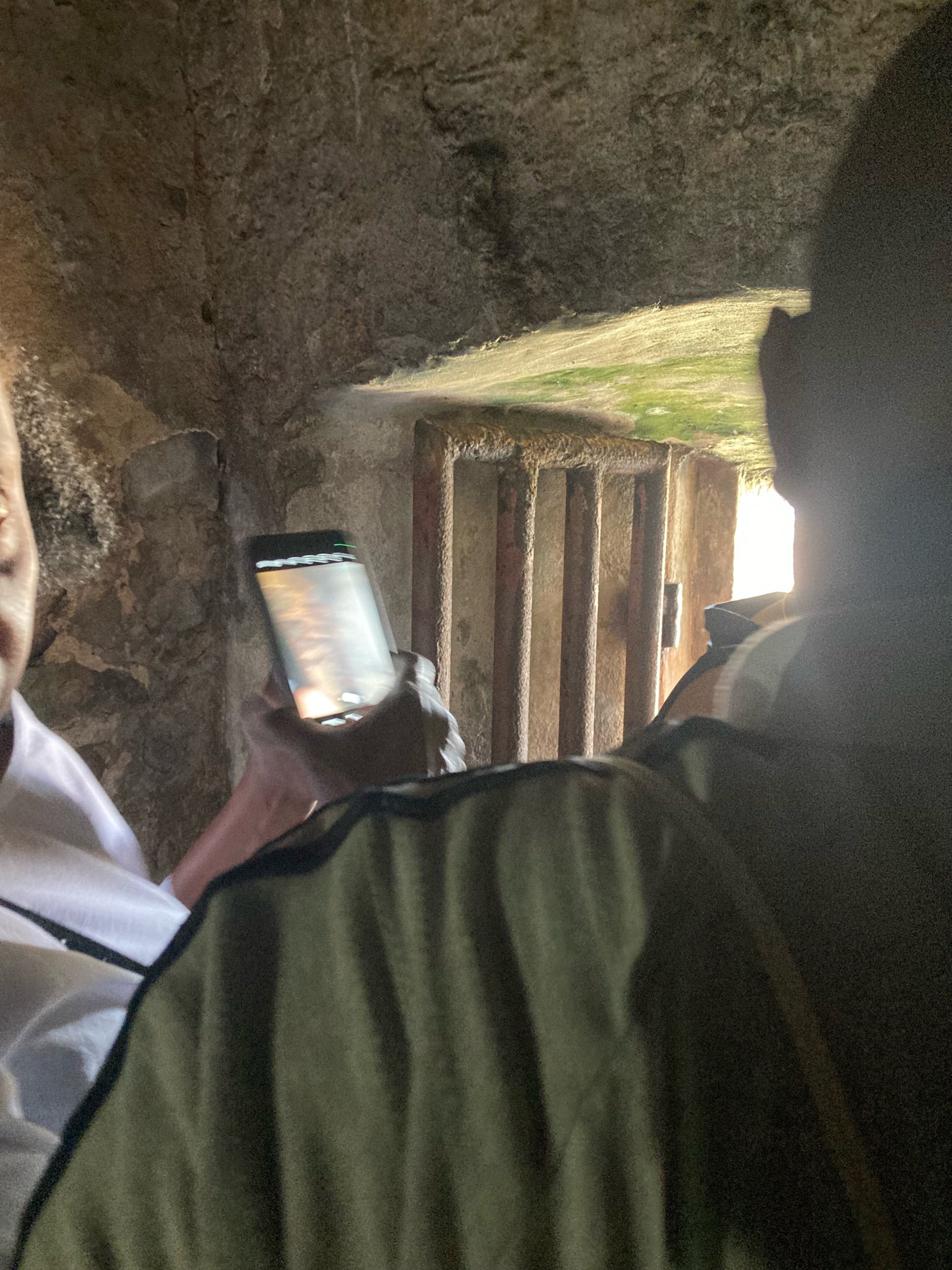
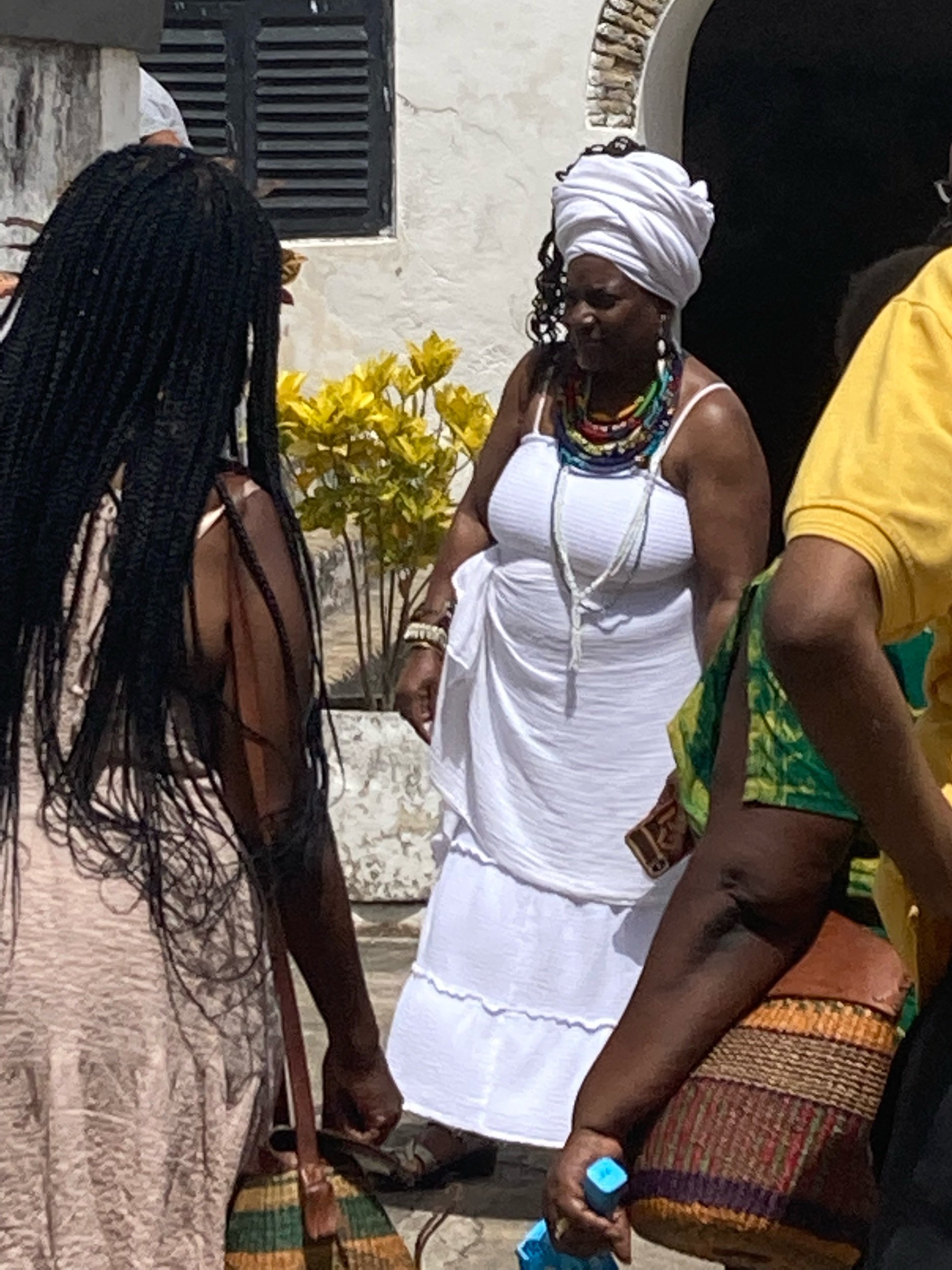
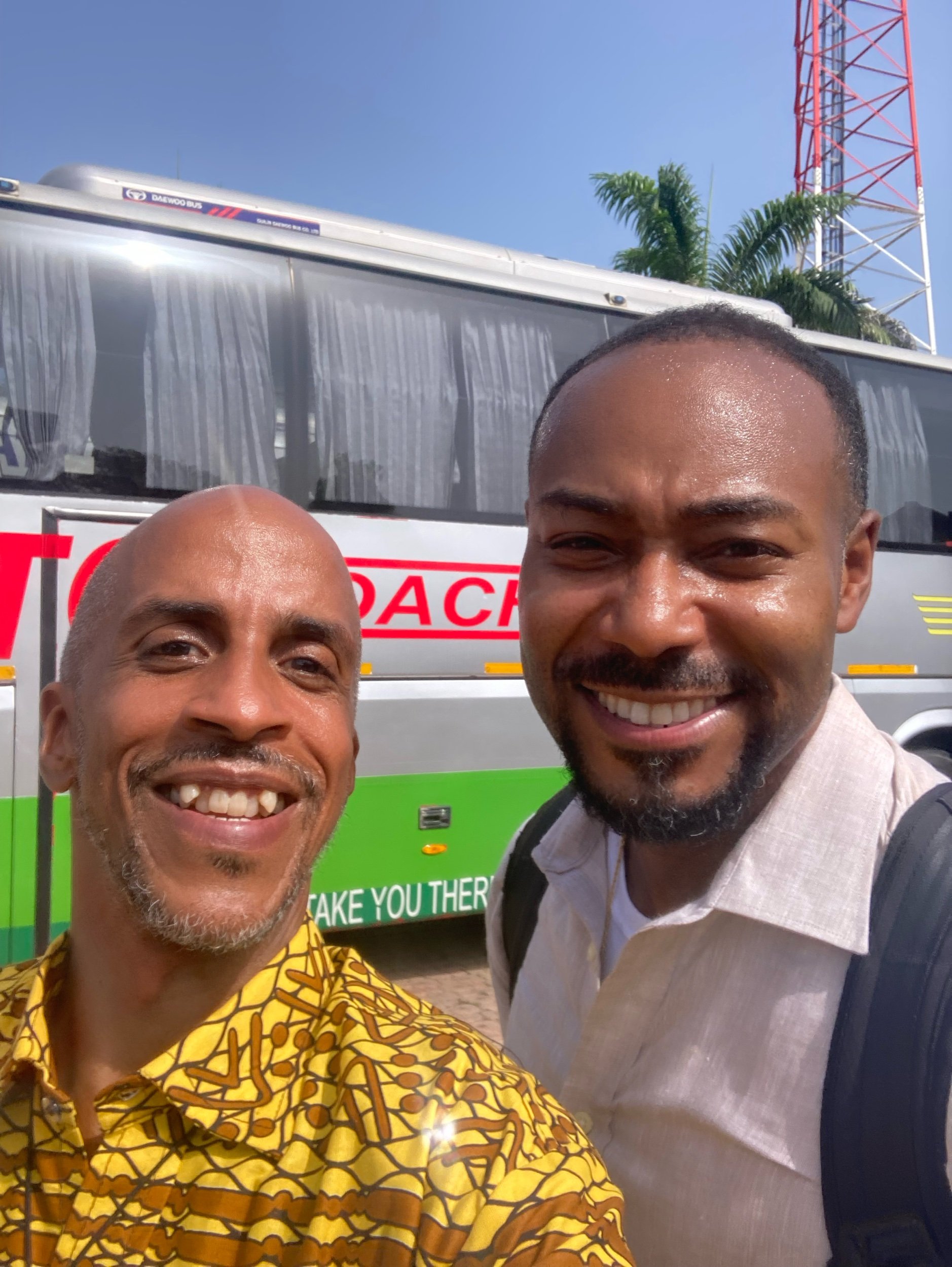
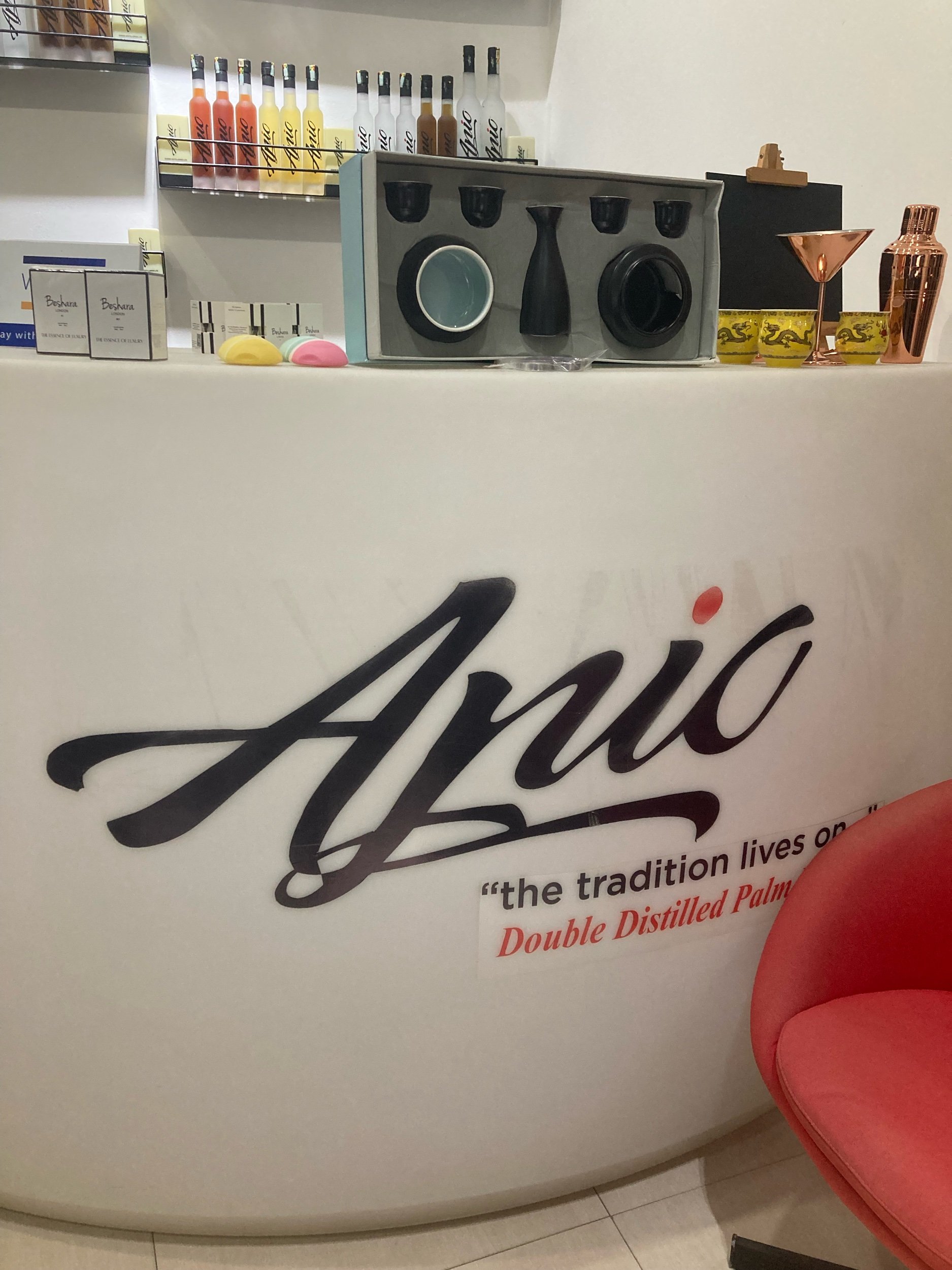
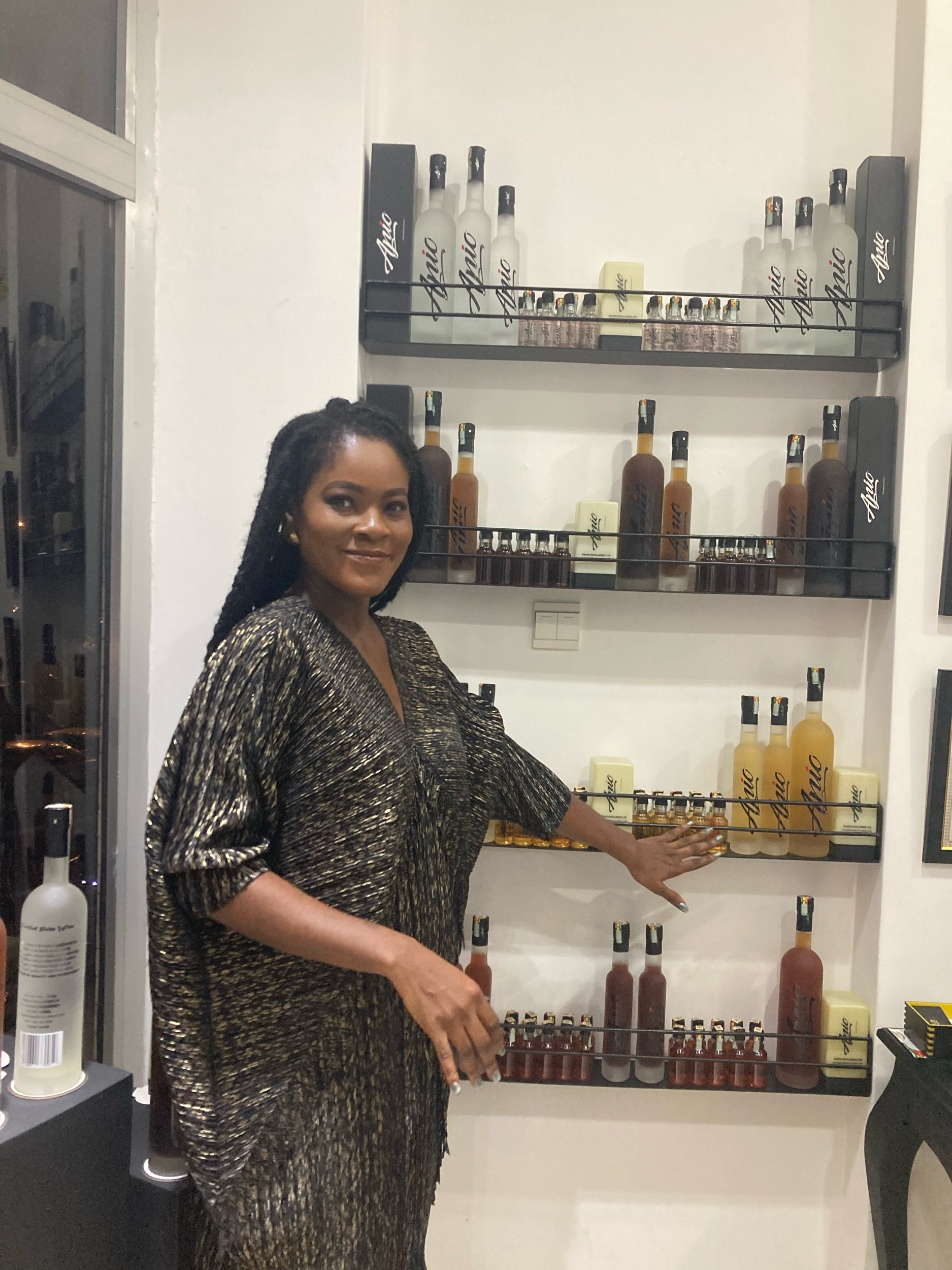
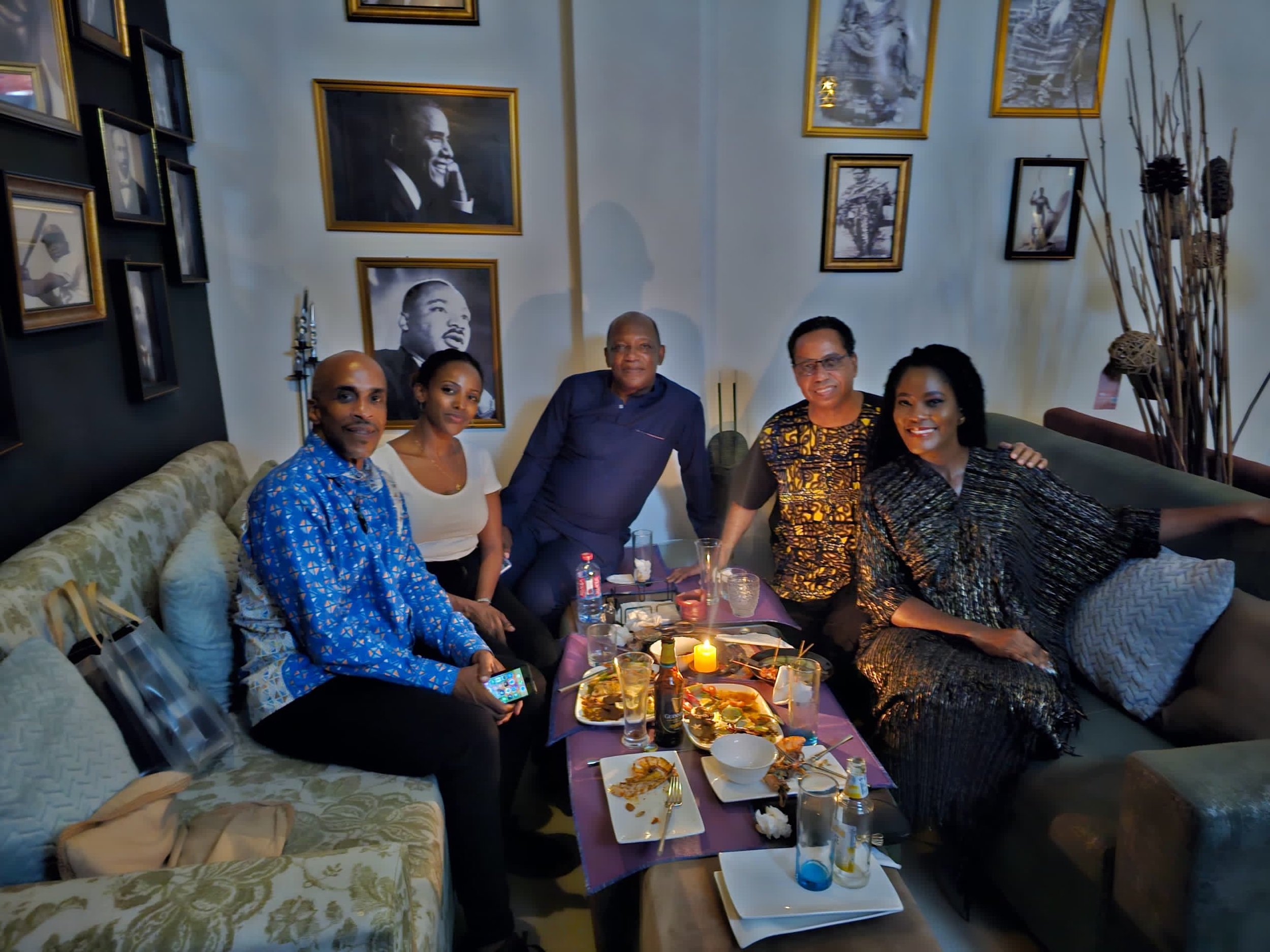
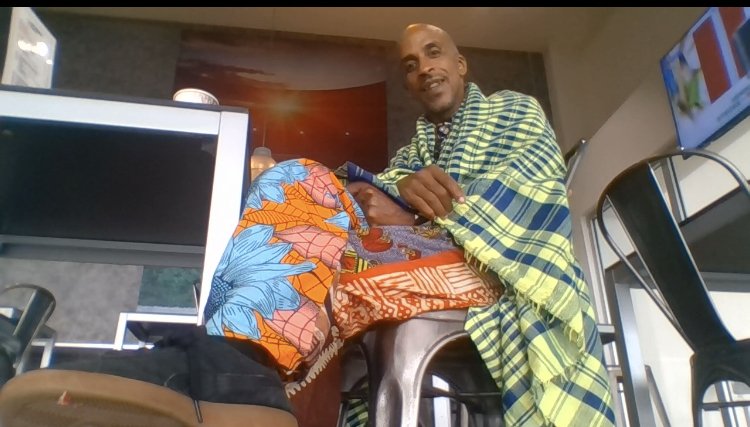
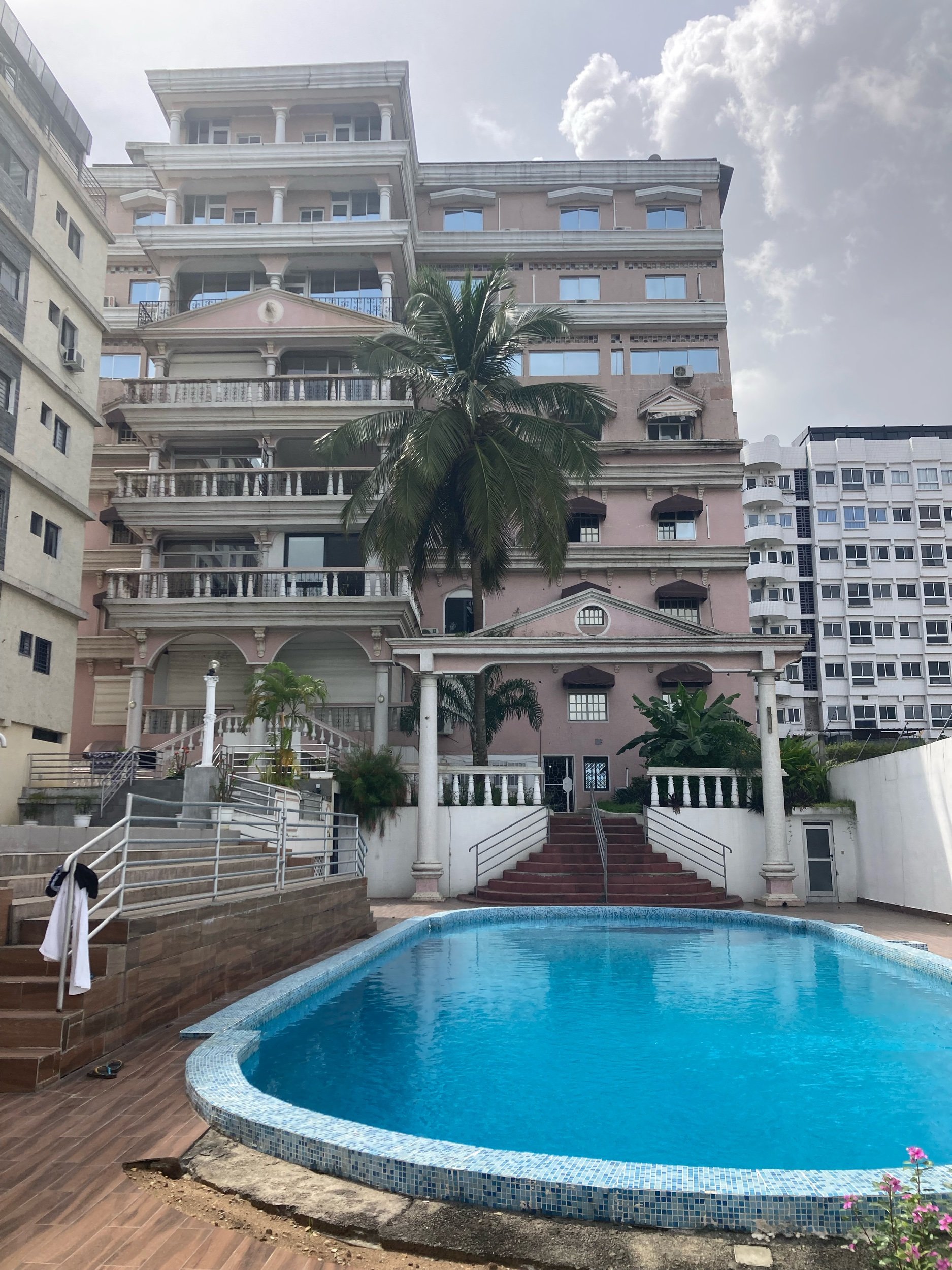
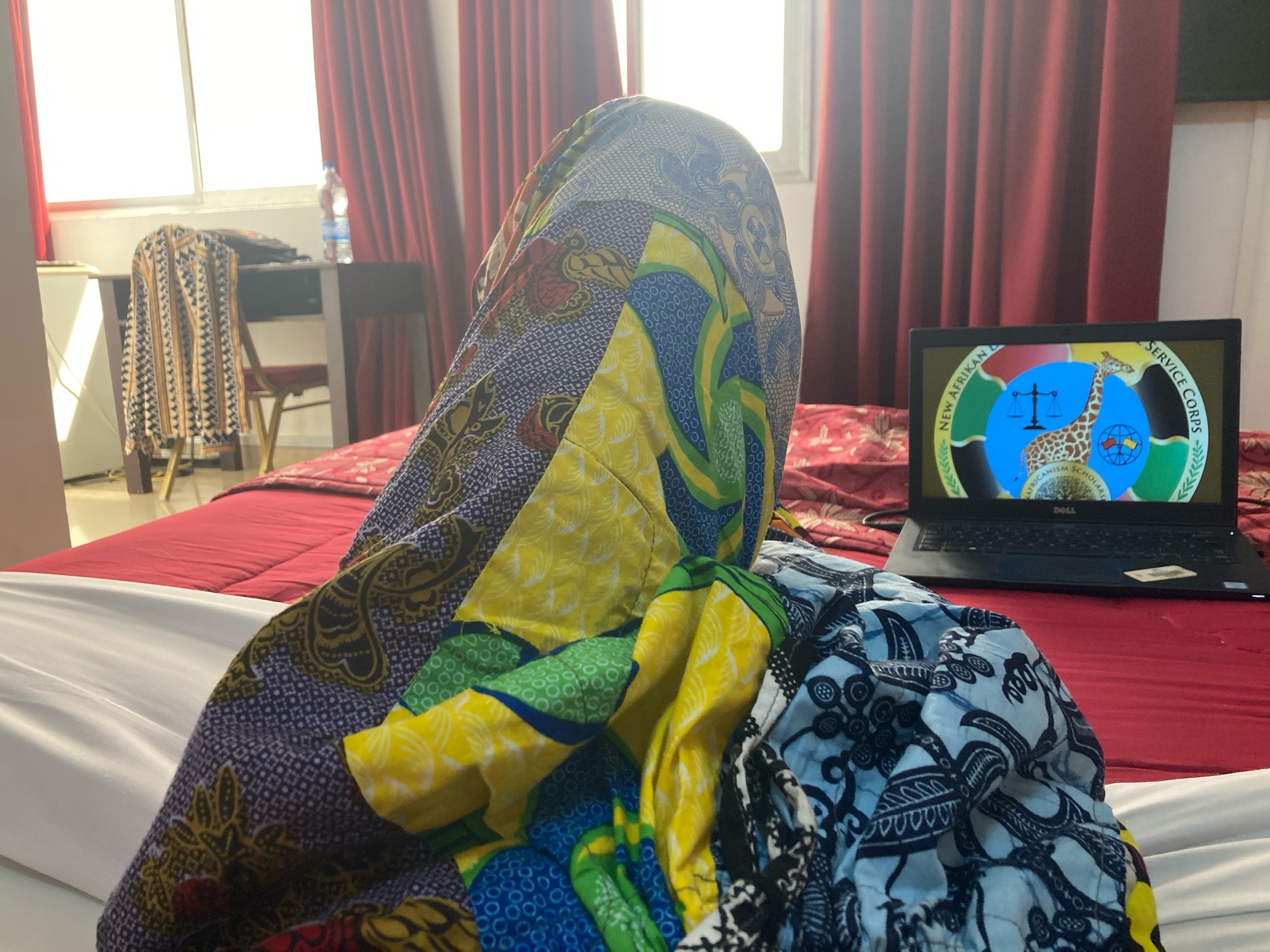
On Monday, November 13th, I was invited to the official banquet opening the Accra Reparations Conference. Here is H.E. Nana Addo Dankwa Akufo-Addo, President of Ghana, speech at the gala affair:
Here is the video from the first day of the Accra Reparations Conference
DAY 3 OF THE ACCRA REPARATIONS CONFERENCE
(I’m still looking for video from Day 2)
In my notes from the first day, I wrote,
“Africa must first set the exampe of justice and reparations by having a comprehensive “Right of Return” policy that established a unique immigration status for DNA-tested and identified people of African descent (descendants of prisoners of war) that grants citizenship without qualification or fees. Until Africa has such an open citizenship and naturalization Right of Return law, it is in no position to expect European nations to fulfull their obligations - moral, historic, legal and economic.” Here is an example of a Right to Return proclamation for legislation that we have presented to the new administration in Guinea Bissau.








Now, when it is said, “these crimes ….. or crimes against humanity……” WE should say “THIS WAR RESULTING IN WAR CRIMES AGAINST PEOPLE FROM AFRICA.” Which is more devasting, a crime or a war? We natural give more “weight” to a victim of “war” than we do to a victim of a mere “crime”. When speaking of our experience, We must refer to the war and name it. This was illustrated, somewhat embarrisingly, during Dr. Julius Garvey’s presentation. Dr. Garvey was making a point about the enormity of the lost African lives during the period from the late 1400’s to the mid 1800’s. Dr. Garvey mentioned the tens of millions of deaths in World War 1, the tens of millions more in World War II, the lives lost during the Korean War, the Iraq and Afghanistan War, the War in Ukraine….. And then, we Dr. Garvey sought to contrast that with the over 100 million Africans who died, he incongruously referred to the “SLAVE TRADE”. Perhaps I was the only one who caught it and was taken aback. Why are all the other references to WARS and yet the reference to our experience of losing more than 100 million people is to the benign slave TRADE……???? We do an injustice to our own cause by accepting the colonial narrative used to mask the true nature of what happened, diminishing the horrors of war and reducing them to the gentle “trade”…..
Prof Hilary Beckles, the leader of the CARICOM Reparations Commission makes this exact point in his speech “The Age of Terror: Europe and the Trade in Africans in West Africa,” given 3-2-2023. Professor Beckles repeatedly states,
"We also know that this military engagement in Africa began as a search for gold. And shifting from gold trade to the kidnapping of enchained labor. That was the enormity of this military complex that was unleashed upon the indigenous people of Africa . . . In Europe the royal families were the principle investors in these military operations. . . . The British Royal African Country had the full might of the British army and navy behind them. No West African government had the military capacity to withstand the military onslaught of these companies. These companies built forts along the coast of West Africa from Senne Gambia to Congo. . . . These corporations, and I have to emphasize this for people who have not been effectively exposed, there is a belief which you will find from observing movies and Hollywood type images, that slave traders were just a group of random individuals who took a small ships went out and randomly grabbed people and took them down the river and put them on a boat. You are looking at the most highly organized commercial military complex at this time. These corporations had dozens and dozens of ships, and thousands of soldiers in West africa on the coast to protect the storage and the shipment. They were Highly militarized with the latest military technology with the guns and the cannons and they were able to penetrate deeply into Africa with this military capacity. The Wealth that they accumulated, which was in the first instance the monopoly wealth of the royal families, eventually tricked down to the private sector, when they were given free access and down to the banks. The Bank of England was established in 1694 to help to finance the slave trade. All of the wealth coming back into England, going to the royal family and aristocracies that money had to be converted into investment capital . And so the Bank Of England was created . . . ."
Professor Beckles, like Dr. Garvey, goes as far as emphasizing the scale of the atrocity but failes to name the war! In my conference notes, I wrote,
“We talk about the abolition of the slave trade. . . . We give dates, documents, etc. But what about the beginning of the ‘slave trade’? How come nobody except myself mentions that it started on June 18, 1452 with a declaration of total war that resulted in a military invasion and the capturing of prisoners of wary?”
And it should be pointed out that Unlike genocide and war crimes, which have been widely recognized and prohibited in international criminal law since the establishment of the Nuremberg principles, 𝐭𝐡𝐞𝐫𝐞 𝐡𝐚𝐬 𝐧𝐞𝐯𝐞𝐫 𝐛𝐞𝐞𝐧 𝐚 𝐜𝐨𝐦𝐩𝐫𝐞𝐡𝐞𝐧𝐬𝐢𝐯𝐞 𝐜𝐨𝐧𝐯𝐞𝐧𝐭𝐢𝐨𝐧 𝐨𝐧 𝐜𝐫𝐢𝐦𝐞𝐬 𝐚𝐠𝐚𝐢𝐧𝐬𝐭 𝐡𝐮𝐦𝐚𝐧𝐢𝐭𝐲, even though such crimes are continuously perpetrated worldwide in numerous conflicts and crises.
And this underscores why I took to the floor to educate the Conference on the truth: what we erroneously and ignorantly call the “trans Atlantic SLAVE TRADE” was actually the result of a declaration of war issued by Pope Nicholas V on June 18, 1452 know as the Dum Diversas Apostolic Edict which stated,
“we grant to you full and free power, through the Apostolic authority by this edict, to invade, conquer, fight, subjugate the Saracens and pagans, and other infidels and other enemies of Christ, and wherever established their Kingdoms, Duchies, Royal Palaces, Principalities and other dominions, lands, places, estates, camps and any other possessions, mobile and immobile goods found in all these places and held in whatever name, and held and possessed by the same Saracens, Pagans, infidels, and the enemies of Christ, also realms, duchies, royal palaces, principalities and other dominions, lands, places, estates, camps, possessions of the king or prince or of the kings or princes,
AND TO LEAD THEIR PERSONS IN PERPETUAL SERVITUDE, AND TO APPLY AND APPROPRIATE REALMS, DUCHIES, ROYAL PALACES, PRINCIPALITIES AND OTHER DOMINIONS, POSSESSIONS AND GOODS OF THIS KIND TO YOU AND YOUR USE AND YOUR SUCCESSORS THE KINGS OF PORTUGAL.”
It is important, as this conference aims to move us forward towards “Building a United Front to Advance the Cause of Justice and the Payment of Reparations to Africa” that we emphatically begin our narrative and claim with the Dum Diversas as the starting point instead of 1619 as H.E. Nana Addo Dankwa Akufo-Addo, President of Ghana unfortunately did during his opening statement to the Conference. This makes legal strategic sense, too, since 𝐭𝐡𝐞𝐫𝐞 𝐡𝐚𝐬 𝐧𝐞𝐯𝐞𝐫 𝐛𝐞𝐞𝐧 𝐚 𝐜𝐨𝐦𝐩𝐫𝐞𝐡𝐞𝐧𝐬𝐢𝐯𝐞 𝐜𝐨𝐧𝐯𝐞𝐧𝐭𝐢𝐨𝐧 𝐨𝐧 𝐜𝐫𝐢𝐦𝐞𝐬 𝐚𝐠𝐚𝐢𝐧𝐬𝐭 𝐡𝐮𝐦𝐚𝐧𝐢𝐭𝐲 Establishing Africa’s reparation claim on the foundation of “war crimes” has a solid, stronger legal foundation. Indeed, this is the answer to Brian Kagoro’s question that he posed in his opening remarks. Mr. Kagoro stated,
“The Fundamental Question: Is the black body worthy of repair? What is the legal basis…..?”
And this leads to the question, who is Brian Kagoro and why is he important? Why did he give a keynote address at both the Opening and Closing of the Accra Reparations Conference? Why is he giving keynote addressess all over the place????
Siphiwe Baleka, President of the Balanta B’urassa History and Genealogy Society in America and Brian Kagoro, Programme Support Division Director of the Africa Regional Office (AfRO) of the Open Society Foundations (OSF).
According to the Yale Jackson School of Global Affairs,
“Brian Kagoro is the Programme Support Division Director of the Africa Regional Office (AfRO) of the Open Society Foundations (OSF). Prior to that he was Founder and Executive Director of UHAI Africa Group, a governance and development consulting firm with operations in Johannesburg, Harare, and Nairobi. Brian is a Pan Africanist and a constitutional and economic relations lawyer.
Prior to establishing UHAI Africa Group, Brian was the Regional Programme Advisor for the United Nations Development Program (UNDP) Africa Governance and Public Administration Program, where he also led the UNDP Africa Governance Team within the Regional Service Centre for Africa. Prior to joining the UNDP, Brian served as Pan African Head of Policy and Advocacy at Action Aid International. Prior to joining Action Aid, Brian was a Partner at Law at Kantor & Immerman Legal Practitioners in Zimbabwe, where he also served on various Corporate and civil society Boards.
Now, it is important to understand that it was the Open Society Foundation that financed the Barbados’ Study Tour our of which came this Accra Reparations Conference, also financed by the Open Society Foundation. It is said that “The Open Society Foundations champions the search for bold, democratic solutions to our urgent, common challenges that advance justice, equity, and human dignity.” According to the Open Society Foundation website, “George Soros began his philanthropic work in Africa in 1979. Today, Open Society–Africa works on democratic governance, economic advancement, and a host of other issues across the continent.” In 2022, OSF expenditures in Africa totaled $112.5 million, 8.5% of its global budget. Here is the OSF Leadership:
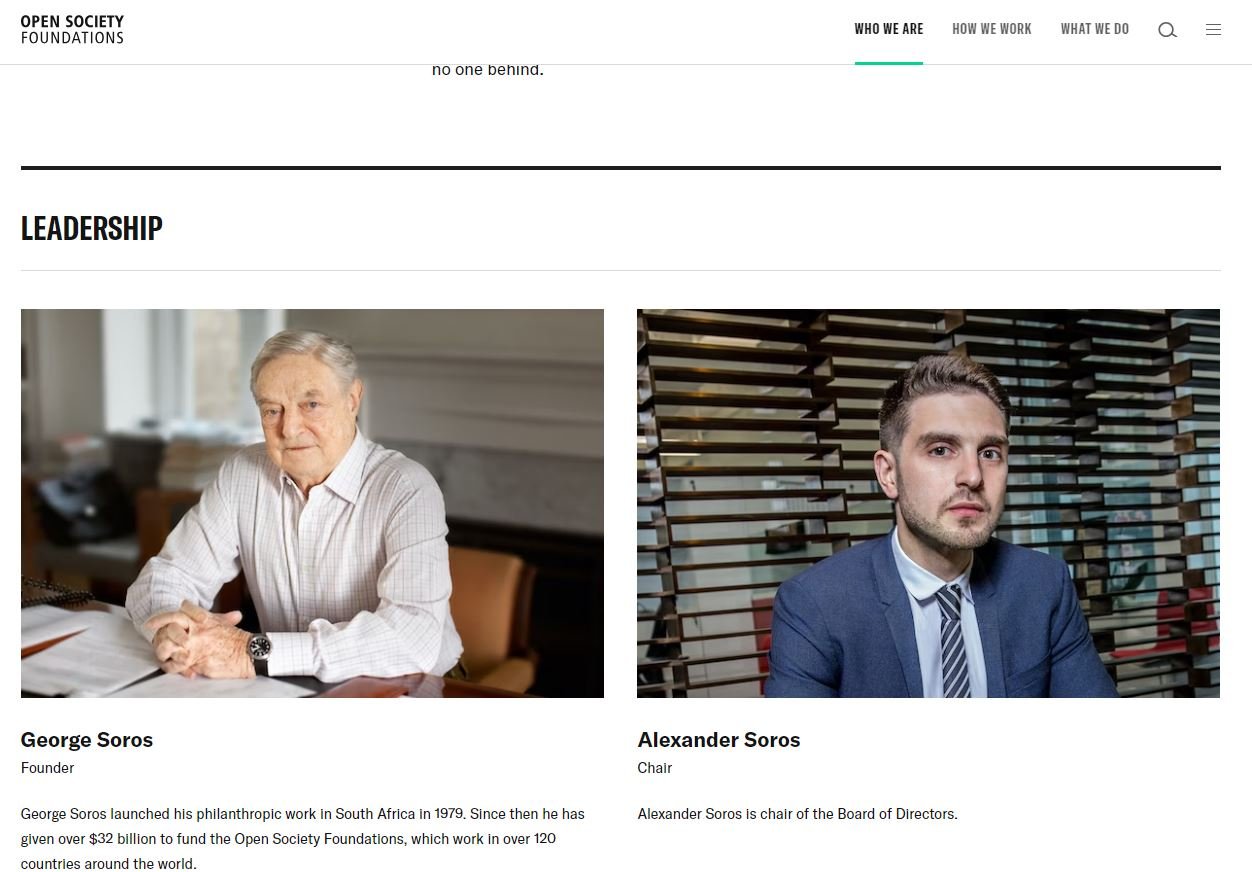
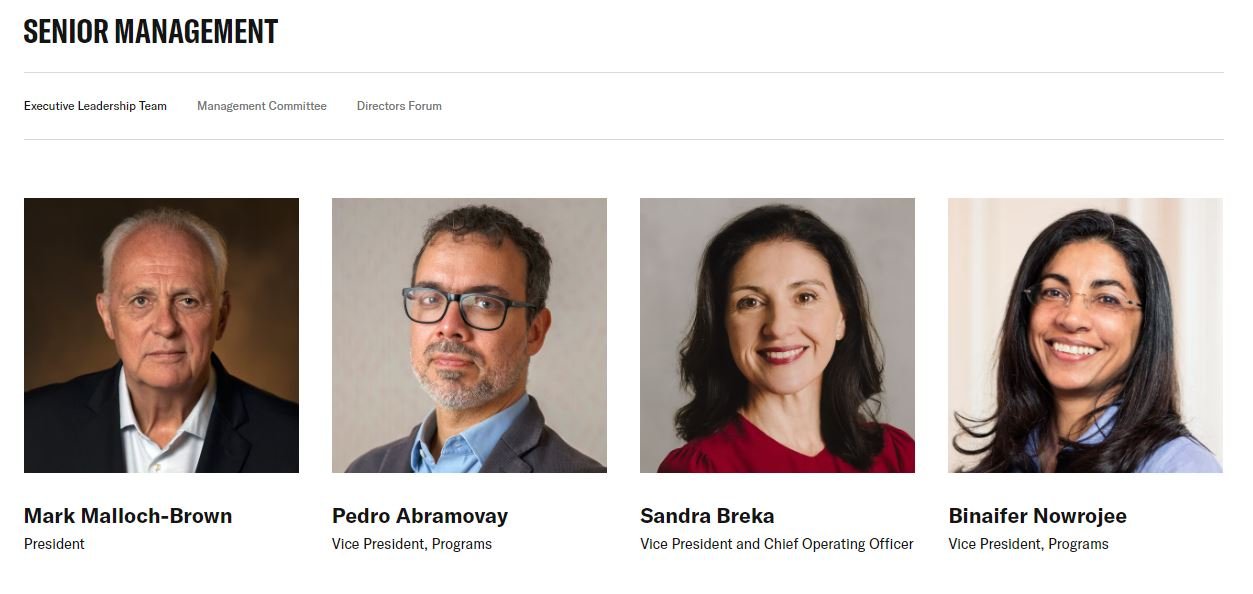
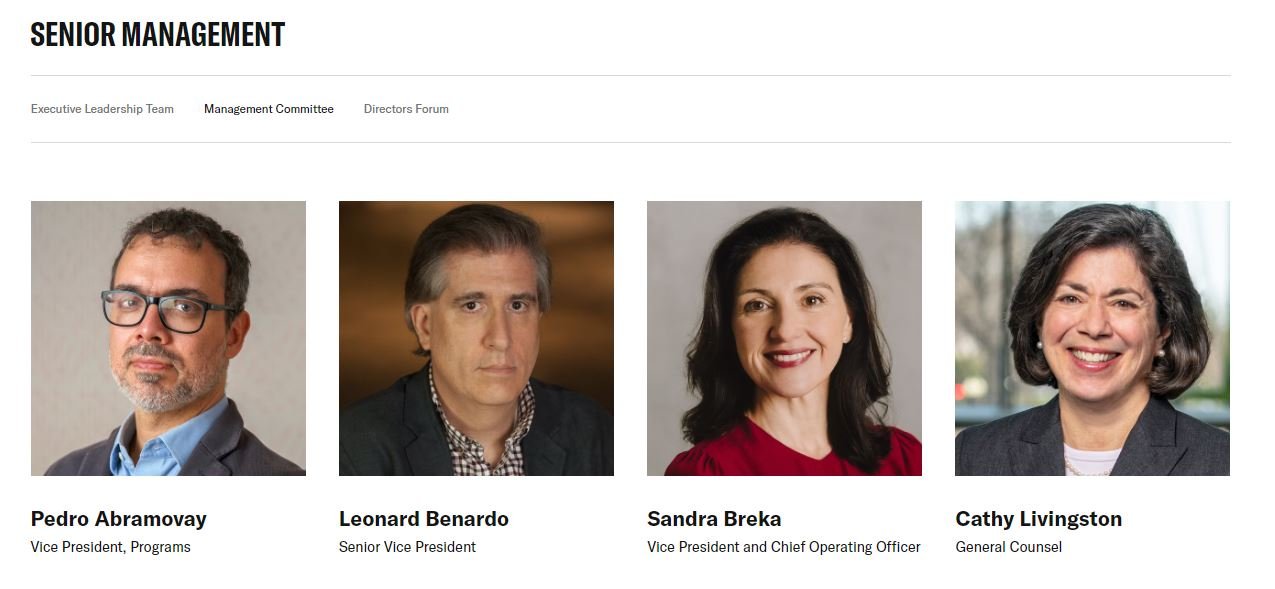
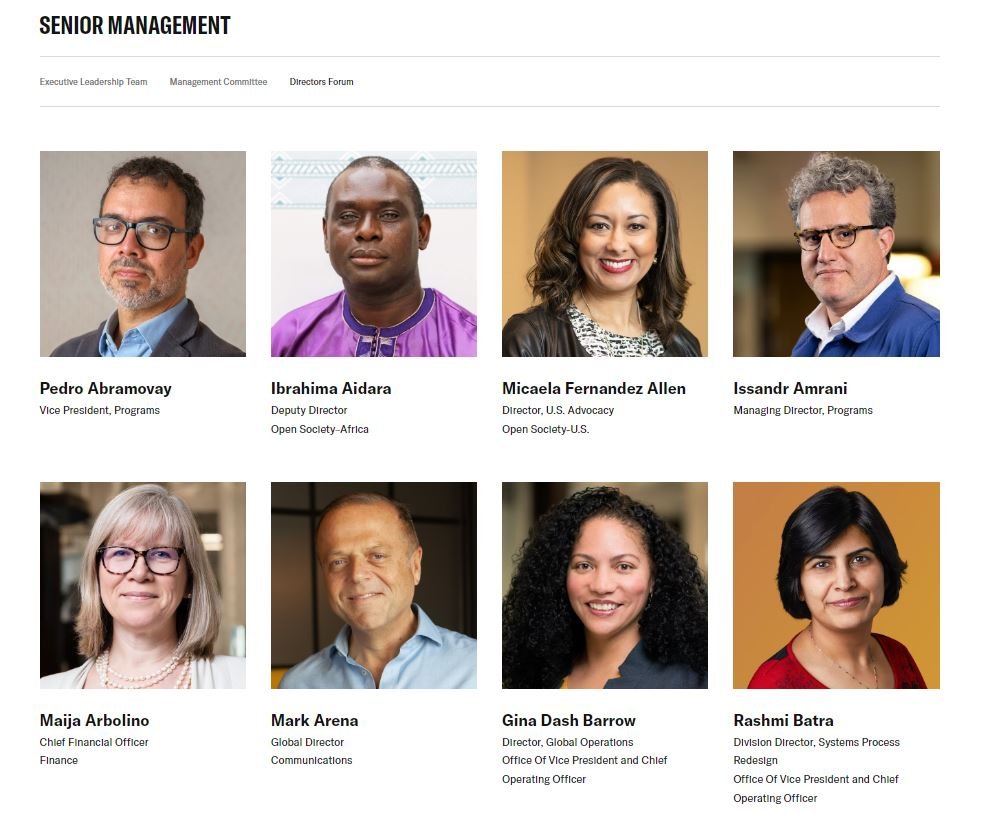
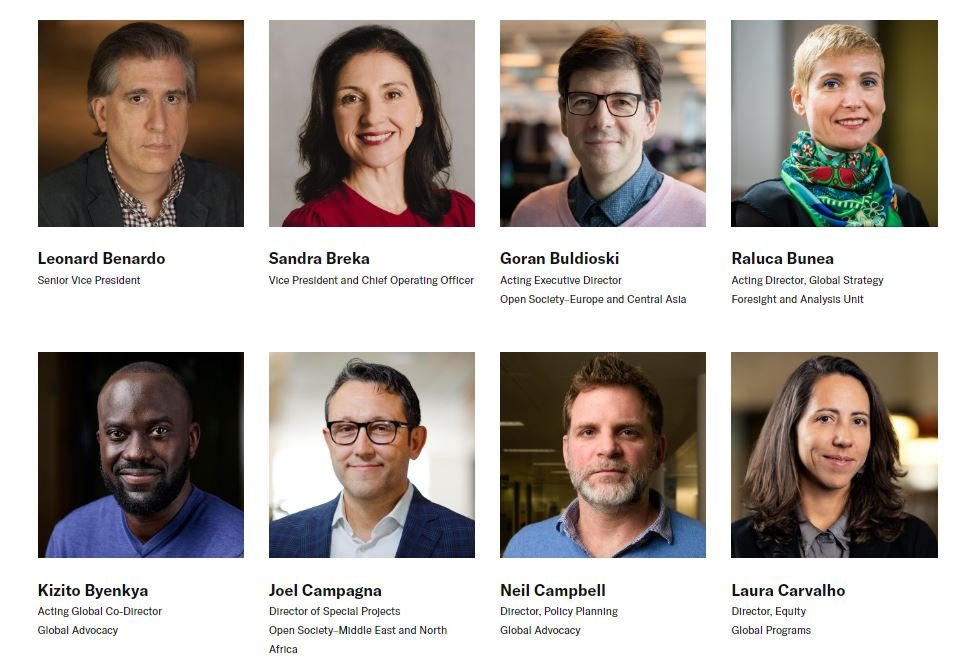
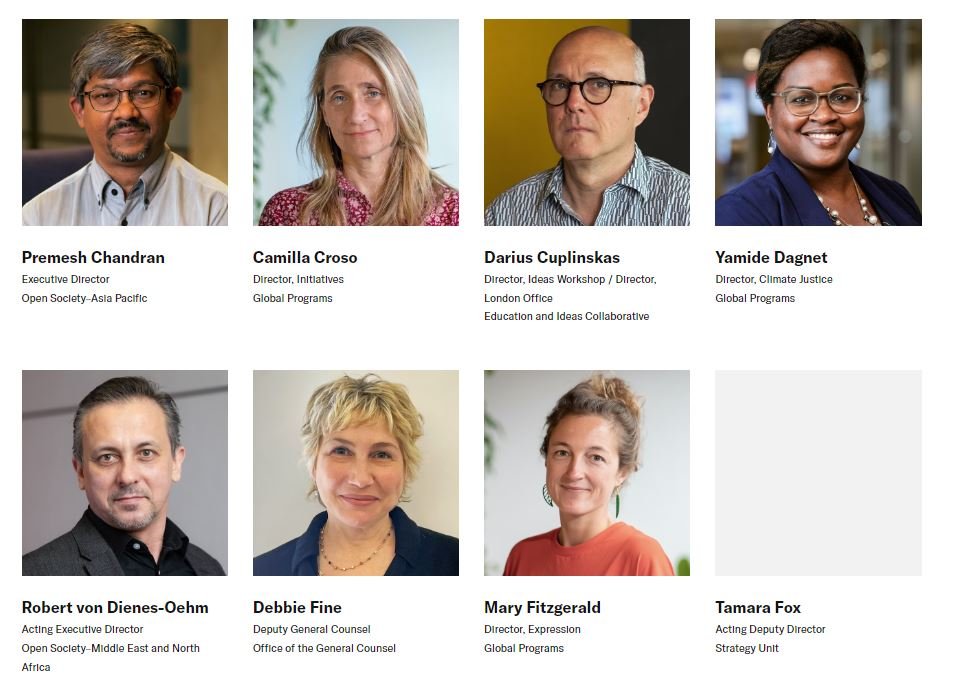
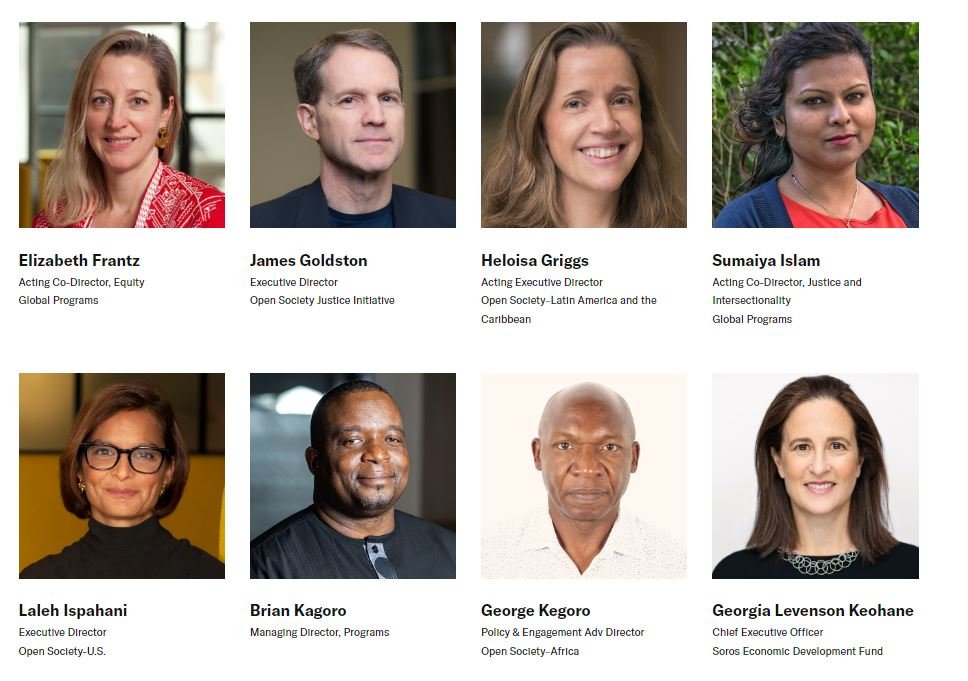
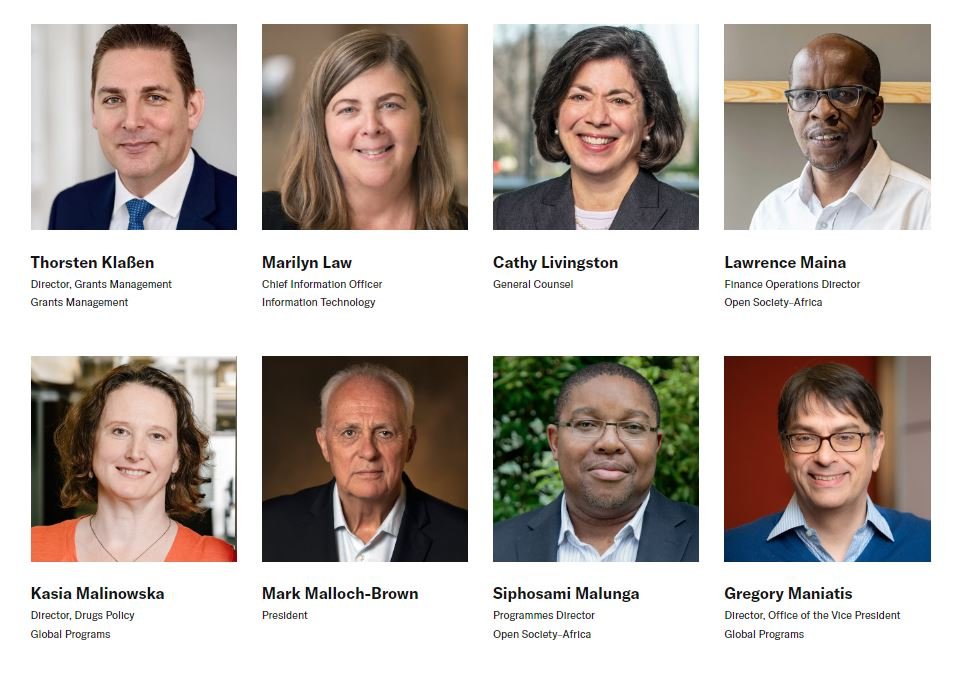
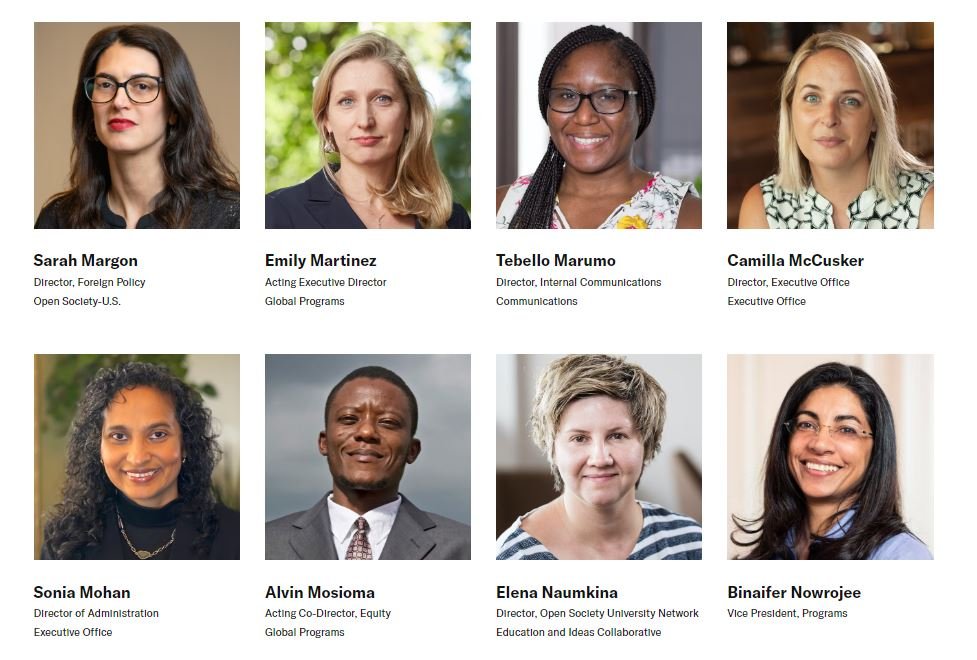
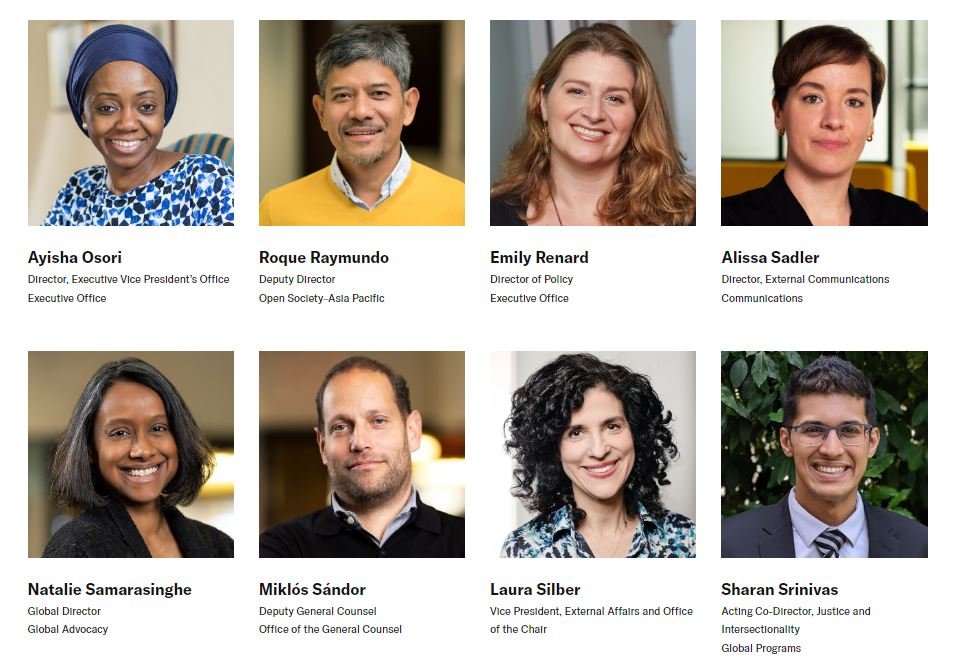
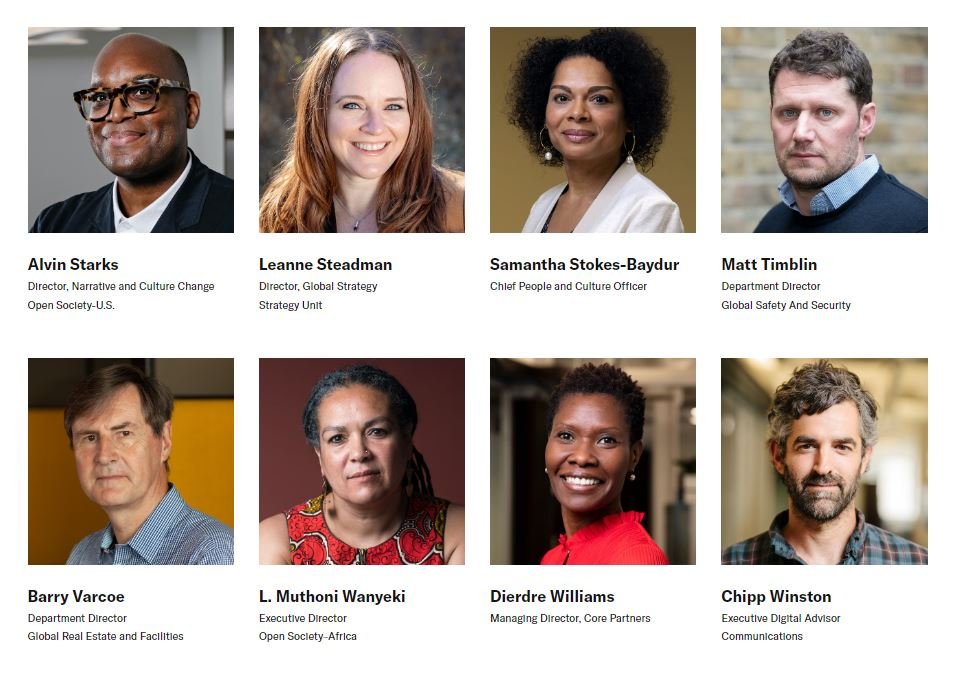
So Brian Kagoro is financed and supported by the OSF and this can partly explain his presence at the Accra Reparations Conference and eslewhere.
Prior to coming to Accra, I had never heard of Brian Kagoro. Recently he went viral for this video:
At the conference, I found all of Mr. Kagoro’s words to be “on point”. Immediately I traded contacts and began sharing messages and documents via WhatsApp. In particular, I found this quote very pertinent and shared it in a WhatsApp group:
Watch this excellent and bold speech Brian Kagoro gave at the 8th East African Philanthropic Conference: https://youtu.be/3pZ0E701Cq8?si=nOFadZUNSZ-lB-DB
However, to my surprise, I started receiving messages cautioning me to be careful of uplifing Mr. Kagoro because of perceived contradictions from his past in Zimbabwe. Another video posted by Rutendo Matinyarare was also going viral:
Apparently, Mr. Kagoro was being accused of collaborating with the West, especially the United States, in bringing sanctions against Zimbabwe and her people, in order to help the political opposition win an election. So I didn’t know what to think….. We talk about traitors, neocolonialists, elite capture, etc., but nobody raises their hand to identify themselves as one of them. So how are we to know?
So I just decided to ask Brian Kagoro himself about it. Let him explain himself.
Below is the paper Mr. Kagoro asked me to read stating his position back in 2010. From reading it and watching a few videos, my understanding is the Mr. Kagoro was taking a principled stand against impunity in Zimbabwe, and specifically against the constitutional provisions that would have allowed Mugabe (and others) to remain as President for life and also would make government officials immune from criminal prosecution. On that I have no problem and in no one does it serve as a kind of Pan African Contradiction. What is troubling to many, however, is that if he did, in fact, collaborate with the US in calling for sanctions, that would be a serious contradiction to the values of Pan Africanism which demand African solutions to African problems. As of this writing, Mr. Kagoro and I have yet to speak where he can answer to this directly.
[Note: at this moment the phone rings. It’s Brian Kagoro. We speak for exactly one hour].












I confronted Brian directly with the accusation that he betrayed his people by collaborating with the west and he promptly set me straight with facts. I also challenged him on the very apparent contradiction that he, as a servant of the OSF was himself an example of the African elite serving white masters who needed to be liberatied. (Note: Brian volunteered his time and never got a salary from OSF over his four years with them. Much of his work was self-funded from his law practice) He answered these shots calmly and skillfully. I realized that the allegations being made against him are largely malicious and/or uniformed. I took ten (10) pages of notes during our conversation. Rather than go into detail about what he said, suffice it to say that I am satisfied with Brian’s position. It’s apparent to me that Brian Kagoro is suffering a similar situation that my brothe Kamm Howard suffered, as the former National Co-Chair of NCOBRA when he accepted the McArthur grant and people complained that he had “sold out”. However, like Brian, Kamm believed that the philanthropic spaces could be tapped to do liberation work without being co-opted. That’s an ongoing debate, of course, and one that I prefer to answer by removing all contradictions and relyiing on Africa and African people to liberate ourselves. But the reparations objective, is, after all, to get resources from the West that are rightfully ours. So it can be argued that philanthropic support is, in fact, micro reparations that are to be used. Brother Kamm was, in my opinion, wrongfully slandered by many who did not know the real story of what happened or why, and those people certainly did not factor Brother Kamm’s track record to give him the benefit of the doubt. At this point, Rutendo Matinyarare’s allegations about Brian Kagoro are a non-issue for me. As Brian said to me,
“The AU coing is a blessing and a challenge. The formation and composition of the African Committee of Experts on Reparations is a decision for the AU member states who will make nominations. . . . I worked to pre-empt the process. CARICOM, CIDO, activists can put together a Commission. Working Commissions can make a report to AU ECOSOCC and CIDO to be part of the process. We must not let the political class hijack it; we must not let the philanthropic class see it as purely economic, and we must not let academic class see it as a research and study project.”
This was exactly my point in the article,
WHO IS AN AFRICAN EXPERT ON REPARATIONS?
All of this speaks directly to the elite capture mentioned by Kamm Howard and others above. Indeed, Esther Stanford Xoesi, Reparationist, Jurisconsult, Community Advocate, Educator, Environmentalist & 'Ourstorian' of the International Social Movement for Afrikan Reparations (ISMAR) tweeted:
SO THE QUESTION NOW IS: HAS THE OPEN SOCIETY FOUNDATION CAPTURED THE GLOBAL AFRICAN REPARATIONS MOVEMENT (Along with the McArthur Foundation and Liberated Capital through its #Case4Reparations)?
Indeed, I asked Dr. Ron Daniels, founder of the National Afrian American Reparations Commission (NAARC), a partner of the CARICOM Reparations Commission, if he had been consulted about the Accra Reparations Conference or the membership of the proposed African Committee of Experts on Reparations. He shrugged his shoulder and said, “No.” And Kamm Howard, Director of Reparations United, explained above, and is worth mentioning again,
“The 2023 Accra Summit is the result of the 2022 Accra Summit that was held by Civil Society - in particular the group of orgs that were funded by MacArthur that later became the Global Circle for Reparations and Healing. (The group that with the help of Siphiwe, authored and delivered the Reparations Presentment to Vatican) Accra 2023 is governments and the AU. They list CARICOM as participants, not the CARICOM Reparations Commission CRC, as they would have to invited the National African American Reparations Commission. However, NAARC, unlike CAR, is civil society. The GCRH were not involved in the planning of Accra 2023 and were just recently invited - as they wanted financial contributions for our participation, which we do not have. Yet they are basing the conference on the work and outcome documents of 2022 Accra Summit, while calling the 2023 Accra Summit an inaugural conference. ‘
The other significant aspect of the Accra Reparations Conference was that it allowed for me to spend time with Gnaka Lagoke, the Coordinator for the proposed 9th Pan African Congress scheduled for 2024 in Togo. This was promoted by the South African representative on the first day of the conference and others throughout. As the Coordinator of the 8th Pan African Congress Part 1 that was called by H.E. Ambassador Arikana Chihombori-Quao and was supposed to have taken place already this year but was postponed to January of 2024 and still pending a final date, I had submitted a “harmonization” plan to bring both Pan African Congresses, along with the planned 8th Pan African Congress Part 2 that was called by the Global Pan African Movement (GPAM) to coincide with the 30th anniversary of the 7th PAC held in Kampala, Uganda in 1974. Thus, on the 4th day of the Accra Conference, I sat with Gnaka on the bus to and from the El Mina prison and discussed the harmonization plan.




















Sister Brenda, Gnaka Lagoke, Siphiwe Baleka and Hazel “The Revolutionary” on the bus to El Mina prison.
In conclusion, I captured much more in my notes as there were a lot of very powerful presentations made by panelists. I had many conversations with the CARICOM delegates, including Hilary Brown, Dorbrene O’Marde, Steve Reid, Rhoda Arindell, David Comissiong, Dr. Chenzira Kahina, Dr. Claudius Fergus and Dr. Eric Phillips. I believe I won them over as colleagues, if not necessarily to all of my positions. But getting to meet people face to face and spending time together as human beings and not intellectual combatants is becoming more important to me.
At the end of the day, what’s important is for CARICOM and the AU to demonstrate Ubuntu with the stakeholders who are not sovereign states and ensure that we all move forward together. The proposed legal committees, expert committees, etc. can not be drawn from the small click of networked folks who are part of the philanthropic cabral of reparations elites. Many of the best minds and vetran activists are un-funded and largely excluded from these kinds of gatherings. Here is where the AU’s failure on its own Diaspora initiative is glaring and bespeaks for the need of an AU 6th Region Headquarters, representatives on the AU Permanent Representatives Committee, and a governing AU 6th Region High Council.


Siphiwe Baleka, Dr. Barryl Biekman, and Dr. Eric Phillips
The next step now is for all jurists, lawyers, students enrolled in law school, professors and other legal consultants to submit their
Input on the Request for an Advisory Opinion from the International Court of Justice on the Status of Afro Descendants Under the Geneva Convention
Here is the ACCRA PROCLAMATION ON REPARATIONS that was published after the conference. It should be noted that there was no decision making process at the conference. There were no breakout session where delegates were asked to present recommendations or draft language. There was no voting on anything. Basically what happened was that a small, unknown group wrote the proclamation and it was told to the delegates that this was going to be the way forward. They gave the delegates the microphone so that they could, in a very limited way from the floor, express themselves but it should be clear that this document represents the proclamation of the people behind the scenes who organized it and NOT the collective work and consensus of the delegates that attended.






POST CONFERENCE UPDATE
It is becoming more and more clear that CARICOM is waging a propoganda campaign to position itself as “taking the lead” in the global Afrikan Reparations Movement. Watch this video starting at the 1:17.45 mark and count the number of times the phrase “CARICOM/Caribbean/We are taking the lead . . . .” Additionally, the point is simultaneously asserted the it was the Caribbean that lead from the beginning.
Now, you can’t have it both ways. There is no reason to “take” the lead if you already possessed it. This is the reason why both Dr. Ron Daniels and Kamm Howard (see videos above) had to talk about the historical record. If we are all on the same team, why the need to keep asserting that you are taking the lead??? Previously, the reparations movement was led by civil society but it has now been captured by states. June Soomer makes an important point. The reparations movement in the United States is a movement of the people seeking reparations from its own government whereas the reparations movement coming out of the Caribean is now a movement of states seeking reparations from other governments and entities. . . . CARICOM is thus seeking a “development” approach while seasoned activists are seeking a more “justice” approach. . . .
The History . . . .
The leaders of the reparations movement, that started in the United States and took on its modern form at the National Coalition of Blacks for Reparations in America (NCOBRA) founding meeting, September 26, 1987, that was convened for the purpose of broadening the base of support for the long-standing reparations movement. Imari Obadele issues call to more than 25 organizations and individuals to come to Washington, DC to develop a definitive campaign for reparations for Blacks in the United States. Participants invited to these meetings included James Turner, Chair and Founder, Department of Africana Studies, Cornell University; Sonia Sanchez; Dorothy Benton Lewis, founder, Black Reparations Commission; Omali Yeshitali, African People’s Socialist Party; Chokwe Lumumba and Ahmed Obafemi, NAPO; Sylvia Hill and Gay McDougall, Southern Africa Support Project; Abudadika (Sonny Carson); Haywood Burns, NCBL and Dean, CUNY Law School; Omowale Satterwhite, The Community Development Institute in Palo Alto, CA; Nkechi Taifa ; Dr. Manning Marable; Aisha Muhammad; Dr. Ron Walters; Adjoa Aiyetoro; Bobby Seale; Elombe Braith, Patrice Lumumba Coalition; State Senator Henry Kirksey; Askia Muhammad, and Nzinga Warfield-Coppock. Vincent Godwin (now Kalonji Olusegun) chaired the five organizing meetings.
HISTORY OF THE REPARATIONS MOVEMENT IN THE UNITED STATES
Belinda Royall presented a petition to the Massachusetts General Assembly requesting pension from the proceeds of her master’s estate because it was the product of her own uncompensated labor in 1783.
Special Field Order No. 15 (1865) military order issued during the Civil War on January 16, 1865 by General William Tecumseh Sherman issuing 40 acres of land to freed people. [See Here]
Henrietta Wood, a free Black woman, successfully sued for reparations from her kidnapper who had sold her into slavery illegally in 1870.
Callie House and Isiah Dickerson organized the National Ex-Slave Mutual Relief, Bounty and Pension Association with the goal of providing compensation to formally enslaved Africans, mutual aid, and burial costs in 1898.
Marcus Garvey saw the redemption of Africa as recompense for the exploitation of African people; He petitioned the League of Nations to turn over the former German colonies in Africa to the UNIA in 1919.
The Peace Movement of Ethiopia petitioned President Franklin Roosevelt and the Virginia legislature in 1930s for reparations.
Paul Roberson, William Patterson, and W.E.B. Du Bois launched the 1951 Genocide Campaign that included a call for repair and reparations in 1951.
Robert Brock in 1956 formed the Self-Determination committee in Los Angeles, CA which advocated for reparations for over 40 years.
Queen Mother Audley Moore appealed to the UN in 1957 and 1959 into 1962 for reparations for African Americans.
Republic of New Afrika – called for a separate black nation in southeastern US (organized by Imari Obadele and his Malcolm X Society) and $400 billion in slavery damages in 1968
African American Repatriation League appealed for support for blacks to emigrate to Africa as compensation for slavery
Martin Luther King Jr. called for reparations in 1963 and 1964 through a “Bill of Rights for the Disadvantaged” – “The moral justification for special measures for Negroes is rooted in slavery.”
Black Panther Party was formed and issued a call for reparations as part of its 10-Point Program in 1966.
Republic of New Afrika was formed with a demand for land to create a separate government composed of the “Black Belt” states in the souther U.S. and several billions of dollars in 1668.
Black National Economic Conference issued the Black Manifesto with a demand for reparations from churches in 1969.
National Coalition of Blacks for Reparations in America was formed and began the contemporary reparations movement.
Whitney Young of the Urban League suggested a Marshall Plan for African Americans.
James Forman former executive director of SNCC in May 1969 targeted religious institutions in the Black Manifesto; he demanded $5 billion in reparations from white Christian churches and Jewish synagogues – some white Protestant churches increased their annual contributions to Black organizations by $1 million
NCOBRA
August 21, 1987,
Imari Obadele, the president of the RNA, and an avid organizer for reparations, seized the time several weeksprior to the convening of the NCBL (National Conference of Black Lawyers) conference at the urging of Queen Mother Dorothy Benton Lewis, leader of the Black Reparations Commission, and issued a call to more than twenty-five organizations and individuals to come to Washington, D.C. and discuss building support for the armed struggle in Namibia, South Africa, Angola, and Mozambique. Development of a definitive campaign for reparations for N'COBRA was born the next year,
September 26, 1987
First organizing meetings held in D.C. at the headquarters of the Majestic Eagles.
November 8, 1987
Second organizing meeting held in D.C. at the headquarters of the Majestic Eagles.
January 16, 1988
Third organizing meeting held in Jamaica Queens at Southern Queens Park Association.
February 27, 1988
Fourth Organizing meeting held in DC at the Commission for Racial Justice. The National Coalition of Blacks for Reparations in America (N’COBRA) is formed.
April 10, 1988
Fifth organizing meeting in Philadelphia, PA at the MarcusGarvey House. An N’COBRA acting Executive Committee was formed that included Kalonji Olusegun, Imari Obadele, Nana Seshibe, James Turner, and Adjoa Aiyetoro. Washington, D.C. was chosen as the headquarters.
April 8, 1989
First N’COBRA Town Hall Meeting held at he Frank D. Reeves Center, in Washington, DC. Speakers include Senator Bill Owens, of Michigan, Kalonji Olusegun, Nkechi Taifa, Chokwe Lumumba, Imari Obadele and Adjoa Aiyetoro.
June 1989
N’COBRA receives a letter from Congressman John Conyers, of Detroit, Michigan, requesting the organization’s review and comment on a legislative summary that he planned to incorporate in a bill to be introduced to the House of Representatives.
July 8, 1989
N’COBRA convenes a public meeting at the Reeves Center, in Washington, DC to discuss and respond to Congressman Conyers’ request.
November 20, 1989
Congressman Conyers introduced H.R. 40 to the House of Representatives
June 1990
First N’COBRA annual Reparation Conference is held at Howard University, National Co-Chairs are Kalonji Olusegun and Adjoa Aiyetoro, Esq. Special guest, State Senator Bill Owens, discussed the reparations bill he introduced in the Massachusetts State Legislature.
September 1990
Nkechi Taifa, as chair of the DC Chapter of NCBL, requests the DC Council to issue a resolution in support of Reparations through the Honorable Wilhemina J. Rolark, Chair of the Judiciary Committee. The DC Council issues a resolution.
The first Pan African Conference on Reparations was held in Abuja, Nigeria in 1993.
Lost and Found Nation of Islam under the leadership of Silas Muhammad petitioned for a UN hearing on Reparations.
History of Black Americans suing for reparations
1995 Cato v. U.S.
2002, Imari Obadele (Republic of New Afrika) won an indirect consideration of the legality of reparations in the federal court of claims; Obadele v. U.S.
2002, Deadria Farmer-Paellmann sued Aetna Insurance Company, Fleet Boston Financial (successor of Providence Bank founded by Rhode Island businessman/slave trader John Brown), and the CSX Railroad; the claim alleged that these companies conspired with slave traders and illegally profitted from slavery
History of Black Americans being paid reparations
Rosewood survivors and descendants paid by FL
Timothy Pigford (black farmers) vs. USDA – $1.25 billion in 1999; Pigford II case as well
North Carolina passed an appropriations bill to give compensation, up to $50,000 per person, to individuals sterilized under the authority of the Eugenics Board of North Carolina
History of reparations being recommended to Black Americans
1997 – Oklahoma Commission to Study the Tulsa Riots of 1921
2005 – Virginia and private donations provided scholarships to pursue higher education to African Americans whose public schools were closed in Prince Edward County after Brown V. Board
2006 – commission recommended reparations be paid to descendants of Black people killed in a riot that destroyed Black homes and businesses in 1898 in Wilmington, NC; the legislature refused
History of Reparations Internationally
2001 The World Conference Against Racism, Racial Discrimination, Xenophobia and Related Intolerance in Durban, South Africa
Present day mobilizing for reparations in:
U.S., Caribbean (CARICOM), South America, Various countries in Africa and in 2016, the United Nations Working Group of Experts on People of African Descent 2016 call for reparations
So it is quite clear where the leadership of the reparations movement has come and it seems that some withing CARICOM, responding to a kind of inferiority complex, find the need to assert themselves as “the leaders”……






